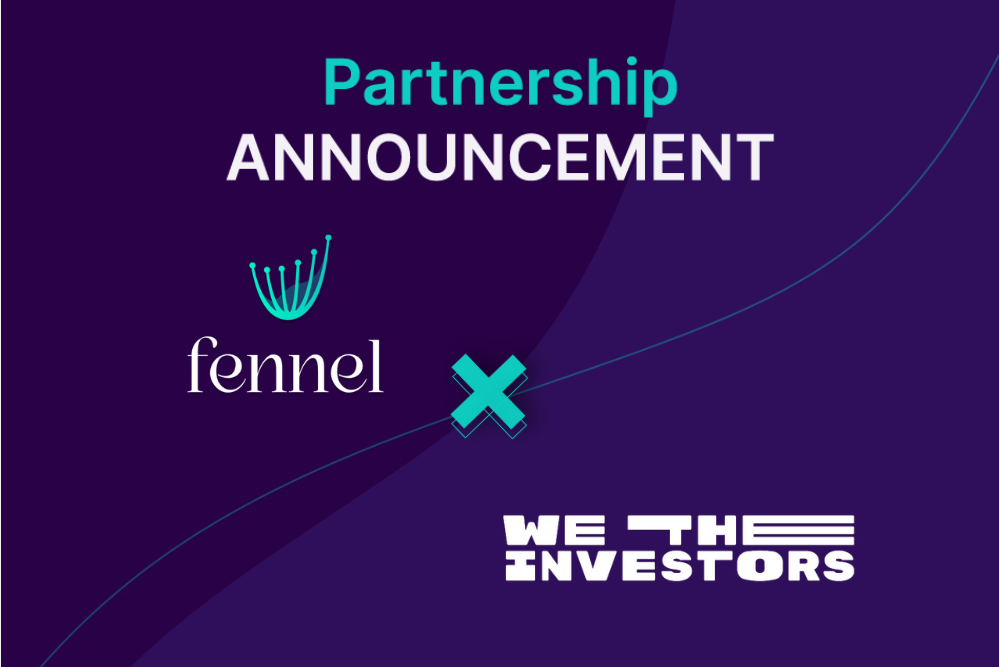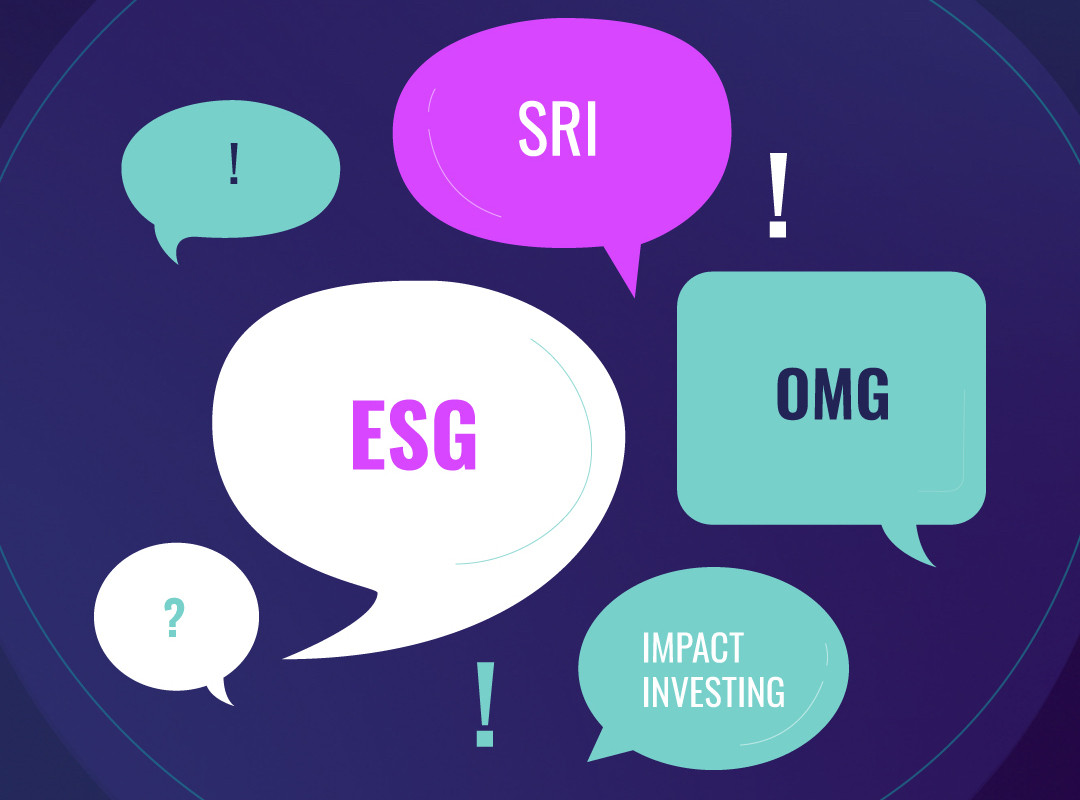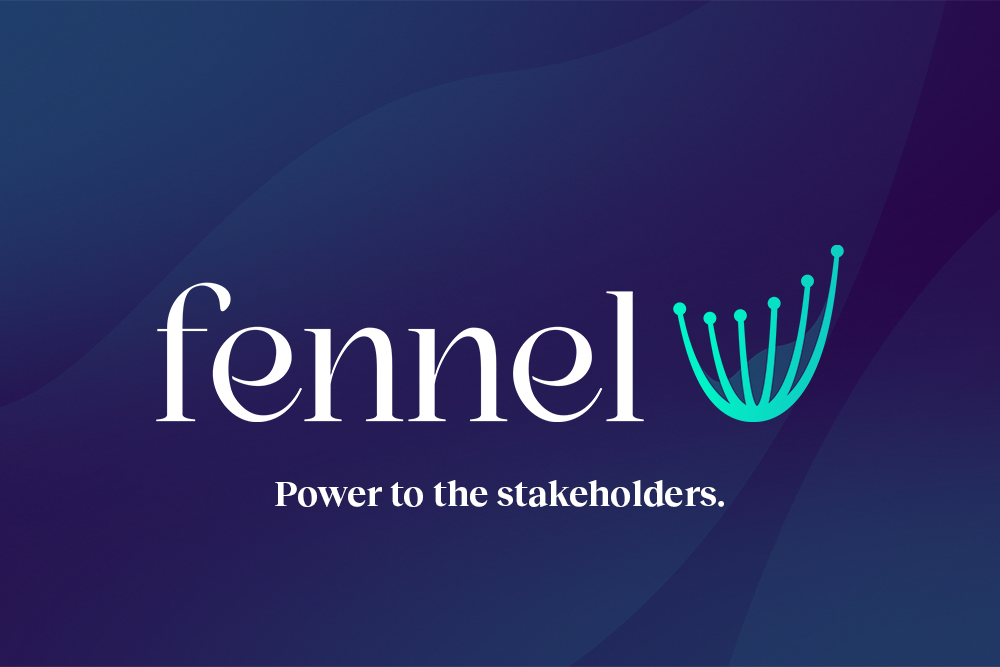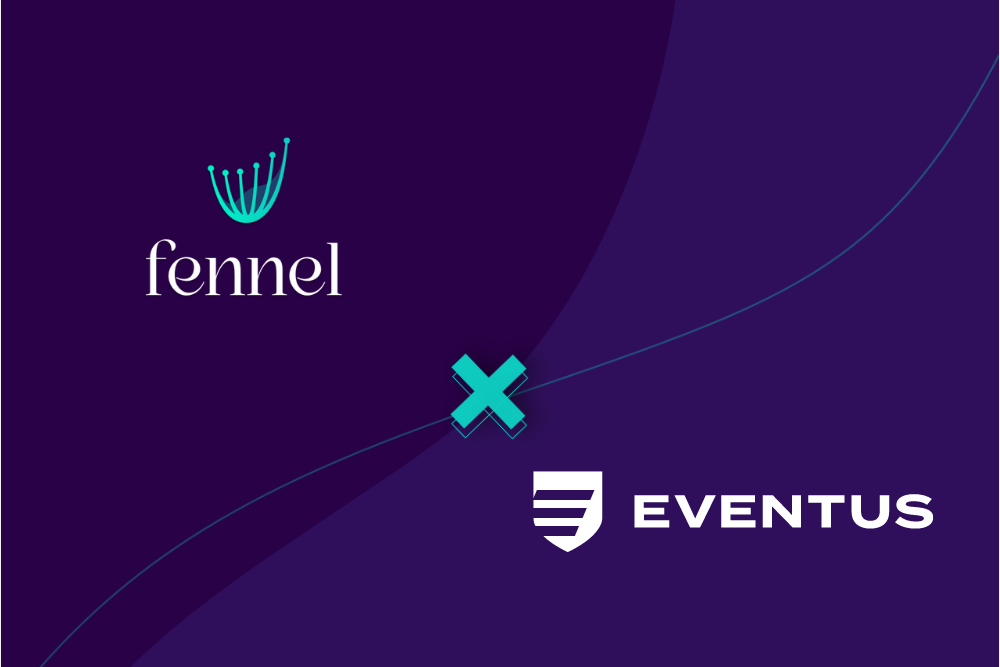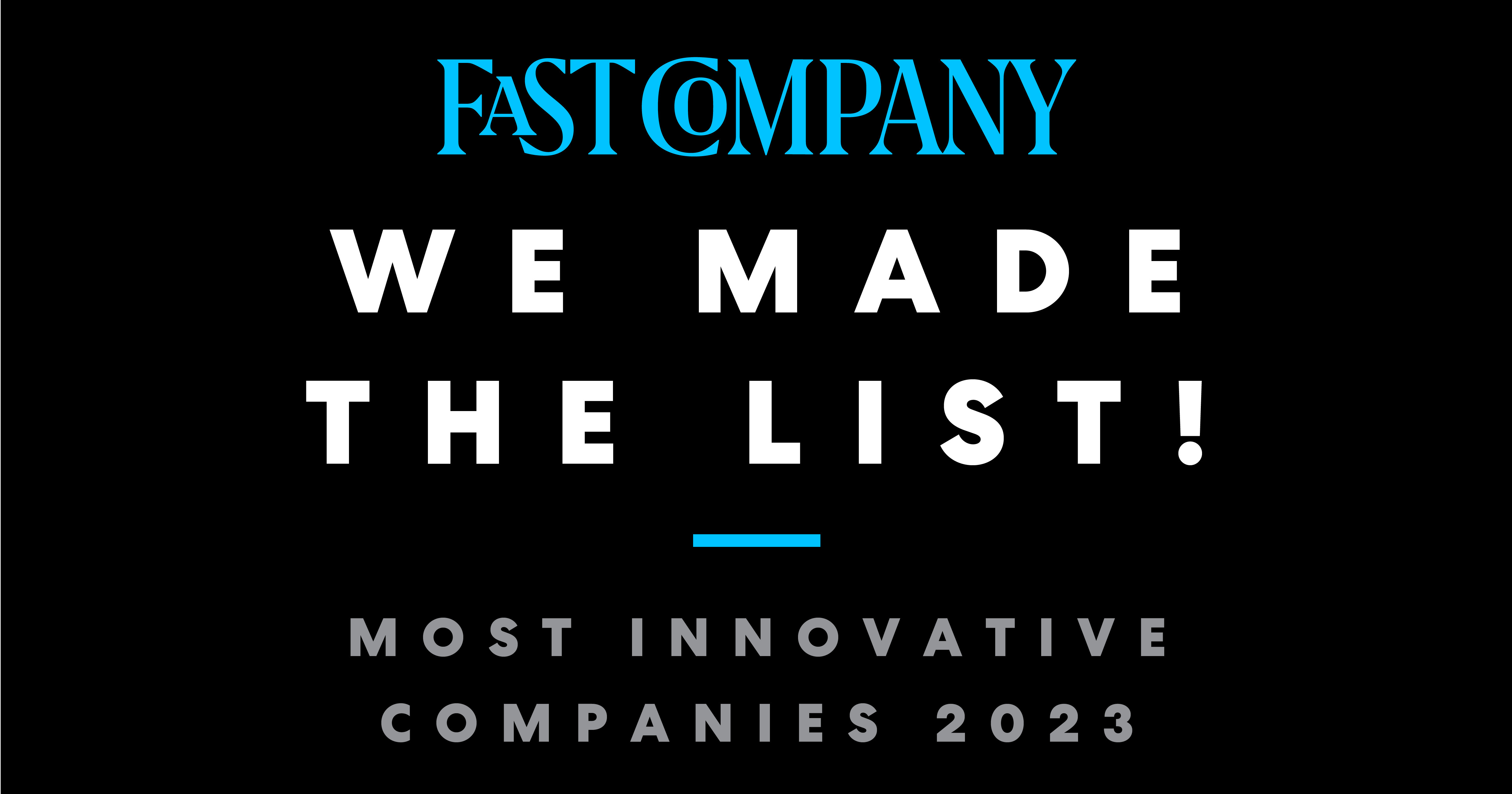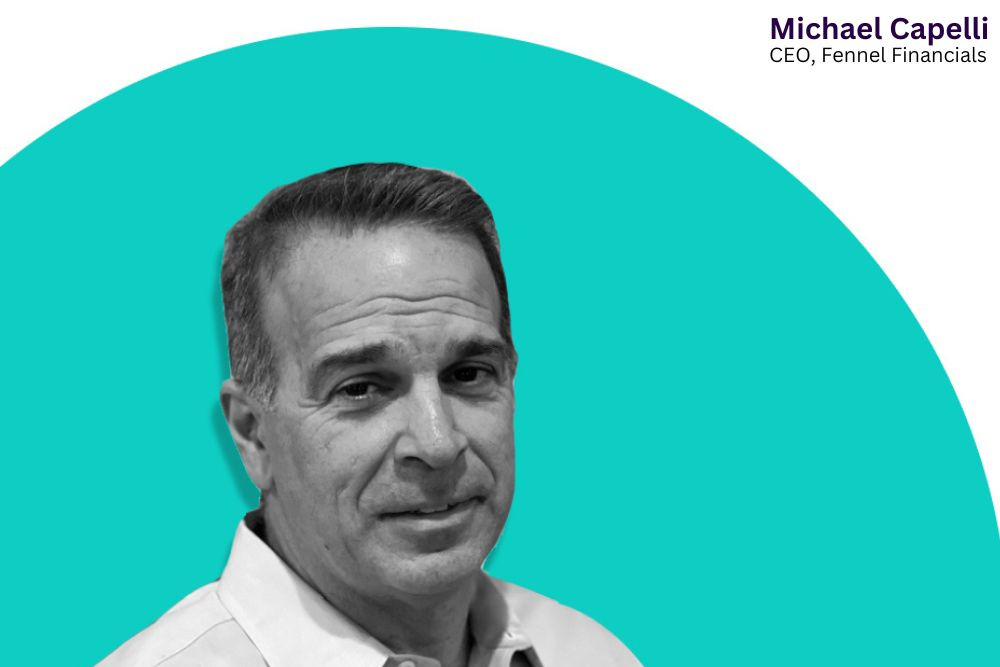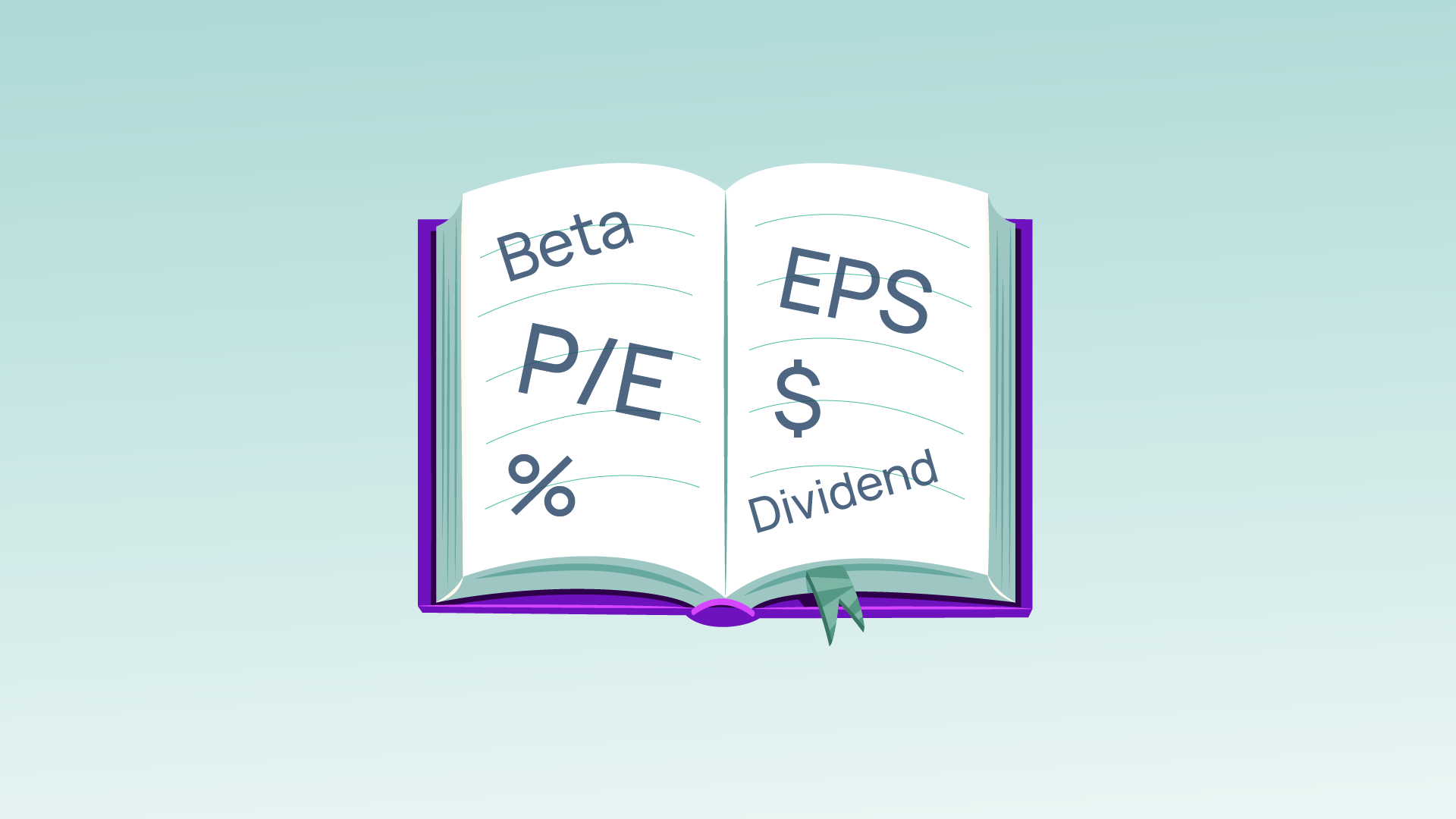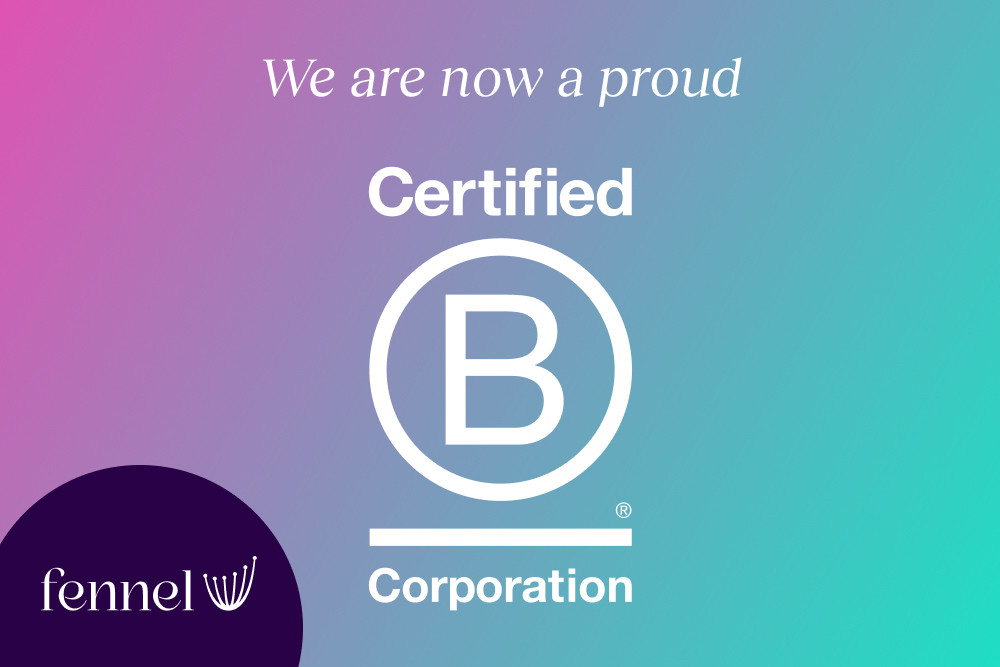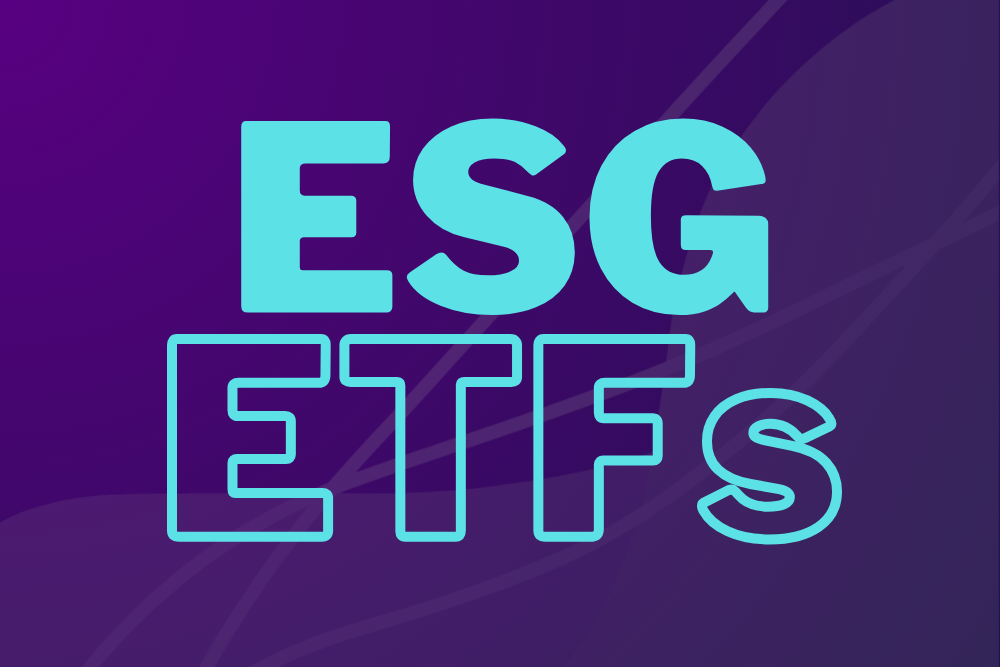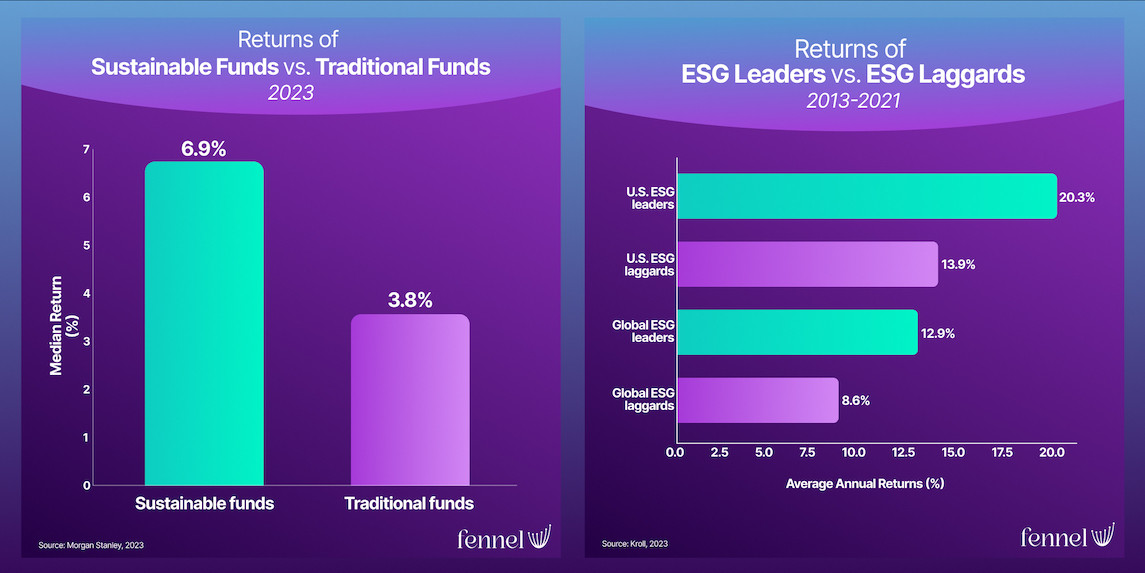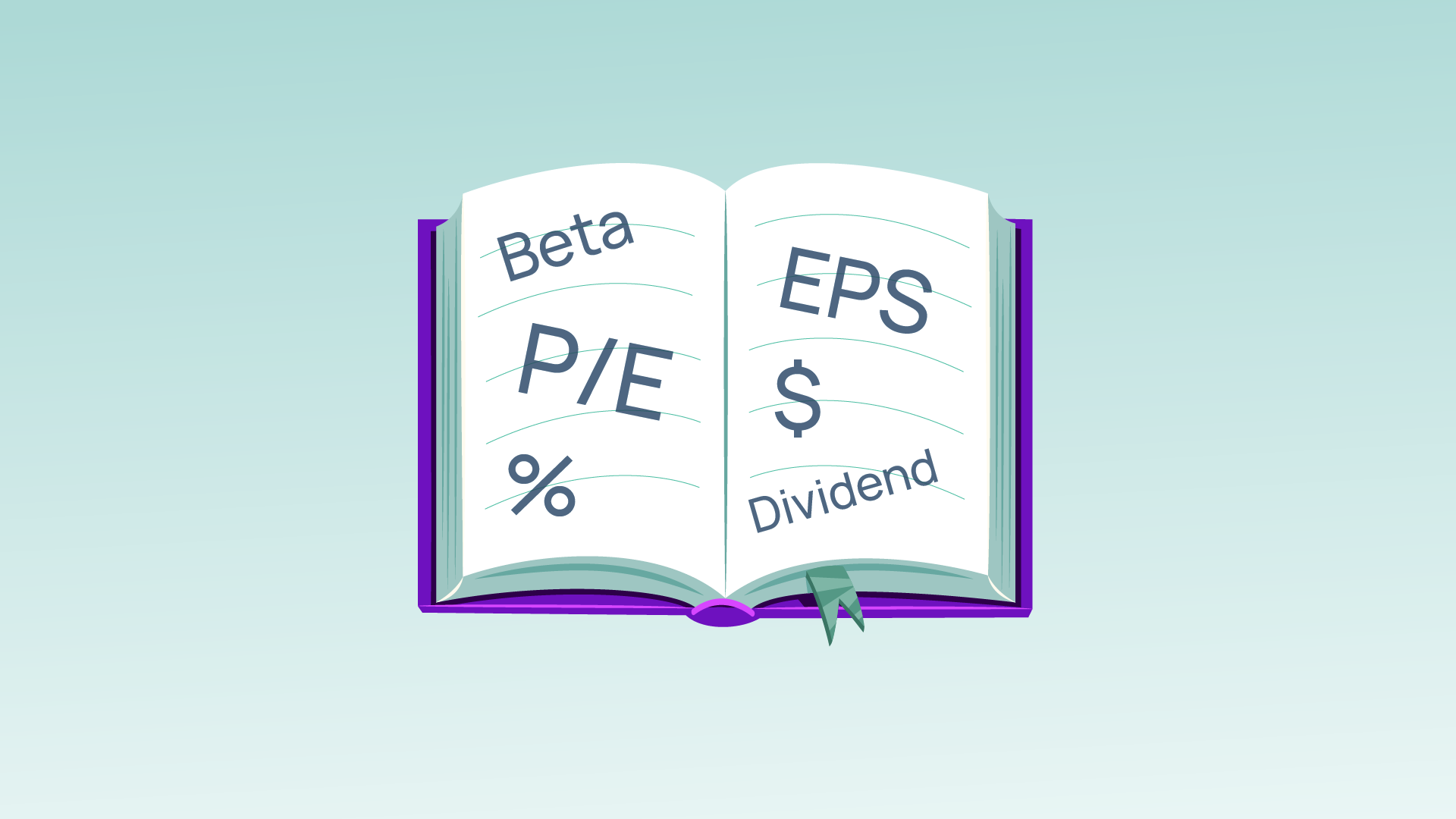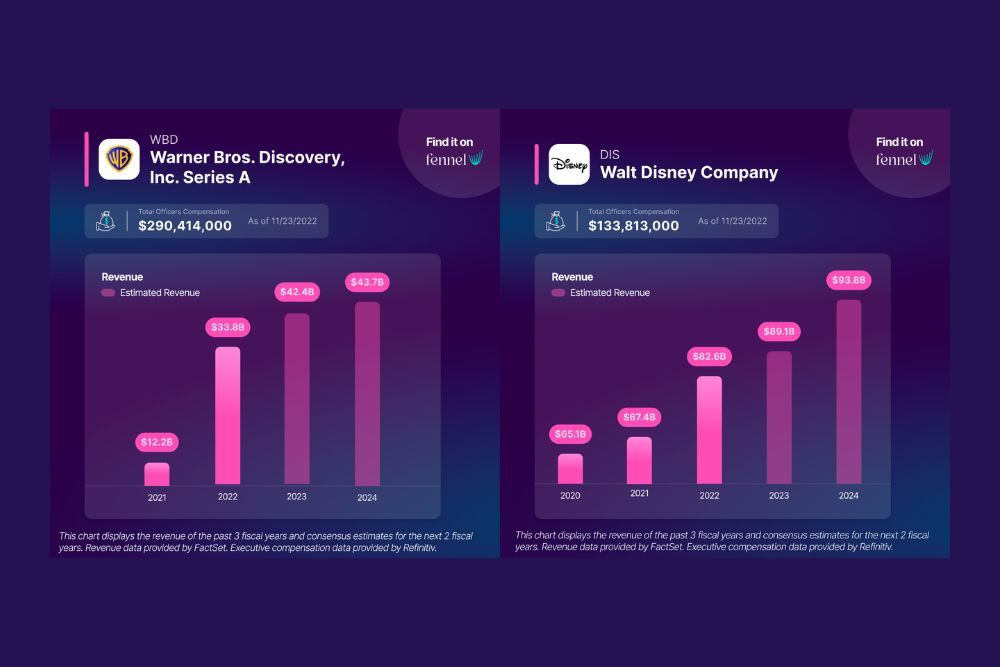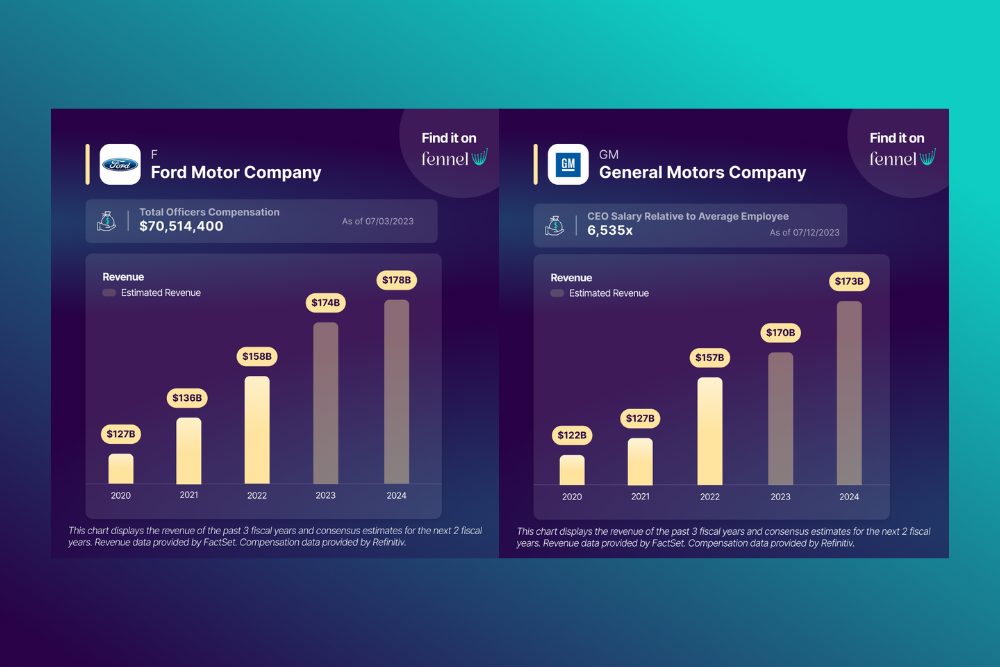<p id="8bd7" class="pw-post-body-paragraph kl km ja kn b ko kp kq kr ks kt ku kv kw kx ky kz la lb lc ld le lf lg lh li it gc" data-selectable-paragraph="">A year ago, we started building an investing app to bring power back to the stakeholders.</p>
<p id="a436" class="pw-post-body-paragraph kl km ja kn b ko kp kq kr ks kt ku kv kw kx ky kz la lb lc ld le lf lg lh li it gc" data-selectable-paragraph="">Back then, we were just a handful of people — activists, engineers, grad students, and retail investors — who felt jaded by the system. We felt like we were being used by other investing platforms. When multiple platforms <a class="au lj" href="https://www.theverge.com/2021/2/1/22254656/robinhood-gamestop-stonks-trade-freeze-class-action-lawsuits" target="_blank" rel="noopener ugc nofollow">paused trades during the GameStop saga</a>, it seemed like the system was rigged. When we learned that companies were profiting off <a class="au lj" href="https://www.protocol.com/fintech/payment-for-order-flow-explained" target="_blank" rel="noopener ugc nofollow">payment for order flow</a> and securities lending, it seemed like we were being bought and sold. We wanted an investing platform where the cards weren’t stacked against us.</p>
<p id="64ed" class="pw-post-body-paragraph kl km ja kn b ko kp kq kr ks kt ku kv kw kx ky kz la lb lc ld le lf lg lh li it gc" data-selectable-paragraph="">So, we built our own.</p>
<p id="bb58" class="pw-post-body-paragraph kl km ja kn b ko kp kq kr ks kt ku kv kw kx ky kz la lb lc ld le lf lg lh li it gc" data-selectable-paragraph="">We designed an investing app that we’d actually want to use. One where you can invest in stocks and ETFs, know more about a company’s impact on the world, and have a say in the companies you invest in.</p>
<p id="5d8f" class="pw-post-body-paragraph kl km ja kn b ko kp kq kr ks kt ku kv kw kx ky kz la lb lc ld le lf lg lh li it gc" data-selectable-paragraph="">We wanted to discover companies that care about the same things that we do — whether that’s a diverse workforce, renewable energy usage, or human rights protections — and, from there, decide whether or not to invest in them. So we integrated Environmental, Social, and Governance (ESG) tools to help people understand a company’s impact and its corporate structure.</p>
<p id="de3b" class="pw-post-body-paragraph kl km ja kn b ko kp kq kr ks kt ku kv kw kx ky kz la lb lc ld le lf lg lh li it gc" data-selectable-paragraph="">On top of that, we wanted to highlight shareholder voting as a direct line for retail investors to lobby for meaningful change in companies. So we built a platform that shines a light on past and upcoming shareholder votes.</p>
<p id="a74f" class="pw-post-body-paragraph kl km ja kn b ko kp kq kr ks kt ku kv kw kx ky kz la lb lc ld le lf lg lh li it gc" data-selectable-paragraph="">This way, <em class="lk">we</em>, as shareholders, can advocate for everyone who has a stake in the game — from workers, to investors, to the rest of our global community.</p>
<h4 class="pw-post-body-paragraph kl km ja kn b ko kp kq kr ks kt ku kv kw kx ky kz la lb lc ld le lf lg lh li it gc">What's at stake</h4>
<p id="95c6" class="pw-post-body-paragraph kl km ja kn b ko mg kq kr ks mh ku kv kw mi ky kz la mj lc ld le mk lg lh li it gc" data-selectable-paragraph="">Companies often take shortcuts in order to maximize profits. There are many examples of large companies that have built their supply chain on <a class="au lj" href="https://www.nytimes.com/2019/12/16/business/fashion-nova-underpaid-workers.html" target="_blank" rel="noopener ugc nofollow">unethical working conditions</a>, dumped <a class="au lj" href="https://www.newyorker.com/news/news-desk/a-whistle-blower-accuses-the-kochs-of-poisoning-an-arkansas-town" target="_blank" rel="noopener ugc nofollow">toxic chemicals into the environment</a>, or knowingly <a class="au lj" href="https://www.npr.org/2014/03/31/297312252/the-long-road-to-gms-ignition-switch-recall" target="_blank" rel="noopener ugc nofollow">sold dangerous products</a>. They may not do these things explicitly to hurt people — but people end up hurt.</p>
<p id="2c24" class="pw-post-body-paragraph kl km ja kn b ko kp kq kr ks kt ku kv kw kx ky kz la lb lc ld le lf lg lh li it gc" data-selectable-paragraph="">The government can intervene through laws to hold companies accountable for these actions. But regulation is a slow process and often happens after the damage is already done. We need additional ways to hold companies accountable — that’s where shareholder voting comes in.</p>
<p id="513f" class="pw-post-body-paragraph kl km ja kn b ko kp kq kr ks kt ku kv kw kx ky kz la lb lc ld le lf lg lh li it gc" data-selectable-paragraph="">Shareholder voting enables us to raise concerns to company leadership and engage them in conversations about what matters to us.</p>
<p id="0139" class="pw-post-body-paragraph kl km ja kn b ko kp kq kr ks kt ku kv kw kx ky kz la lb lc ld le lf lg lh li it gc" data-selectable-paragraph="">Owning shares of a publicly traded company can allow you to vote on important company decisions during annual shareholder meetings. These votes help companies determine things like board appointments and internal audits. But they can also help companies make decisions that directly affect us.</p>
<p id="7030" class="pw-post-body-paragraph kl km ja kn b ko kp kq kr ks kt ku kv kw kx ky kz la lb lc ld le lf lg lh li it gc" data-selectable-paragraph="">For example, shareholders can vote on whether a company should:</p>
<ul class="">
<li id="c378" class="ml mm ja kn b ko kp ks kt kw mn la mo le mp li mq mr ms mt gc" data-selectable-paragraph=""><a class="au lj" href="https://www.sec.gov/Archives/edgar/data/789019/000119312521298757/d189481ddef14a.htm#toc189481_35" target="_blank" rel="noopener ugc nofollow">Report on gender and racial pay gaps</a></li>
<li id="95d5" class="ml mm ja kn b ko mu ks mv kw mw la mx le my li mq mr ms mt gc" data-selectable-paragraph=""><a class="au lj" href="https://www.sec.gov/Archives/edgar/data/1754301/000119312521276133/d181730ddef14a.htm#rom181730_41" target="_blank" rel="noopener ugc nofollow">Disclose money spent on political lobbying</a></li>
<li id="47f9" class="ml mm ja kn b ko mu ks mv kw mw la mx le my li mq mr ms mt gc" data-selectable-paragraph=""><a class="au lj" href="https://www.sec.gov/Archives/edgar/data/1467858/000119312521143594/d22375ddef14a.htm#rom22375_40" target="_blank" rel="noopener ugc nofollow">Tie executive compensation to greenhouse gas reduction</a></li>
<li id="4bc5" class="ml mm ja kn b ko mu ks mv kw mw la mx le my li mq mr ms mt gc" data-selectable-paragraph=""><a class="au lj" href="https://www.sec.gov/Archives/edgar/data/1652044/000130817921000256/lgoog2021_def14a.htm#lgooga056" target="_blank" rel="noopener ugc nofollow">Add civil rights leaders to the board of directors</a></li>
<li id="992d" class="ml mm ja kn b ko mu ks mv kw mw la mx le my li mq mr ms mt gc" data-selectable-paragraph=""><a class="au lj" href="https://www.sec.gov/Archives/edgar/data/1166691/000120677421001222/cmcsa3829211-def14a.htm#d382921a021" target="_blank" rel="noopener ugc nofollow">Report failed sexual harassment interventions</a></li>
<li id="09d1" class="ml mm ja kn b ko mu ks mv kw mw la mx le my li mq mr ms mt gc" data-selectable-paragraph=""><a class="au lj" href="https://www.sec.gov/Archives/edgar/data/1326801/000132680121000022/facebook2021definitiveprox.htm#ic3434e614c6d4661abc9f5e608f438ab_58" target="_blank" rel="noopener ugc nofollow">Hold itself accountable for online child exploitation</a></li>
<li id="d54d" class="ml mm ja kn b ko mu ks mv kw mw la mx le my li mq mr ms mt gc" data-selectable-paragraph=""><a class="au lj" href="https://www.sec.gov/Archives/edgar/data/1090727/000120677421000883/ups3861781-def14a.htm#d386178a053" target="_blank" rel="noopener ugc nofollow">Report on steps taken to reduce its carbon footprint</a></li>
</ul>
<p id="7bc2" class="pw-post-body-paragraph kl km ja kn b ko kp kq kr ks kt ku kv kw kx ky kz la lb lc ld le lf lg lh li it gc" data-selectable-paragraph="">If these examples seem specific, it’s because they are all actual proposals that were voted on in shareholder meetings last year — and not one of them passed.</p>
<p id="6e6f" class="pw-post-body-paragraph kl km ja kn b ko kp kq kr ks kt ku kv kw kx ky kz la lb lc ld le lf lg lh li it gc" data-selectable-paragraph="">So what gives? Don’t people care about reducing carbon emissions and promoting social equity? Of course they do. But whether or not they actually vote on these proposals is another story.</p>
<p id="aa5a" class="pw-post-body-paragraph kl km ja kn b ko kp kq kr ks kt ku kv kw kx ky kz la lb lc ld le lf lg lh li it gc" data-selectable-paragraph=""><a class="au lj" href="https://www.broadridge.com/_assets/pdf/broadridge-proxypulse-2020-review.pdf" target="_blank" rel="noopener ugc nofollow">One report</a> found that only 28% of shares held by retail investors were used to vote in 2020. Meanwhile, 92% of shares held by institutional investors were used to vote that year. This means, it’s the hedge funds, mutual funds, large banks, and financial institutions voting on these issues — not everyday people.</p>
<p id="e4ff" class="pw-post-body-paragraph kl km ja kn b ko kp kq kr ks kt ku kv kw kx ky kz la lb lc ld le lf lg lh li it gc" data-selectable-paragraph="">Our goal is to make it easier for more people like you and me to vote on these issues. We believe, if more people are engaging with the companies they invest in, those companies will be incentivized to act, or face backlash from their stakeholders.</p>
<p id="d721" class="pw-post-body-paragraph kl km ja kn b ko kp kq kr ks kt ku kv kw kx ky kz la lb lc ld le lf lg lh li it gc" data-selectable-paragraph="">That’s just the beginning. We think that this process can have a ripple effect on the ways companies address things like climate change and human rights. It’s up to all of us to hold these companies accountable.</p>
<p id="ec07" class="pw-post-body-paragraph kl km ja kn b ko kp kq kr ks kt ku kv kw kx ky kz la lb lc ld le lf lg lh li it gc" data-selectable-paragraph="">The engaged shareholder movement is here. Will you be a part of it?</p>
Hi, We're Fennel
A year ago, we started building an investing app to bring power back to the stakeholders.
<p><span style="font-weight: 400;">20 months ago I had a simple idea: What if capital markets could change?</span></p>
<p><span style="font-weight: 400;">What if capitalism (the same system that has driven us towards infinite growth at the cost of environmental devastation, wealth inequality, exploitation of workers, marginalization of people, and a sense of deriving one’s very purpose by the value of their productivity) could be used to solve the same problems it’s created?</span></p>
<p><span style="font-weight: 400;">But I had my doubts. Maybe I was just being naive.</span></p>
<p><span style="font-weight: 400;">It was September 2020. At the time, I was living in the Bay Area. The fires in California were so bad that I couldn’t see the sun through all the smoke. I was getting my PhD in physics, trying to find dark matter with 200 of the smartest people I’ve ever met. We were trying to solve one of the universe’s biggest mysteries — but something didn’t feel right. The world around us seemed to be disintegrating. Maybe I was just getting older and my eyes were starting to focus on the reality of the world I was living in. Was discovering dark matter really the problem I wanted to spend my time on? It couldn’t be. It felt so far away. There were more pressing issues that filled me with a sense of dread, like those thick gray clouds casting gloomy shadows on what should’ve been a sunny, late summer day.</span></p>
<p><span style="font-weight: 400;">Then something interesting happened. The Governor of California announced that the state would </span><a href="https://www.cnn.com/2020/10/03/cars/california-2035-zev-mandate/index.html"><span style="font-weight: 400;">end the sale of all gas-powered cars by 2035</span></a><span style="font-weight: 400;">. Then, New Jersey </span><a href="https://www.nj.com/news/2020/10/only-electric-cars-sold-by-2035-heres-how-nj-gets-there.html"><span style="font-weight: 400;">announced</span></a><span style="font-weight: 400;"> that it too would end the sale of gas-powered cars. And then </span><a href="https://www.caranddriver.com/news/a35104768/massachusetts-ban-new-gas-cars-2035/"><span style="font-weight: 400;">Massachusetts</span></a><span style="font-weight: 400;"> made a similar pledge. It seemed like </span><a href="https://www.reuters.com/article/us-climate-change-eu-transport/eu-to-target-30-million-electric-cars-by-2030-draft-idUSKBN28E2KM"><span style="font-weight: 400;">other countries</span></a><span style="font-weight: 400;"> were aiming for the same goal too. Even China </span><a href="https://www.spglobal.com/marketintelligence/en/news-insights/latest-news-headlines/china-aims-for-evs-to-account-for-50-of-all-car-sales-by-2035-60954964"><span style="font-weight: 400;">pledged</span></a><span style="font-weight: 400;"> to make electric vehicles account for 50% of all new car sales by 2035. Politicians across the world came together, and pledged to reach a seemingly impossible goal.</span></p>
<p><span style="font-weight: 400;">I asked myself, “Why now?”</span></p>
<p><span style="font-weight: 400;">Then, not long after, </span><a href="https://electrek.co/2021/02/04/ford-doubles-electric-vehicle-investment-22-billion-through-2025/"><span style="font-weight: 400;">Ford</span></a><span style="font-weight: 400;"> and </span><a href="https://www.cnbc.com/2020/11/19/gm-accelerating-ev-plans-with-additional-7-billion-announces-new-pickup.html"><span style="font-weight: 400;">GM</span></a><span style="font-weight: 400;"> both announced that they were doubling down in the EV space. It clicked. When Tesla’s valuation had skyrocketed, it sent a message to the rest of the world that something was changing. A new generation of investors didn’t care if Tesla’s business was profitable or not, they just knew that a world without EVs wouldn’t exist in 25 years. It was that simple. The concept of “value” was changing for the younger generation. What a company did for the planet mattered more than the profit it made. I thought, “Wow, wouldn’t it be great to live in a world where every companies’ mission was aligned with the values of their investors?” I wondered how we could get there.</span></p>
<p><span style="font-weight: 400;">I still had my doubts. Money was at the heart of this movement (these were for-profit businesses, after all). How could that be sustainable?</span></p>
<p><span style="font-weight: 400;">But something else happened around the same time. Investment firm Engine No. 1 </span><a href="https://www.reuters.com/article/exxon-shareholders-engine-no-1/exxon-faces-proxy-fight-launched-by-new-activist-firm-engine-no-1-idUSKBN28H1IO"><span style="font-weight: 400;">launched a bid</span></a><span style="font-weight: 400;"> to take over 4 of the 12 board seats within Exxon Mobil, with the sole intent of reducing the company’s carbon emissions. </span><a href="https://www.nytimes.com/2021/06/09/business/exxon-mobil-engine-no1-activist.html"><span style="font-weight: 400;">They succeeded</span></a><span style="font-weight: 400;">. How did they succeed? The boardroom challenge caught the attention of BlackRock, Vanguard, and State Street — some of the most powerful asset managers in the world — who all voted in favor of Engine No. 1’s board members during the Exxon meeting. These giant funds understood that there was an environmental </span><em><span style="font-weight: 400;">and</span></em><span style="font-weight: 400;"> economic risk for the continued neglect of unmonitored carbon emissions.</span></p>
<p><span style="font-weight: 400;">I went to </span><a href="https://www.proxymonitor.org/"><span style="font-weight: 400;">Proxy Monitor</span></a><span style="font-weight: 400;">, a site dedicated to tracking shareholder votes, to see all of the votes taking place besides the Exxon Mobil one. What I saw shocked me. I saw shareholders voting on things like whether </span><a href="https://www.sec.gov/Archives/edgar/data/789019/000119312521298757/d189481ddef14a.htm#toc189481_35"><span style="font-weight: 400;">Microsoft should report on its gender pay gap disparity</span></a><span style="font-weight: 400;"> or whether </span><a href="https://www.sec.gov/Archives/edgar/data/1326801/000132680121000022/facebook2021definitiveprox.htm#ic3434e614c6d4661abc9f5e608f438ab_58"><span style="font-weight: 400;">Facebook should report on the sexual exploitation of children on its platform</span></a><span style="font-weight: 400;">. These were big issues that impacted real people, but the proposals weren’t getting enough votes to pass.</span></p>
<p><span style="font-weight: 400;">Would these proposals only succeed if an activist group like Engine No. 1 was backing them? What would it take to get the big institutional firms like BlackRock and Vanguard to show support again?</span></p>
<p><span style="font-weight: 400;">I was beginning to lose hope that this would happen, that is, until a movement started among retail investors (the everyday people buying stocks as an investment in their financial future). Retail investors began entering the stock market in droves throughout 2020 for a variety of reasons, which seemed to reach a climax during </span><a href="https://www.youtube.com/watch?v=p3xj0EJ8fxk"><span style="font-weight: 400;">the GameStop short squeeze</span></a><span style="font-weight: 400;"> in early 2021. Not only were average people getting involved in capital markets like never before, these same retail investors were beginning to wise up to the system that was built around them. In the aftermath of the initial GameStop squeeze, retail investors began learning about things like payment for order flow and securities lending. They were paying attention to how hedge funds and market makers were processing their transactions. Their scrutiny even helped push these issues </span><a href="https://www.cnn.com/business/live-news/robinhood-gamestop-reddit-hearing-congress/index.html"><span style="font-weight: 400;">to the floor of congress</span></a><span style="font-weight: 400;">.</span></p>
<p><span style="font-weight: 400;">This group of retail investors — millions of people who are just like you and me — could be the ones who help push large corporations towards meaningful change. After all, it was our lives that were impacted by the decisions of these companies.</span></p>
<p><span style="font-weight: 400;">But this was just the tip of the iceberg. The more retail investors found out about the system, the more they were motivated to reform it. I was right there too. After starting my personal investing journey a few years ago, I went deeper down the rabbit hole in 2020, and even further in 2021. Eventually, I learned that my shares — and the shares of other retail investors too — could be lent out without me knowing. That’s because brokerage firms </span><a href="https://www.sonnlaw.com/faq/can-my-broker-lend-my-shares/"><span style="font-weight: 400;">are able to lend out the shares</span></a><span style="font-weight: 400;"> that their retail investors buy, if that investor signed up for a margin account and agreed to </span><a href="https://www.sec.gov/news/public-statement/staff-fully-paid-lending"><span style="font-weight: 400;">“fully-paid securities lending”</span></a><span style="font-weight: 400;"> in the terms and conditions.</span></p>
<p><span style="font-weight: 400;">This throws a major wrench in the retail investing movement, because if retail investors’ shares are lent out, they lose the ability to vote with those shares. Without the ability to vote, retail investors can’t be the voting bloc that pushes companies towards meaningful change during shareholder meetings.</span></p>
<p><span style="font-weight: 400;">I knew something had to be done. Retail investors had to band together and use the system in order to change it. It was time to create something for this world that could allow people to truly help it.</span></p>
<p><span style="font-weight: 400;">That’s what led to </span><a href="https://www.fennel.com/"><span style="font-weight: 400;">Fennel</span></a><span style="font-weight: 400;">.</span></p>
<p><span style="font-weight: 400;">Just like when I was researching dark matter, I surrounded myself with a team of intelligent people in order to tackle this mission. This time, it was a group of tech developers, financial professionals, and retail investors who felt motivated to make an impact as much as I did.</span></p>
<p><span style="font-weight: 400;">Together, we aimed to build a brokerage that had the interests of retail investors in mind. But more than that, we wanted to build a platform where people could come together and stand up for what they believe in. A place to fight for the planet, for our communities, and for the very society we all worked to build up. I hope that this platform motivates more people who align with our vision.</span></p>
<p><span style="font-weight: 400;">Join us and be part of this growing community. We hope to grow so big that our voices can no longer be ignored. Until every company truly understands the wishes of those who support them, Fennel will be there to fight alongside you.</span></p>
<p><span style="font-weight: 400;">Thank you to all of those who have joined me in this journey so far, and to all of you who have worked hard to make something truly special.</span></p>
<p> </p>
<p><span style="font-weight: 400;">See you all soon.</span></p>
<p> </p>
<p><span style="font-weight: 400;">Daniel Naim</span></p>
A Note From Our Founder
20 months ago I had a simple idea: What if capital markets could change?
<p id="a86c" class="pw-post-body-paragraph kk kl iz km b kn ko kp kq kr ks kt ku kv kw kx ky kz la lb lc ld le lf lg lh is gb" data-selectable-paragraph="">The name “Fennel” is inspired by <a class="au li" href="https://www.worldhistory.org/Prometheus/" target="_blank" rel="noopener ugc nofollow">the ancient Greek myth of Prometheus</a>. In Greek mythology, Prometheus was one of the titans — a race of giant deities that predated the Olympian gods. When Zeus and the other Olympians fought to overthrow the primordial titans, Prometheus (whose name means “forethought”), knew that Zeus would win the war with the titans, and sided with the Olympians.</p>
<p id="9f6a" class="pw-post-body-paragraph kk kl iz km b kn ko kp kq kr ks kt ku kv kw kx ky kz la lb lc ld le lf lg lh is gb" data-selectable-paragraph="">After fighting for 10 years, the Olympian gods did win the war, and they banished most of the titans to the depths of the underworld. However, Prometheus and his brother Epimetheus were spared. Zeus, with his newfound power, tasked Prometheus and Epimetheus with the creation of life on earth. Together the brothers created all forms of animal life, and gave each animal a unique gift. Birds were given the gift of flight. Fish were given the ability to swim. Some animals were given size and strength, others were given sharp teeth and claws.</p>
<p id="ba01" class="pw-post-body-paragraph kk kl iz km b kn ko kp kq kr ks kt ku kv kw kx ky kz la lb lc ld le lf lg lh is gb" data-selectable-paragraph="">But when it was time to give humans their gift, Prometheus wanted them to have something special. Prometheus had handcrafted the humans out of clay, and was very fond of them. So fond that he wanted to give humans the most powerful gift he could think of — the ability to wield fire.</p>
<p id="3b03" class="pw-post-body-paragraph kk kl iz km b kn ko kp kq kr ks kt ku kv kw kx ky kz la lb lc ld le lf lg lh is gb" data-selectable-paragraph="">Prometheus snuck into the workshop of gods Hephaistos and Athena and stole their sacred fire. Prometheus then hid the flame in a hollow stalk of Fennel, and smuggled it down from Mt. Olympus to the humans on earth.</p>
<p id="22a5" class="pw-post-body-paragraph kk kl iz km b kn ko kp kq kr ks kt ku kv kw kx ky kz la lb lc ld le lf lg lh is gb" data-selectable-paragraph="">The gift of fire was a boon to humankind. With fire, they were able to keep warm, cook their food, and forge metal weapons and tools. The gift of fire set humans apart from other animals by allowing them to harness the power of the natural world and create societies.</p>
<p id="1117" class="pw-post-body-paragraph kk kl iz km b kn ko kp kq kr ks kt ku kv kw kx ky kz la lb lc ld le lf lg lh is gb" data-selectable-paragraph="">That fire represented the birth of technology, and with it they were able to build civilizations.</p>
<p id="5062" class="pw-post-body-paragraph kk kl iz km b kn ko kp kq kr ks kt ku kv kw kx ky kz la lb lc ld le lf lg lh is gb" data-selectable-paragraph="">However, the gods weren’t happy when they found out about this. Zeus punished Prometheus by chaining him to a boulder, and sending an eagle to peck out his liver. Every day the eagle would feed on Prometheus’ liver, and every night it would grow back. Since Prometheus was immortal, Zeus left him to suffer this punishment for eternity.</p>
<p id="7cae" class="pw-post-body-paragraph kk kl iz km b kn ko kp kq kr ks kt ku kv kw kx ky kz la lb lc ld le lf lg lh is gb" data-selectable-paragraph="">Although Prometheus had to endure this perpetual torment from the gods, he was seen as a hero by the humans, and a martyr for his sacrifice.</p>
<p id="3abc" class="pw-post-body-paragraph kk kl iz km b kn ko kp kq kr ks kt ku kv kw kx ky kz la lb lc ld le lf lg lh is gb" data-selectable-paragraph="">We <a class="au li" href="https://fennel.com/" target="_blank" rel="noopener ugc nofollow">named our company Fennel</a> after the fennel that Prometheus used to smuggle fire. While fire was the central focus of the story, it was fennel that functioned as a vessel for the fire. One hollow stalk of fennel contained the flame that enabled humans to build the world we know today. Without it, humans would still be in the dark.</p>
<p id="a761" class="pw-post-body-paragraph kk kl iz km b kn ko kp kq kr ks kt ku kv kw kx ky kz la lb lc ld le lf lg lh is gb" data-selectable-paragraph="">In the myth, fire was a tool that could have benefited the masses, but access to it was limited to the powerful. This serves as an important metaphor for us. There are many different “fires” in our world today — things like education, natural resources, technology, and wealth.</p>
<p id="11e2" class="pw-post-body-paragraph kk kl iz km b kn ko kp kq kr ks kt ku kv kw kx ky kz la lb lc ld le lf lg lh is gb" data-selectable-paragraph="">In Fennel’s case, we believe that the power of capital markets is one of those fires. Environmental, Social, and Governance (ESG) data, financial tools, and shareholder voting are all things that could be used for the greater good if they were made more accessible to everyone.</p>
<p id="0831" class="pw-post-body-paragraph kk kl iz km b kn ko kp kq kr ks kt ku kv kw kx ky kz la lb lc ld le lf lg lh is gb" data-selectable-paragraph="">So how do you make these things more accessible? With a hollow stalk of fennel, of course. We built Fennel to make it easier to use these resources. But our platform is just one piece of technology providing access to a handful of things. There are plenty of other fires out there being guarded, and many stalks of fennel that need to be carried.</p>
<p id="28d6" class="pw-post-body-paragraph kk kl iz km b kn ko kp kq kr ks kt ku kv kw kx ky kz la lb lc ld le lf lg lh is gb" data-selectable-paragraph="">What’s important is to keep Prometheus’ mission alive. To capture the proverbial fire and give it as a gift to all of humanity — so everyone can use it.</p>
<p id="e6bc" class="pw-post-body-paragraph kk kl iz km b kn ko kp kq kr ks kt ku kv kw kx ky kz la lb lc ld le lf lg lh is gb" data-selectable-paragraph="">Because once the fire is in your control, what to do with that power is up to you.</p>
Where Does the Name Fennel Come From?
The name "Fennel" is inspired by the ancient Greek myth of Prometheus.
<div class="is it iu iv iw">
<p id="dac6" class="pw-post-body-paragraph kk kl iz km b kn ko kp kq kr ks kt ku kv kw kx ky kz la lb lc ld le lf lg lh is gb" data-selectable-paragraph="">Modern capitalism has ushered in the greatest era of innovation, globalization, and sheer economic output in human history. However, the incentive structure, which rewards short-term gains over long-term sustainability, has come at the expense of fair labor and fair trade practices, human rights, and our planet’s delicate ecosystems. Social scientists have long recognized these shortfalls inherent to our system, but all <em class="li">external</em> efforts — government intervention, a thriving philanthropic sector, protest movements, etc. — have not done enough to curb the destruction of this capitalist machine. Even <a class="au lj" href="https://money.cnn.com/2013/09/17/news/economy/occupy-wall-street-fizzled/" target="_blank" rel="noopener ugc nofollow">Occupy Wall Street</a>, the largest anti-capitalist protest movement in modern history, failed because our corporations are ultimately beholden to no other stakeholder than their own shareholders.</p>
<p id="a37f" class="pw-post-body-paragraph kk kl iz km b kn ko kp kq kr ks kt ku kv kw kx ky kz la lb lc ld le lf lg lh is gb" data-selectable-paragraph="">So if corporations are doing this on the behalf of their shareholders, maybe it’s up to the shareholders to help put an end to this. Shareholder activism is a channel to create impact by influencing company policy from <em class="li">within</em>. It can be a method for socially- and environmentally-conscious advocates to voice their concerns from the perspective of shareholders who want to increase the value of their ownership by promoting sustainability. As the conservationist David Brower liked to say, “There is no business to be done on a dead planet.”</p>
<p id="7c89" class="pw-post-body-paragraph kk kl iz km b kn ko kp kq kr ks kt ku kv kw kx ky kz la lb lc ld le lf lg lh is gb" data-selectable-paragraph="">Shareholder activists are bullish on <a class="au lj" href="https://www.sustain.ucla.edu/what-is-sustainability/" target="_blank" rel="noopener ugc nofollow">sustainability</a> because they realize the massive upside potential of infusing compassion into business practices: positive press, fewer boycotts, fewer fines, fewer lawsuits, fewer labor strikes, more productive employees, more consumer demand, and the benefits of increasingly-progressive legislation. Even Founder of BlackRock Larry Fink — a pro-market authority — praised shareholder activism in his <a class="au lj" href="https://www.blackrock.com/corporate/investor-relations/larry-fink-ceo-letter" target="_blank" rel="noopener ugc nofollow">2022 Letter to CEOs</a>. This letter, written from the perspective of the shareholders of Corporate America, did not attack capitalism but instead implored executives to reframe and repurpose capitalism to achieve a wider array of society’s ambitious goals. “Capitalism has the power to shape society and act as a powerful catalyst for change,” Fink wrote.</p>
<p id="441d" class="pw-post-body-paragraph kk kl iz km b kn ko kp kq kr ks kt ku kv kw kx ky kz la lb lc ld le lf lg lh is gb" data-selectable-paragraph="">Over the past few decades, there have been a handful of organizations that have formed in order to support sustainable action through the current capitalist system. Organizations like <a class="au lj" href="https://www.asyousow.org/" target="_blank" rel="noopener ugc nofollow">As You Sow</a>, <a class="au lj" href="https://www.greencentury.com/" target="_blank" rel="noopener ugc nofollow">Green Century Funds</a>, and <a class="au lj" href="https://impaxam.com/" target="_blank" rel="noopener ugc nofollow">Impax Asset Management</a> have used shareholder activism to put forward shareholder proposals that aim to push companies in the direction of environmental sustainability or social good.</p>
<p id="3e2e" class="pw-post-body-paragraph kk kl iz km b kn ko kp kq kr ks kt ku kv kw kx ky kz la lb lc ld le lf lg lh is gb" data-selectable-paragraph="">Why push for change through shareholder proposals? If you own stock in a company, you are entitled to vote your shares at annual shareholder meetings. Typically, shareholders vote on anything that might affect the stock price, such as the makeup of the Board of Directors, mergers & acquisitions, stock splits, and executive compensation. But many investors are also proposing measures that support ESG (Environmental, Social and Corporate Governance) initiatives, asserting <a class="au lj" href="https://online.hbs.edu/blog/post/what-is-the-triple-bottom-line#:~:text=The%20triple%20bottom%20line%20is,%3A%20profit%2C%20people%2C%20and%20the" target="_blank" rel="noopener ugc nofollow">triple bottom line</a> benefits to people, the planet, and profit. Institutional investors and activist hedge funds have leveraged shareholder activism to make great impact, such as <a class="au lj" href="https://engine1.com/" target="_blank" rel="noopener ugc nofollow">Engine №1</a> who were able to <a class="au lj" href="https://www.thedeal.com/activism/activist-investor-rankings-for-2021/" target="_blank" rel="noopener ugc nofollow">vote three environmental activists</a> onto the Board of Directors of Exxon Mobil in 2021.</p>
<p id="44d7" class="pw-post-body-paragraph kk kl iz km b kn ko kp kq kr ks kt ku kv kw kx ky kz la lb lc ld le lf lg lh is gb" data-selectable-paragraph="">Retail investors, too, can be a part of this movement. If you own stock in a publicly-traded company, you can participate in the shareholder voting process by looking up that company’s Definitive Proxy Statement, which is filed to the Securities Exchange Commission in the Schedule 14A. You may search for upcoming shareholder proposals and the proxy voting materials of your stocks through the SEC’s <a class="au lj" href="https://www.sec.gov/edgar/search/" target="_blank" rel="noopener ugc nofollow">EDGAR database</a>, which is free and open to the public.</p>
<p id="72ec" class="pw-post-body-paragraph kk kl iz km b kn ko kp kq kr ks kt ku kv kw kx ky kz la lb lc ld le lf lg lh is gb" data-selectable-paragraph="">Disruptive technology such as investing apps have democratized access to the stock market, increasing stock trading by retail investors from diverse socioeconomic backgrounds. Thus, it is exceedingly important for retail investors not to leave their power on the table but to exercise their rights as shareholders and vote at these meetings. <a class="au lj" href="https://www.proxymonitor.org/Default.aspx" target="_blank" rel="noopener ugc nofollow">ProxyMonitor.Org</a> has a watchlist of the upcoming votes of Fortune 250 companies and allows users to sort by social impact.</p>
<p id="8739" class="pw-post-body-paragraph kk kl iz km b kn ko kp kq kr ks kt ku kv kw kx ky kz la lb lc ld le lf lg lh is gb" data-selectable-paragraph="">It is famously theorized that capitalism has within it “the seeds of its own destruction.” Under a capitalist system, social classes are defined in their relation to their control over the means of production. But in the context of shareholder activism, democratized stock ownership and proxy voting allow for a more inclusive control over the means of production. Shareholder activism will allow more people to negotiate the value of corporate sustainability — a perspective that has been stifled in the past. This movement can bring about a new notion of what capitalism is and who it serves. Every vote in favor of ESG goals is another seed planted in the unemotional, hyper-rational capitalist paradigm, so that future generations can reap the benefits of a protected natural ecosystem and a compassionate corporate culture.</p>
<p class="pw-post-body-paragraph kk kl iz km b kn ko kp kq kr ks kt ku kv kw kx ky kz la lb lc ld le lf lg lh is gb" data-selectable-paragraph=""> </p>
</div>
<div class="o dy lk ll ie lm" style="padding-left: 440px;" role="separator"><strong>∙ ∙ ∙</strong></div>
<div class="is it iu iv iw">
<p id="c3c1" class="pw-post-body-paragraph kk kl iz km b kn ko kp kq kr ks kt ku kv kw kx ky kz la lb lc ld le lf lg lh is gb" data-selectable-paragraph=""><em class="li">The views expressed are those of the author at the time of writing, are not necessarily those of the firm as a whole and may be subject to change. The information contained in this advertisement is for informational purposes and should not be regarded as an offer to sell or a solicitation of an offer to buy any. It does not constitute a recommendation or consider the particular investment objectives, financial conditions, or needs of specific investors. Investing involves risk, including the loss of principal. Past performance is not indicative or a guarantee of future performance. We do not provide tax, accounting, or legal advice to our clients, and all investors are advised to consult with their tax, accounting, or legal advisers regarding any potential investment. The information and any opinions contained in this advertisement have been obtained from sources that we consider reliable, but we do not represent such information and opinions are accurate or complete, and thus should not be relied upon as such. This is particularly true during periods of rapidly changing market conditions. Securities offered through Fennel Financials, LLC. Member </em><a class="au lj" href="https://www.finra.org/" target="_blank" rel="noopener ugc nofollow"><em class="li">FINRA</em></a><em class="li"> </em><a class="au lj" href="https://www.sipc.org/" target="_blank" rel="noopener ugc nofollow"><em class="li">SIPC</em></a><em class="li">.</em></p>
</div>
What's the State of Shareholder Activism?
Shareholder activism is a channel to create impact by influencing company policy from within.
<p>How many times have we followed a trend just to fit in with the “cool kids” even if meant being untrue to ourselves? The reality is, many of us have fallen prey to peer pressure at some point. But individuals aren’t the only ones who conform to a trend to stay relevant. Businesses do too, and because ESG (Environmental, Social, and Governance) and sustainability are the hot topics of today, many companies partake in something called “greenwashing.” </p>
<p> </p>
<h4><strong>Why greenwash?</strong></h4>
<p><a href="https://earth.org/what-is-greenwashing/">Greenwashing</a> is defined as the process of making misleading statements, in order to market a company or its products as being environmentally sustainable. <a href="https://corporatefinanceinstitute.com/resources/knowledge/other/greenwashing/">Some examples of greenwashing are</a>: </p>
<ul>
<li aria-level="1">Making vague or false environmental claims that are not backed up by hard evidence or third-party certifications </li>
<li aria-level="1">Placing emphasis on irrelevant issues (for example, saying a phone is “CFC-free” when CFCs are already banned by law) </li>
<li aria-level="1">Hiding “trade-offs” — essentially, highlighting small environmental victories in order to mask a larger, potentially more concerning issue (for example, banks advertising their issuing of sustainable bonds while financing companies that harm the environment) </li>
</ul>
<p>Greenwashing is <a href="https://www.nasdaq.com/articles/are-companies-as-green-as-theyd-have-you-believe-2021-06-21">on the rise</a> as companies that boast of high ESG scores and sustainable practices are gaining traction in both financial and non-financial aspects. We’ve seen the S&P 500 ESG Index beat the S&P 500 Index <a href="https://www.spglobal.com/spdji/en/indices/esg/sp-500-esg-index/#overview">since the first market slump in early 2020</a>, <a href="https://www.reuters.com/business/sustainable-business/global-sustainable-bonds-see-record-issuance-jan-sept-2021-2021-10-12/">record issuance</a> of sustainable bonds in the year 2021, <a href="https://www.mckinsey.com/~/media/McKinsey/Business%20Functions/Strategy%20and%20Corporate%20Finance/Our%20Insights/Five%20ways%20that%20ESG%20creates%20value/Five-ways-that-ESG-creates-value.ashx">studies</a> that show ESG factors drive consumer preference, and customers <a href="https://www.forbes.com/sites/gregpetro/2022/03/11/consumers-demand-sustainable-products-and-shopping-formats/">willing to pay a premium to go green</a>. As a result, many companies may try to emulate this success by exaggerating how environmentally sustainable they really are.</p>
<p>Some companies resort to greenwashing as they come under pressure to comply with environmental industry standards or regulatory requirements. One such example is when <a href="https://www.bbc.com/news/business-34324772">Volkswagen admitted to cheating</a> government-required emissions tests by fitting various vehicles with “defeat devices.”</p>
<p> </p>
<h4><strong>The rewards of being truly sustainable are sustainable</strong></h4>
<p>What companies sometimes forget is that greenwashing is not sustainable (pun unintended). Those who greenwash risk getting exposed by an informed consumer or a gatekeeping group, which can backfire on the company’s reputation. A recent example would be when <a href="https://www.dezeen.com/2019/08/02/hm-norway-greenwashing-conscious-fashion-collection-news/">H&M launched its “green” clothing line called Conscious</a>. In this instance, the retailer claimed to use organic cotton and recycled polyester, but didn’t provide enough evidence to back up its marketing. The company then faced criticism for misleading claims</p>
<p>In the case that the truth behind an organization’s greenwashing claims goes uncovered, it is still at a loss as it only enjoys the superficial benefits of being a “responsible” business. It doesn’t reap the added value that actual sustainable business can receive — like <a href="https://www.bain.com/insights/sustainability-your-brands-next-cost-saving-weapon/">lower operational costs</a>, <a href="https://www.globenewswire.com/news-release/2019/01/10/1686144/0/en/CGS-Survey-Reveals-Sustainability-Is-Driving-Demand-and-Customer-Loyalty.html">loyal customers</a>, or <a href="https://www.cfachicago.org/wp-content/uploads/2020/10/Blog_-Managing-Risk-with-ESG-Investing.pdf">positive shareholder returns</a>.</p>
<p> </p>
<h4><strong>Greenwashing faces legal implications in the future</strong></h4>
<p>Most importantly, responsible ESG practices minimize regulatory and legal interventions, which in turn means less negative publicity and fines. This is exemplified in Volkswagen’s case, wherein the car manufacturer was fined $125 million for its emissions scandal, and saw further losses as a result of having to recall close to 12 million of its cars worldwide. The spiral translated into <a href="https://fortune.com/2020/10/06/volkswagen-vw-emissions-scandal-damages/">business losses</a> and <a href="https://fortune.com/2015/09/23/volkswagen-stock-drop/">negative shareholder returns</a>.</p>
<p>The greenwashing crackdown will continue with new environmental laws being written. The <a href="https://research.hktdc.com/en/article/MTAzNDU1OTc0Nw">EU has decided to amend its new consumer rules</a> to address greenwashing concerns, requiring producers to provide greater transparency on product information to avoid misleading claims. The UK is also targeting greenwashing with the Competition and Markets Authority’s <a href="https://www.whitecase.com/publications/alert/uk-clampdown-greenwashing">Green Claims Code</a>.</p>
<p>Organizations are driven towards greenwashing because of peer, consumer, or legal pressures. However, by doing so these businesses miss out on the true benefits of being sustainable.They also might expose themselves to the threat of legal action as more legislation is being drafted against greenwashing. As a result, these companies risk reputational damage, financial losses, and negative returns for stakeholders. Until regulators catch up to all the companies engaging in greenwashing, it’s up to us to be on the lookout for common greenwashing tactics, and stay fully informed about the purchases and investments we make.</p>
<p> </p>
<p style="padding-left: 440px;"><strong>∙ ∙ ∙</strong></p>
<p><em>The views expressed are those of the author at the time of writing, are not necessarily those of the firm as a whole and may be subject to change. The information contained in this advertisement is for informational purposes and should not be regarded as an offer to sell or a solicitation of an offer to buy any. It does not constitute a recommendation or consider the particular investment objectives, financial conditions, or needs of specific investors. Investing involves risk, including the loss of principal. Past performance is not indicative or a guarantee of future performance. We do not provide tax, accounting, or legal advice to our clients, and all investors are advised to consult with their tax, accounting, or legal advisers regarding any potential investment. The information and any opinions contained in this advertisement have been obtained from sources that we consider reliable, but we do not represent such information and opinions are accurate or complete, and thus should not be relied upon as such. This is particularly true during periods of rapidly changing market conditions. Securities offered through Fennel Financials, LLC. Member </em><a href="https://www.finra.org/"><em>FINRA</em></a><em> </em><a href="https://www.sipc.org/"><em>SIPC</em></a><em>.</em></p>
What Is Greenwashing?
Greenwashing is a superficial and sometimes misleading way companies claim sustainability.
<p><em>With financial markets around the world still reeling from muddled efforts to curb a global pandemic, one financial notion seems to be gaining fresh support: ESG. However, much about ESG remains unexplored. Are ESG and risk management practices related? How can ESG be used to benefit organizations and investors from a risk standpoint? Does one of the three ESG pillars play a bigger role in terms of generating financial returns, utility, and risk management?</em></p>
<p> </p>
<p>Some investors have a hypothesis that ESG investments generate stronger, more sustainable returns over the long term, and this has been exemplified in the past couple of years. ESG investments, indices, and companies that keep considerations of the three factors at the forefront of their culture have bounced back higher than unbothered counterparts; for example, the S&P 500 ESG Index has beat the S&P 500 Index <a href="https://www.spglobal.com/spdji/en/indices/esg/sp-500-esg-index/#overview">since the first market slump in early 2020</a>, sustainable bonds have seen <a href="https://www.reuters.com/business/sustainable-business/global-sustainable-bonds-see-record-issuance-jan-sept-2021-2021-10-12/">record issuance in the year 2021</a>, and organizations with good ESG ratings <a href="https://www.cfachicago.org/wp-content/uploads/2020/10/Blog_-Managing-Risk-with-ESG-Investing.pdf">have displayed strong financial resilience</a> since the economic downturn.</p>
<p>How can this phenomenon be explained? The answer lies in the fact that <a href="https://www2.deloitte.com/ie/en/pages/financial-services/articles/esg-risk-management-framework.html">ESG can work as a risk management strategy</a>; not just in financial terms, but also in view of management conditions and meeting regulatory requirements.</p>
<p>A <a href="https://www.mckinsey.com/~/media/McKinsey/Business%20Functions/Strategy%20and%20Corporate%20Finance/Our%20Insights/Five%20ways%20that%20ESG%20creates%20value/Five-ways-that-ESG-creates-value.ashx">report published by McKinsey</a> tells us that good ESG practices could potentially lead to positive cash flows, as well as hedge financial and reputational risks due to the following reasons:</p>
<ul>
<li>ESG drives consumer preference as some customers are <a href="https://www.forbes.com/sites/gregpetro/2022/03/11/consumers-demand-sustainable-products-and-shopping-formats/">willing to pay a premium to go green</a>. McKinsey also found that companies that use sustainable practices in their supply chain are able to cut costs.</li>
<li>Responsible reporting minimizes regulatory and legal interventions, which generates less negative publicity for an organization.</li>
<li>Having generous social policies in place helps motivate and retain staff, as well as increase employee productivity, which has been found to <a href="https://www.sciencedirect.com/science/article/abs/pii/S0304405X11000869">positively correlate with shareholder returns.</a></li>
<li>ESG practices help optimize investments and capital expenditures. One way to get ahead of the curve is to consider making investments into assets that take advantage of sustainability tailwinds. For example, China’s efforts to curb air pollution is estimated to create <a href="http://www.chinadaily.com.cn/a/201804/18/WS5ad69dc6a3105cdcf6518f2c.html">over $3 trillion in investment opportunities across various industries</a> through 2030.</li>
</ul>
<p> </p>
<h4><strong>Integrating ESG in business practices doubles as good risk management, which goes on to generate brand equity for companies and attract investors.</strong></h4>
<p>Research has <a href="https://www.mdpi.com/2071-1050/12/1/254">found a positive relationship</a> between ESG scores and brand equity value of S&P 500 companies. Good ESG incorporation mitigates reputational risks for an organization, and that is where investor confidence is built. In turn, investors manage financial risks by keeping exposures to ESG investments in their portfolios, which also helps them derive utility as they are inclined to feel that their investment decisions are part of a bigger movement to do better for the world.</p>
<p> </p>
<h4><strong>It's the Social and Governance factors that actually push away the risks.</strong></h4>
<p>We constantly hear a lot of buzz surrounding the Environmental aspect which dominates sustainable investment allocations, but the value of the Social and Governance aspects which have a determining impact on sustainable practices, and as a result, risk management within an organization, are rarely ever given recognition.</p>
<p>Taking a deep-dive into how the “S” and “G” areas are equally at play as the “E” in contributing to sound risk management within a company and yielding positive returns for investors, we delve into some research on how the three factors impact financial performance on an absolute basis.</p>
<p>A <a href="https://www.google.com/url?sa=t&rct=j&q=&esrc=s&source=web&cd=&ved=2ahUKEwi9kr_i48b3AhWTQc0KHfB2DUAQFnoECAYQAQ&url=https%3A%2F%2Fjournals.vgtu.lt%2Findex.php%2FJBEM%2Farticle%2Fdownload%2F12725%2F9980&usg=AOvVaw1dAd8rRWX31GFeB0IY3x9v">recent study</a> examined the overall and individual influences of corporate E, S, and G conduct on economic performance of S&P 500 firms. A breakdown of the scores for each aspect across companies from different industries and their correlation with the respective companies’ economic performances were looked at. The results may be surprising at first look: Corporate “E” conduct does not have any significant effect on firm economic performance, while conduct for “S” and “G” significantly influences firm economic performance.</p>
<p>The Social and Governance components are key to the general practices of risk management; aiming to do justice to these elements in the day-to-day course of running a business ensures responsible and skilled management structures, risk ownership, and compliance with regulatory requirements.</p>
<p>Here we covered reasons to explain these occurrences in the market — that ESG is an exceptional risk management tool for organizations internally, and also for investors in financial terms. More importantly, we saw that “S” and “G” are crucial to building optimal risk practices within a firm, which when combined with “E”, enhance the attractiveness of businesses and generate solid returns over the long term for investors.</p>
<p> </p>
<p><strong><u>References</u></strong></p>
<p>Ajour, E. et al. (2020). <em>The Role of Sustainability in Brand Equity Value in the Financial Sector. </em>MDPI. Retrieved April 29, 2022, from <a href="https://www.mdpi.com/2071-1050/12/1/254">https://www.mdpi.com/2071-1050/12/1/254</a></p>
<p>BNP Paribas SA Group (2021). <em>BNP Paribas recognized by EcoVadis and FTSE4Good extra-financial ratings. </em>BNP Paribas. Retrieved May 06, 2022, from https://group.bnpparibas/en/news/bnp-paribas-recognized-by-ecovadis-and-ftse4good-extra-financial-ratings</p>
<p>Cek, K. & Eyupoglu, S. (2020). <em>Does environmental, social and governance performance influence economic performance? </em>Scopus. Retrieved April 29, 2022, from <a href="https://www.scopus.com/record/display.uri?eid=2-s2.0-85087457813&origin=inward&txGid=4864f78cdc725470874f18fec147c309&featureToggles=FEATURE_NEW_DOC_DETAILS_EXPORT:1">https://www.scopus.com/record/display.uri?eid=2-s2.0-85087457813&origin=inward&txGid=4864f78cdc725470874f18fec147c309&featureToggles=FEATURE_NEW_DOC_DETAILS_EXPORT:1</a></p>
<p>Cheasty, G. (2019). <em>Asset Management: Integrating ESG Risk into a Risk Management Framework.</em> Deloitte. Retrieved April 22, 2022, from <a href="https://www2.deloitte.com/ie/en/pages/financial-services/articles/esg-risk-management-framework.html">https://www2.deloitte.com/ie/en/pages/financial-services/articles/esg-risk-management-framework.html</a></p>
<p>Dorobantu, S., Henisz, W. & Nartey, L. (2022). <em>Spinning gold: The financial returns to stakeholder engagement. </em>Wiley Online Library. Retrieved May 09, 2022, from <a href="https://onlinelibrary.wiley.com/doi/abs/10.1002/smj.2180">https://onlinelibrary.wiley.com/doi/abs/10.1002/smj.2180</a></p>
<p>Edmans, A. (2011). <em>Does the stock market fully value intangibles? Employee satisfaction and equity prices. </em>ScienceDirect. Retrieved May 09, 2022, from <a href="https://www.sciencedirect.com/science/article/abs/pii/S0304405X11000869">https://www.sciencedirect.com/science/article/abs/pii/S0304405X11000869</a><br /><br />Henisz, W., Koller, T., and Nuttall, R. (2019). <em>Five ways that ESG creates value. </em>McKinsey Quarterly. Retrieved May 09, 2022, from https://www.mckinsey.com/~/media/McKinsey/Business%20Functions/Strategy%20and%20Corporate%20Finance/Our%20Insights/Five%20ways%20that%20ESG%20creates%20value/Five-ways-that-ESG-creates-value.ashx</p>
<p>Lawrence, E., & Zlatkova, S. (2020). <em>Managing risk with ESG investing - CFA society chicago</em>. Northern Trust Asset Management. Retrieved April 26, 2022, from <a href="https://www.cfachicago.org/wp-content/uploads/2020/10/Blog_-Managing-Risk-with-ESG-Investing.pdf">https://www.cfachicago.org/wp-content/uploads/2020/10/Blog_-Managing-Risk-with-ESG-Investing.pdf</a></p>
<p>Murugaboopathy, P., & Dogra, G. (2021). <em>Global sustainable bonds see record issuance in Jan-Sept 2021</em>. Reuters. Retrieved April 26, 2022, from <a href="https://www.reuters.com/business/sustainable-business/global-sustainable-bonds-see-record-issuance-jan-sept-2021-2021-10-12/">https://www.reuters.com/business/sustainable-business/global-sustainable-bonds-see-record-issuance-jan-sept-2021-2021-10-12/</a></p>
<p>S&P Global. (2022). <em>S&P 500 ESG Index</em>. S&P Dow Jones Indices. Retrieved April 22, 2022, from <a href="https://www.spglobal.com/spdji/en/indices/esg/sp-500-esg-index/#overview">https://www.spglobal.com/spdji/en/indices/esg/sp-500-esg-index/#overview</a></p>
<p> </p>
<p style="padding-left: 440px;"><strong>∙ ∙ ∙</strong></p>
<p><em>The views expressed are those of the author at the time of writing, are not necessarily those of the firm as a whole and may be subject to change. The information contained in this advertisement is for informational purposes and should not be regarded as an offer to sell or a solicitation of an offer to buy any. It does not constitute a recommendation or consider the particular investment objectives, financial conditions, or needs of specific investors. Investing involves risk, including the loss of principal. Past performance is not indicative or a guarantee of future performance. We do not provide tax, accounting, or legal advice to our clients, and all investors are advised to consult with their tax, accounting, or legal advisers regarding any potential investment. The information and any opinions contained in this advertisement have been obtained from sources that we consider reliable, but we do not represent such information and opinions are accurate or complete, and thus should not be relied upon as such. This is particularly true during periods of rapidly changing market conditions. Securities offered through Fennel Financials, LLC. Member </em><a href="https://www.finra.org/"><em>FINRA</em></a><em> </em><a href="https://www.sipc.org/"><em>SIPC</em></a><em>.</em></p>
How Does ESG Relate to Risk Management?
Some investors have a hypothesis that ESG investments generate stronger, more sustainable returns over the long term.
<p id="44d3" class="pw-post-body-paragraph kj kk iy kl b km kn ko kp kq kr ks kt ku kv kw kx ky kz la lb lc ld le lf lg ir ga" data-selectable-paragraph="">I arrived at Harvard as a first-year student in the fall of 2018. I was passionate about climate justice even as an incoming freshman. So you can imagine my surprise when I found out that my own university was also a corporation actively investing in the destruction of the homes of me and my peers, and the future of our society.</p>
<p id="1cd3" class="pw-post-body-paragraph kj kk iy kl b km kn ko kp kq kr ks kt ku kv kw kx ky kz la lb lc ld le lf lg ir ga" data-selectable-paragraph="">This is not hyperbole. Harvard is governed by the <a class="au li" href="https://www.harvard.edu/about/leadership-and-governance/harvard-corporation/" target="_blank" rel="noopener ugc nofollow">Harvard Corporation</a>, which manages a $52 billion endowment fund that up until recently included holdings in the fossil fuel companies driving the climate crisis.</p>
<p id="966c" class="pw-post-body-paragraph kj kk iy kl b km kn ko kp kq kr ks kt ku kv kw kx ky kz la lb lc ld le lf lg ir ga" data-selectable-paragraph="">Like me, many students enter college with little to no idea of what endowments are or just how vast a social and political impact universities have through them. Endowments are large pots of money that universities invest to generate income. They are <a class="au li" href="https://www.insidephilanthropy.com/explainers/what-is-an-endowment" target="_blank" rel="noopener ugc nofollow">set up to ensure the financial future of a university</a> and enable it to provide for generations of students, faculty, and community members to come. But when invested in fossil fuel companies, the only futures these funds safeguard effectively are those of the extractive industries wrecking our planet, as well as the vested interests behind them.</p>
<p id="3149" class="pw-post-body-paragraph kj kk iy kl b km kn ko kp kq kr ks kt ku kv kw kx ky kz la lb lc ld le lf lg ir ga" data-selectable-paragraph="">Divestment, or the act of removing one’s investment, <a class="au li" href="https://www.theguardian.com/environment/2015/jun/23/a-beginners-guide-to-fossil-fuel-divestment" target="_blank" rel="noopener ugc nofollow">works</a> to change that paradigm. It helps transform endowments from instruments of corporate finance into reflections of the needs, interests, and concerns of the university and broader community. Simply put, an institution of higher education cannot realize its espoused commitments to climate action, social justice, and preparing young people to be tomorrow’s leaders while investing in a status quo that prevents this from happening.</p>
<p id="911d" class="pw-post-body-paragraph kj kk iy kl b km kn ko kp kq kr ks kt ku kv kw kx ky kz la lb lc ld le lf lg ir ga" data-selectable-paragraph="">Prestigious and wealthy universities have a unique responsibility to be leaders in divestment, and some have taken steps towards doing so. Harvard finally <a class="au li" href="https://www.thenation.com/article/activism/harvard-fossil-fuel-divestment-won/" target="_blank" rel="noopener ugc nofollow">moved</a> to divest in fall 2021 after years of tireless student organizing and massive public pressure. But other well-known universities, <a class="au li" href="https://www.washingtonpost.com/education/2022/02/16/college-fossil-fuel-divest-legal-action/" target="_blank" rel="noopener ugc nofollow">like Stanford</a>, have yet to divest.</p>
<p id="b58c" class="pw-post-body-paragraph kj kk iy kl b km kn ko kp kq kr ks kt ku kv kw kx ky kz la lb lc ld le lf lg ir ga" data-selectable-paragraph="">Fossil fuel investments and other ties to the fossil fuel industry also <a class="au li" href="https://www.teenvogue.com/story/fossil-fuel-divest-harvard-complaint" target="_blank" rel="noopener ugc nofollow">create</a> an inherent conflict of interest that <a class="au li" href="https://www.project-syndicate.org/commentary/institutional-investors-must-divest-from-fossil-fuels-by-bevis-longstreth-1-and-connor-chung-2021-11" target="_blank" rel="noopener ugc nofollow">jeopardizes</a> universities’ core academic and <a class="au li" href="https://fossilfreeresearch.com/" target="_blank" rel="noopener ugc nofollow">research missions</a>. Consider, for instance, how many universities continue to <a class="au li" href="http://www.unkochmycampus.org/rsc-report" target="_blank" rel="noopener ugc nofollow">accept</a> <a class="au li" href="https://www.theguardian.com/education/2021/dec/11/uk-universities-took-89m-from-oil-firms-in-last-four-years" target="_blank" rel="noopener ugc nofollow">vast sums</a> of fossil fuel <a class="au li" href="https://tinyurl.com/fossilfuelties" target="_blank" rel="noopener ugc nofollow">funding</a> for climate change-related research, despite a <a class="au li" href="https://pubmed.ncbi.nlm.nih.gov/9605902/" target="_blank" rel="noopener ugc nofollow">well-documented</a> <a class="au li" href="https://www.ncbi.nlm.nih.gov/pmc/articles/PMC6187765/" target="_blank" rel="noopener ugc nofollow">pattern</a> of <a class="au li" href="https://onlinelibrary.wiley.com/doi/abs/10.1111/j.1360-0443.1997.tb02863.x#references-section" target="_blank" rel="noopener ugc nofollow">distorted</a> research outcomes resulting from funding by companies with an oppositional agenda. <a class="au li" href="https://www.ft.com/content/16091645-98b3-4041-9ca2-053fb60181ba" target="_blank" rel="noopener ugc nofollow">No</a> major fossil fuel company is <a class="au li" href="https://priceofoil.org/2020/09/23/big-oil-reality-check/" target="_blank" rel="noopener ugc nofollow">truly aligned</a> with the demands of climate science or justice. Many continue to launch concerted campaigns <a class="au li" href="https://www.climatechangecommunication.org/america-misled/" target="_blank" rel="noopener ugc nofollow">spreading</a> climate misinformation and <a class="au li" href="https://unearthed.greenpeace.org/2021/06/30/exxon-climate-change-undercover/" target="_blank" rel="noopener ugc nofollow">opposing</a> climate action. So it is clear that the industry cannot be a trustworthy partner in the production of public knowledge and ultimately, policy, on climate. By <a class="au li" href="https://www.latimes.com/opinion/story/2022-04-03/climate-change-research-funding-fossil-fuels" target="_blank" rel="noopener ugc nofollow">allowing</a> fossil fuel companies to use their credibility — whether through investments that sustain these companies’ core business model or research partnerships that <a class="au li" href="https://www.thenation.com/article/environment/university-climate-research-fossil-fuels/" target="_blank" rel="noopener ugc nofollow">bolster</a> their <a class="au li" href="https://www.theguardian.com/environment/2022/feb/16/oil-firms-climate-claims-are-greenwashing-study-concludes" target="_blank" rel="noopener ugc nofollow">greenwashing</a> — universities make themselves complicit in climate breakdown and <a class="au li" href="https://www.timeshighereducation.com/blog/fossil-fuel-research-ties-undermine-universities-climate-change-response" target="_blank" rel="noopener ugc nofollow">undermine</a> their own potential for urgently-needed climate leadership.</p>
<p id="3b5a" class="pw-post-body-paragraph kj kk iy kl b km kn ko kp kq kr ks kt ku kv kw kx ky kz la lb lc ld le lf lg ir ga" data-selectable-paragraph="">Already, asset managers controlling nearly <a class="au li" href="https://www.stand.earth/advisory/divestment-40-trillion" target="_blank" rel="noopener ugc nofollow">$40 trillion</a> worth of funds have pledged to divest from fossil fuels because they recognize the need to align their financial practices with their principles. They also recognize the overwhelming <a class="au li" href="https://ieefa.org/major-investment-advisors-blackrock-and-meketa-provide-a-fiduciary-path-through-the-energy-transition/" target="_blank" rel="noopener ugc nofollow">evidence</a> that divestment <a class="au li" href="https://www.nytimes.com/2021/10/26/opinion/climate-change-divestment-fossil-fuels.html" target="_blank" rel="noopener ugc nofollow">works</a>. And they know that without taking a bold stance against fossil fuels and other industries undermining our sustainable future, they’ll lose the chance to have young people like myself as potential customers, employees, supporters, and so on. Regardless of the reason, the choice to divest must be applauded. But to truly lead on climate, institutions like Harvard must take the next step of severing remaining fossil fuel industry ties, by doing things like banning fossil fuel research money and recruitment on campus, or <a class="au li" href="https://www.thenation.com/article/environment/harvard-yale-fossil-fuel-divestment/" target="_blank" rel="noopener ugc nofollow">reinvesting</a> in community-based and renewable energy solutions.</p>
<p id="0bbe" class="pw-post-body-paragraph kj kk iy kl b km kn ko kp kq kr ks kt ku kv kw kx ky kz la lb lc ld le lf lg ir ga" data-selectable-paragraph="">Still, some asset managers and fund trustees (unsurprisingly, some with <a class="au li" href="https://yaledailynews.com/blog/2022/02/24/four-yale-trustees-accused-of-conflict-of-interest-for-fossil-fuel-ties/" target="_blank" rel="noopener ugc nofollow">personal</a> <a class="au li" href="http://harvardcorplovesfossilfuels.divestharvard.com/" target="_blank" rel="noopener ugc nofollow">ties</a> to the fossil fuel industry) continue to make the same tired and bad faith arguments about the value of engaging with the fossil fuel industry as shareholders. We know that such engagement <a class="au li" href="https://impakter.com/harvard-from-apartheid-to-the-climate-crisis-the-limits-of-shareholder-engagement/" target="_blank" rel="noopener ugc nofollow">does not</a> <a class="au li" href="https://www.commondreams.org/views/2021/11/22/shareholder-engagement-fossil-fuel-companies-failure-climate-change" target="_blank" rel="noopener ugc nofollow">work</a> when the core business model is the problem. And it cannot work when the fossil fuel industry makes it <a class="au li" href="https://www.newsweek.com/fossil-fuel-companies-are-undermining-our-future-opinion-1609813" target="_blank" rel="noopener ugc nofollow">abundantly clear</a> that it’s unwilling to let this model go so long as any potential profit remains — no matter the cost to the environment or human life. That is why young people must continue leading the way in calling for total divestment. It is not <em class="lh">an option</em> but the <em class="lh">only option</em> for moneyed institutions to play a positive role in combating climate change.</p>
<p id="02bd" class="pw-post-body-paragraph kj kk iy kl b km kn ko kp kq kr ks kt ku kv kw kx ky kz la lb lc ld le lf lg ir ga" data-selectable-paragraph="">Actions and dollars, too, speak louder than words. Ending fossil fuel finance and other forms of social license-giving to the fossil fuel industry is vital for remaking our energy and economic systems in favor of people and the planet. The case is as strong as ever: with Russia’s war on Ukraine <a class="au li" href="https://www.newyorker.com/news/daily-comment/this-earth-day-we-could-be-helping-the-environment-and-ukraine" target="_blank" rel="noopener ugc nofollow">making</a> the instability of a global fossil fuel economy uniquely clear, we need to push our institutions to be champions of this remaking, instead of dragging their heels.</p>
<p class="pw-post-body-paragraph kj kk iy kl b km kn ko kp kq kr ks kt ku kv kw kx ky kz la lb lc ld le lf lg ir ga" data-selectable-paragraph=""> </p>
<p class="pw-post-body-paragraph kj kk iy kl b km kn ko kp kq kr ks kt ku kv kw kx ky kz la lb lc ld le lf lg ir ga" style="padding-left: 440px;" data-selectable-paragraph=""><strong>∙ ∙ ∙</strong></p>
<div class="ir is it iu iv">
<p id="48f3" class="pw-post-body-paragraph kj kk iy kl b km kn ko kp kq kr ks kt ku kv kw kx ky kz la lb lc ld le lf lg ir ga" data-selectable-paragraph=""><em class="lh">The views expressed are those of the author at the time of writing, are not necessarily those of the firm as a whole and may be subject to change. The information contained in this advertisement is for informational purposes and should not be regarded as an offer to sell or a solicitation of an offer to buy any. It does not constitute a recommendation or consider the particular investment objectives, financial conditions, or needs of specific investors. Investing involves risk, including the loss of principal. Past performance is not indicative or a guarantee of future performance. We do not provide tax, accounting, or legal advice to our clients, and all investors are advised to consult with their tax, accounting, or legal advisers regarding any potential investment. The information and any opinions contained in this advertisement have been obtained from sources that we consider reliable, but we do not represent such information and opinions are accurate or complete, and thus should not be relied upon as such. This is particularly true during periods of rapidly changing market conditions. Securities offered through Fennel Financials, LLC. Member </em><a class="au li" href="https://www.finra.org/" target="_blank" rel="noopener ugc nofollow"><em class="lh">FINRA</em></a><em class="lh"> </em><a class="au li" href="https://www.sipc.org/" target="_blank" rel="noopener ugc nofollow"><em class="lh">SIPC</em></a><em class="lh">.</em></p>
</div>
Why Are Students Pushing Universities To Divest?
Some universities are using endowment funds to invest in the oil industry.
<p><em><span style="font-weight: 400;">Fennel is joining forces with We The Investors to provide engaging educational content to help retail investors learn more about capital markets. This introduction is the first post in an ongoing series.</span></em></p>
<p> </p>
<p><span style="font-weight: 400;">The main reason we launched Fennel was to ensure that we, as retail investors, are represented in capital markets. As a result, we pay close attention to other groups advocating for the same ideals, which is how we learned of </span><a href="https://www.urvin.finance/advocacy"><span style="font-weight: 400;">We The Investors</span></a><span style="font-weight: 400;"> (WTI), a grassroots organization pushing for market reforms on the behalf of retail investors.</span></p>
<p><span style="font-weight: 400;">Earlier this year, WTI </span><a href="https://www.urvin.finance/advocacy/we-the-investors-pfof-sign-on"><span style="font-weight: 400;">wrote a letter</span></a><span style="font-weight: 400;"> to the SEC asking the agency to address payment for order flow (PFOF) and excessive off-exchange trading. Both of these practices are legal in the US, but their questionable ethics have </span><a href="https://www.bloomberg.com/news/articles/2022-06-08/sec-chief-takes-aim-at-payment-for-order-flow-in-sweeping-plans#xj4y7vzkg"><span style="font-weight: 400;">led to increased scrutiny</span></a><span style="font-weight: 400;"> by regulators.</span></p>
<p><span style="font-weight: 400;">Many of us at Fennel signed WTI’s SEC letter, along with more than 71,000 other retail investors. Inspired by this action, we reached out to two of WTI’s founders, Dave Lauer and Alex Cohen, to learn more.</span></p>
<p><span style="font-weight: 400;">“In the world of social media, the largest companies in history have attained their size by productizing their users. They pitted their interests against the interests of their users, through selling user data and exploiting their market power. I think we see a lot of the same things in capital markets,” We The Investors co-founder Dave Lauer told Fennel.</span></p>
<p><span style="font-weight: 400;">He continued, “People need to think about [payment for order flow] like they do with big tech. If you’re paying for a tech service with your privacy, you might think that’s not an explicit cost, but it very much is. It’s just like payment for order flow. You might think you're getting free trading because there's no explicit cost. But implicit costs can add up to be even more than the explicit costs you’d pay otherwise.”</span></p>
<p><span style="font-weight: 400;">This stance and the support it received has helped WTI </span><a href="https://twitter.com/UrvinTerminal/status/1534927667761491974"><span style="font-weight: 400;">get meetings</span></a><span style="font-weight: 400;"> with the SEC chairman Gary Gensler, and allowed them to advocate for change </span><a href="https://twitter.com/UrvinTerminal/status/1539230563659239424"><span style="font-weight: 400;">in front of Congress</span></a><span style="font-weight: 400;">. But this is just one initiative spearheaded by the group.</span></p>
<p><span style="font-weight: 400;">We The Investors aims to help individual investors learn about how structural issues with capital markets affect their daily lives. Through this education, the group encourages investors to push for reform in order to create fairer markets. Lauer and Cohen are also co-founders of </span><a href="https://www.urvin.finance/"><span style="font-weight: 400;">Urvin Finance</span></a><span style="font-weight: 400;">, a startup that is building a market data platform called </span><a href="https://www.urvin.finance/mission"><span style="font-weight: 400;">The Terminal</span></a><span style="font-weight: 400;">, which aims to give individual investors professional-quality data analytics, educational resources, and tools.</span></p>
<p><span style="font-weight: 400;">“I think the answer to a lot of problems in markets is more transparency. That's always been a guiding principle of the reforms I've been pushing for,” Lauer explained. “As a capitalist, I believe in transparency and competition. I think if you put everyone on a level playing field and open things up, that tends to give you the best outcomes.”</span><span style="font-weight: 400;"> </span></p>
<p><span style="font-weight: 400;">WTI has put together an </span><a href="https://www.urvin.finance/advocacy#preamble1"><span style="font-weight: 400;">Investor Bill of Rights</span></a><span style="font-weight: 400;"> with several guiding principles to organize its advocacy efforts and directions for possible reform. The principles include:</span></p>
<pre> </pre>
<ul>
<li aria-level="1"><strong>Transparency:</strong> Investors should be able to gather all important information regarding their brokers’ practices, including costs, how their securities are held, and more</li>
</ul>
<pre> </pre>
<ul>
<li aria-level="1"><strong>Simplicity & Fairness:</strong> Markets should be easier to understand and trust, without unnecessary complexity and excessive intermediation.</li>
</ul>
<pre> </pre>
<ul>
<li aria-level="1"><strong>Choice & Control:</strong> Investors should have control over their orders, trades, accounts and investments.</li>
</ul>
<pre> </pre>
<ul>
<li aria-level="1"><strong>Best Execution:</strong> Brokers must be held to a true best execution standard, not a “good enough” standard. Conflicts-of-interest must be fully disclosed or eliminated.</li>
</ul>
<pre> </pre>
<ul>
<li aria-level="1"><strong>Better Settlement & Clearing:</strong> Investors should be offered a choice about how their purchase orders are settled. Barriers that affect an investor’s choice should be removed.</li>
</ul>
<pre> </pre>
<p><span style="font-weight: 400;">These five principles are meant as guidelines to make markets fairer, and WTI identifies different issues that need to be addressed in order to push for each one. The organization also helps walk retail investors through the process of how they too can help, like sending their own letters to the SEC or members of Congress.</span></p>
<p><span style="font-weight: 400;">Reaching out to government representatives is one way to advocate for systemic change, but it can also be intimidating if you’ve never done it before. That’s why WTI walks people through the process, with </span><a href="https://www.urvin.finance/advocacy-issues/comment-letters"><span style="font-weight: 400;">a guide on how to write an SEC comment letter</span></a><span style="font-weight: 400;"> and </span><a href="https://vimeo.com/683960170?embedded=true&source=video_title&owner=168392146"><span style="font-weight: 400;">a helpful video</span></a><span style="font-weight: 400;">. The SEC is required by law to read these comment letters, which is why WTI encourages people to write them.</span></p>
<p><span style="font-weight: 400;">WTI’s resources are valuable assets for investors who want fairer markets, and for those who want to get directly involved in reform. As Lauer puts it, “Let's just get the right information into people's hands so that they can make good decisions.”</span></p>
<p><span style="font-weight: 400;">That’s why in collaboration with We The Investors, Fennel will be publishing a series of articles exploring topics such as the difference between investing and trading, forms of risk, and how markets function. Through these articles, we hope to give retail investors a better understanding of how capital markets work and ways they can improve. Keep an eye out for more educational content and check out We The Investors website to </span><a href="https://www.urvin.finance/advocacy"><span style="font-weight: 400;">join the movement</span></a><span style="font-weight: 400;">.</span></p>
An Introduction to We The Investors
Fennel is joining forces with We The Investors to provide engaging educational content to help retail investors learn more about capital markets.
<p><span style="font-weight: 400;"> </span><a href="https://www.history.com/topics/19th-century/labor#:~:text=Origins%20of%20The%20Labor%20Movement,-The%20origins%20of&text=The%20earliest%20recorded%20strike%20occurred,union%20organization%20among%20American%20workers."><span style="font-weight: 400;">Labor unions</span></a><span style="font-weight: 400;"> have existed in the United States since the nation’s founding, with the concept first brought to America by the European immigrants who settled in the New World. Labor Unions are groups of workers who come together to collectively advocate for safer working conditions, higher compensation, better hours, and reasonable benefits. </span><a href="https://www.encyclopedia.com/law/law-magazines/philadelphia-cordwainers-trial-1806"><span style="font-weight: 400;">The Federal Society of Journeymen Cordwainers</span></a><span style="font-weight: 400;"> is regarded as the first labor union born in the US, officially forming in 1794. The formation of this union was the shot heard around the country, sparking unions across different industries and cities. As companies gained power throughout the 1800s, consolidating multiple types of tradespeople in single factories, unions began forming alliances amongst each other — unions of unions. These groups of workers fighting for their rights would become the working class’ greatest hedge against exploitation. </span></p>
<p><span style="font-weight: 400;">As union membership grew into a significant voting bloc, union members began pushing for legislation to protect their labor rights. The creation of the U.S. Department of Labor and federal civil rights legislation is partly due to the advocacy efforts of labor unions. Of these “unions of unions,” the AFL-CIO is by far the largest and one of the most influential. The organization traces its roots back to the formation of the AFL in 1886, and it’s still heavily engaged in </span><a href="https://www.influencewatch.org/labor-union/afl-cio/#:~:text=In%20the%20AFL%2DCIO's%202016,the%20union's%20political%20action%20committee)."><span style="font-weight: 400;">political spending and lobbying</span></a><span style="font-weight: 400;"> today. Recently, the AFL-CIO has deployed yet another means of achieving large-scale progressive change: </span><a href="https://fennel.com/blog/whats-the-state-of-shareholder-activism" target="_blank" rel="noopener"><span style="font-weight: 400;">shareholder activism</span></a><span style="font-weight: 400;">.</span></p>
<p><span style="font-weight: 400;"> </span><span style="font-weight: 400;">Labor unions use many techniques to advance their goals. One of the most well known techniques is striking, in which union members refuse to work until their demands are met. When employers treat workers like they’re disposable, strikes try to prove to them that they are not. What makes labor strikes so effective is a process called “collective bargaining” — which involves union members banding together in order to put more weight into their demands. Ultimately, collective bargaining plays a part in all union negotiations, which means it can also be used to accomplish things through shareholder activism.</span></p>
<p><span style="font-weight: 400;"> </span><span style="font-weight: 400;">In 2021, </span><a href="https://www.corporatesecretary.com/articles/shareholders/32544/sec-says-rooney-rule-proposals-are-micromanagement"><span style="font-weight: 400;">AFL-CIO submitted shareholder resolutions</span></a><span style="font-weight: 400;"> to several major companies — including Amazon, Activision Blizzard, and Electronic Arts — aiming to reform hiring practices in order to increase diversity in the workforce. These resolutions came fresh off the heels of the </span><a href="https://www.aljazeera.com/features/2020/12/31/2020-the-year-black-lives-matter-shook-the-world"><span style="font-weight: 400;">2020 racial justice movement</span></a><span style="font-weight: 400;">, while many institutions were reckoning with criticisms of racial discrimination, including the AFL-CIO.</span></p>
<p><span style="font-weight: 400;">The AFL-CIO’s proposal is similar to </span><a href="https://operations.nfl.com/inside-football-ops/diversity-inclusion/the-rooney-rule/"><span style="font-weight: 400;">the “Rooney Rule”</span></a><span style="font-weight: 400;"> adopted by the NFL, which requires hiring managers to interview at least one non-white and non-male candidate for open positions. Unfortunately, these resolutions were rejected on the grounds that they constituted “micromanagement.” While the AFL-CIO was not able to pass the reform they were hoping for, they still made incremental progress by directly negotiating for other diversity policies after the shareholder proposals were dropped. This signaled that shareholder activism could be an effective tool for labor unions to use in conjunction with their existing collective bargaining methods. </span></p>
<p><span style="font-weight: 400;">In 2022, the AFL-CIO went after Amazon again, this time with a shareholder proposal aimed to address the </span><a href="https://operations.nfl.com/inside-football-ops/diversity-inclusion/the-rooney-rule/"><span style="font-weight: 400;">unfair and unsafe conditions</span></a><span style="font-weight: 400;"> that factory workers must endure. </span><a href="https://www.iccr.org/sites/default/files/page_attachments/afl-cio_-_employee_turnover_-_final.pdf"><span style="font-weight: 400;">In the statement</span></a><span style="font-weight: 400;">, the AFL-CIO calls for a report on Amazon’s exceedingly high turnover rate, citing not only negative effects on the company’s worker acquisition costs, but also the fact that their “human capital management practices” are misaligned with Jeff Bezos’ goal to be the </span><a href="https://www.aboutamazon.com/news/operations/update-on-our-vision-to-be-earths-best-employer-and-earths-safest-place-to-work"><span style="font-weight: 400;">“Earth’s Best Employer.”</span></a><span style="font-weight: 400;"> This second attempt at shareholder activism errs on the side of caution — pushing the business case rather than just the social justice case. </span></p>
<p><span style="font-weight: 400;">As shareholder activism matures, we are likely to see more </span><em><span style="font-weight: 400;">economic</span></em><span style="font-weight: 400;"> framings of </span><em><span style="font-weight: 400;">social </span></em><span style="font-weight: 400;">issues. Of course, labor unions exist to look after the best interests of their workers, but it’s important to keep in mind that the success of the employer is critical to a well-paid and well-benefited employee. While treating employees well is the right thing to do from a humanitarian standpoint, it’s the costs associated with a high turnover rate and the potential gains of happier, more loyal, and more productive employees that get the message across to the companies. As the old saying goes, </span><em><span style="font-weight: 400;">money talks</span></em><span style="font-weight: 400;">.</span></p>
<p style="padding-left: 520px;"><br /><strong>∙ ∙ ∙</strong></p>
<p><em><span style="font-weight: 400;">The views expressed are those of the author at the time of writing, are not necessarily those of the firm as a whole and may be subject to change. The information contained in this advertisement is for informational purposes and should not be regarded as an offer to sell or a solicitation of an offer to buy any. It does not constitute a recommendation or consider the particular investment objectives, financial conditions, or needs of specific investors. Investing involves risk, including the loss of principal. Past performance is not indicative or a guarantee of future performance. We do not provide tax, accounting, or legal advice to our clients, and all investors are advised to consult with their tax, accounting, or legal advisers regarding any potential investment. The information and any opinions contained in this advertisement have been obtained from sources that we consider reliable, but we do not represent such information and opinions are accurate or complete, and thus should not be relied upon as such. This is particularly true during periods of rapidly changing market conditions. Securities offered through Fennel Financials, LLC. Member FINRA SIPC. </span></em></p>
Labor Unions Are Using Shareholder Advocacy to Push for Workers’ Rights
Shareholder activism is one of the tools in a union's arsenal.
<p class="p1"><span class="s1">Entrepreneurship occurs when an individual launches a new business venture to address a problem in the hope of making a profit. The lesser-discussed <a href="https://mitsloan.mit.edu/ideas-made-to-matter/intrapreneurship-explained"><span class="s2"><em>intrapreneurship</em></span></a><em> </em>occurs when employees of existing companies innovate new products and services from within their organization.</span></p>
<p class="p1"><span class="s1">Many great ideas came from intrapreneurship. For example, <a href="https://lemelson.mit.edu/resources/art-fry-spencer-silver"><span class="s2">the Post-it note</span></a> was imagined by an inventor at 3M, <a href="https://www.referenceforbusiness.com/biography/F-L/Kutaragi-Ken-1950.html"><span class="s2">the PlayStation</span></a> was invented by a Sony engineer after a deal with Nintendo fell apart, and <a href="https://www.cbsnews.com/news/great-intrapreneurs-in-business-history/"><span class="s2">the Java programming language</span></a> spun out of technology company Sun Microsystems.</span></p>
<p class="p1"><span class="s1">Together, entre- and intrapreneurship drive innovation at multiple levels. However, big companies have a tendency to get bogged down in existing systems and processes that can limit the autonomy, creativity, and adaptivity that incubate innovation. Furthermore, as companies grow older, investors become more conservative, managers less risky, and overall inertia sets in alongside the comfort of steady, stable growth. Lastly, the two approaches to innovation have quite different considerations regarding risk and reward. Entrepreneurs use their own resources, bear the risk of an initiative’s failure and reap a lion’s share of the rewards. Intrapreneurs — seeking potential career promotions or demotions — leverage their companies’ resources to achieve financial rewards for the companies which bear all the risk.</span></p>
<p class="p1"><span class="s1">Older companies are beginning to <a href="https://www.forbes.com/sites/georgedeeb/2016/02/18/big-companies-must-embrace-intrapreneurship-to-survive/?sh=2b3cb88148ab"><span class="s2">embrace the workplace culture of intrapreneurship</span></a> and <a href="https://www.interaction-design.org/literature/article/what-is-design-thinking-and-why-is-it-so-popular"><span class="s2">design thinking</span></a> common among their startup counterparts. Unlike the top-down organizational change methods like transformational leadership or majority shareholder advocacy, intrapreneurship stems from the treasure trove of human capital embedded in companies’ own workforces. Employees often work more closely with the problems, consumers, and on-the-ground stakeholders than upper management, and they benefit from those lived experiences and insights. Google, for example, implemented the now-famous <a href="https://www.inc.com/bill-murphy-jr/google-says-it-still-uses-20-percent-rule-you-should-totally-copy-it.html"><span class="s2">“20 Percent Rule”</span></a> allowing employees to pursue their own inventions and innovations for a portion of their workweek. The 20 Percent Rule has led to many of Google’s most popular products and services, <a href="https://time.com/43263/gmail-10th-anniversary/"><span class="s2">including Gmail</span></a>. But workers and employees can push the needle even further, by becoming <a href="https://movingworlds.org/social-intrapreneurship"><span class="s2"><em>social intrapreneurs</em></span></a> to create new products and services that reap social, environmental, and economic benefits.</span></p>
<p class="p1"><span class="s1">Social intrapreneurs use iterative <a href="https://www.techtarget.com/whatis/definition/build-measure-learn-BML"><span class="s2">build-measure-learn</span></a> processes to test their interventions at the nexus of profit, people, and the planet. <a href="https://link.springer.com/article/10.1007/s11365-018-0552-1"><span class="s2">Career satisfaction</span></a> is positively associated with intrapreneurship, as employees feel dignified in the pursuits of their various passions, uncovering new meaning in their work. <a href="https://www.aspeninstitute.org/wp-content/uploads/2020/04/Unlocking-the-Potential-of-Corporate-Social-Intrapreneurship.pdf"><span class="s2">Notable social intrapreneurs</span></a> include:</span></p>
<p style="padding-left: 40px;"><span class="s1"><strong>- Kevin Thompson</strong>, drawing from his experience at the Peace Corps, convinced IBM in 2007 to launch a Corporate Service Corps, which promotes corporate citizenship via international leadership development and service opportunities.</span></p>
<p style="padding-left: 40px;"><span class="s1"><strong>- Michelle Edkins</strong>, Global Head of Investment Stewardship at BlackRock, who in 2011 launched the first ESG initiative at the largest asset management firm in the world subsequently mainstreaming the sustainable investment movement.</span></p>
<p style="padding-left: 40px;"><span class="s1"><strong>- Zia Zaman</strong>, who helped underserved families in Asia achieve greater access to their MetLife insurance by using blockchain to simplify enrollment and payout.</span></p>
<p class="p1"><span class="s1">You don’t have to quit your job to change the world. In fact, intrapreneurship can be an effective way of nurturing more world-changing ideas. Employees with great reputations and strong relationships at their companies can see an easier time pitching to upper management than untested entrepreneurs pitching jaded, hyper-critical venture capitalists or startup accelerators.</span></p>
<p class="p1"><span class="s1">Our ideas need ample mind-to-market channels so we can address humanity’s greatest problems — a rapidly deteriorating ecosystem, widespread inequality and injustices, and deep-seated ideological divisions tearing apart our communities. Social intrapreneurship is another tool that empowers employees to reverse these social and environmental ills, which may have been caused by the very companies they work for. Social intrapreneurship can be used to leverage the resources of these companies, as people strive to collectively reform capitalism for the better.</span></p>
<p class="p3"> </p>
<p class="p1" style="padding-left: 480px;"><strong>∙ ∙ ∙</strong></p>
<p class="p1"><span class="s1"><em>The views expressed are those of the author at the time of writing, are not necessarily those of the firm as a whole and may be subject to change. The information contained in this advertisement is for informational purposes and should not be regarded as an offer to sell or a solicitation of an offer to buy any. It does not constitute a recommendation or consider the particular investment objectives, financial conditions, or needs of specific investors. Investing involves risk, including the loss of principal. Past performance is not indicative or a guarantee of future performance. We do not provide tax, accounting, or legal advice to our clients, and all investors are advised to consult with their tax, accounting, or legal advisers regarding any potential investment. The information and any opinions contained in this advertisement have been obtained from sources that we consider reliable, but we do not represent such information and opinions are accurate or complete, and thus should not be relied upon as such. This is particularly true during periods of rapidly changing market conditions. Securities offered through Fennel Financials, LLC. Member FINRA SIPC.</em></span></p>
Employees Use Intrapreneurship To Make Organizational Change and Create Impact
Intrapreneurs create innovation from within their company.
<p><span style="font-weight: 400;">Are you an investor who cares not only about the performance of your portfolio, but also how your investments affect the environment, society, or humanity as a whole?</span></p>
<p><span style="font-weight: 400;">If you do, you’re not alone. There are many investors who invest based on their own morals, what they think is ethical, or to achieve a certain social goal. In fact, this type of investing is so popular that there are a handful of different terms that refer to the practice of aligning your investments with your values.</span></p>
<p><span style="font-weight: 400;">You may have heard of impact investing, sustainable investing, socially-responsible investing, or ESG, but what do all these terms actually mean? And how do they differ?</span></p>
<p> </p>
<p><span style="font-weight: 400;">Let’s define some of the commonly used terms:</span></p>
<p> </p>
<p><strong>ESG — </strong><span style="font-weight: 400;">Stands for </span><a href="https://fennel.com/fennel101/esg"><span style="font-weight: 400;">Environmental, Social, and Governance</span></a><span style="font-weight: 400;">. A framework for assessing companies beyond solely financial data, by looking at that company’s impact on the environment, its impact on society, and how that company is organized. ESG is about better understanding a company by taking into account this information.</span></p>
<p> </p>
<p><strong>ESG investing — </strong><span style="font-weight: 400;">Involves incorporating ESG data in order to make investment decisions. Traditionally, ESG investing is </span><a href="https://fennel.com/blog/how-does-esg-relate-to-risk-management"><span style="font-weight: 400;">viewed as a form of risk management</span></a><span style="font-weight: 400;">, where ESG is used to identify companies that are managed sustainably and avoid those that could face regulatory scrutiny. However, ESG investing is often grouped together with socially responsible investing or sustainable investing — even though technically those refer to different strategies.</span></p>
<p> </p>
<p><strong>Ethical investing — </strong><span style="font-weight: 400;">Using your personal code of ethics to determine what to invest in. This differs from investor to investor. One person may think ethical investing involves divesting from companies that test on animals, while another person may not care about animal testing and instead focus on avoiding companies that benefit from child labor.</span></p>
<p> </p>
<p><strong>Impact investing —</strong><span style="font-weight: 400;"> According to the </span><a href="https://thegiin.org/impact-investing/need-to-know/#what-is-impact-investing"><span style="font-weight: 400;">Global Impact Investing Network</span></a><span style="font-weight: 400;">, impact investing refers to making investments “with the intention to generate positive, measurable social and environmental impact alongside a financial return.”</span></p>
<p><span style="font-weight: 400;">Impact investing is a broad term, but in order to qualify as impact investing the investor should have the desire to create a positive, the ability to measure that impact, the evidence to inform that investment decision, and the goal of also generating returns in the end.</span></p>
<p> </p>
<p><strong>Socially responsible investing (SRI) —</strong><span style="font-weight: 400;"> Involves investing in something based on how that investment impacts the environment, society, or the greater good. The concept of SRI has been around for decades (at least) and is sometimes used interchangeably with ethical investing and sustainable investing.</span></p>
<p> </p>
<p><strong>Sustainable investing —</strong><span style="font-weight: 400;"> According to </span><a href="https://online.hbs.edu/blog/post/sustainable-investing"><span style="font-weight: 400;">Harvard Business School</span></a><span style="font-weight: 400;">, sustainable investing refers to “a range of practices in which investors aim to achieve financial returns while promoting long-term environmental or social value” — emphasis on </span><em><span style="font-weight: 400;">long-term</span></em><span style="font-weight: 400;">.</span></p>
<p><span style="font-weight: 400;">Sustainable investing often is associated with investing in green energy or environmentally-friendly practices because the word “sustainable” is often used in that setting</span></p>
<p> </p>
<p><strong>Values-based investing —</strong><span style="font-weight: 400;"> Similar to ethical investing, values-based investing involves making investment decisions based on a person’s own set of values. Sometimes those values reflect a person’s morals or religion, and other times they reflect a more generalized set of beliefs. Regardless of what those beliefs are, a values-based approach depends on the individual investor. </span></p>
<p> </p>
<h4><strong>Which approach is best for you?</strong></h4>
<p><span style="font-weight: 400;">After going through all of these terms, you may have noticed that there are a lot of similarities. Sometimes the differences between these approaches depend on the intention or end goal, other times it just comes down to semantics.</span></p>
<p><span style="font-weight: 400;">Hopefully, next time you hear one of these terms get tossed around you’ll have a better understanding of what it means. This understanding may help you make your own investing decisions going forward.</span></p>
<p> </p>
<p style="padding-left: 440px;"><strong>* * *</strong></p>
<p><span style="font-weight: 400;">The views expressed are those of the author at the time of writing, are not necessarily those of the firm as a whole and may be subject to change. The information contained in this advertisement is for informational purposes and should not be regarded as an offer to sell or a solicitation of an offer to buy any. It does not constitute a recommendation or consider the particular investment objectives, financial conditions, or needs of specific investors. Investing involves risk, including the loss of principal. Past performance is not indicative or a guarantee of future performance. We do not provide tax, accounting, or legal advice to our clients, and all investors are advised to consult with their tax, accounting, or legal advisers regarding any potential investment. The information and any opinions contained in this advertisement have been obtained from sources that we consider reliable, but we do not represent such information and opinions are accurate or complete, and thus should not be relied upon as such. This is particularly true during periods of rapidly changing market conditions. Securities offered through Fennel Financials, LLC. Member </span><a href="http://finra.org"><span style="font-weight: 400;">FINRA</span></a><span style="font-weight: 400;"> </span><a href="https://www.sipc.org/"><span style="font-weight: 400;">SIPC</span></a><span style="font-weight: 400;">.</span></p>
ESG vs SRI: What Do All the Terms Mean?
There are a lot of terms used in the world of impact investing, what do they all mean?
<div class="ir is it iu iv">
<p id="eaa6" class="pw-post-body-paragraph kj kk iy kl b km kn ko kp kq kr ks kt ku kv kw kx ky kz la lb lc ld le lf lg ir ga" data-selectable-paragraph="">The <a class="au li" href="https://www.investopedia.com/terms/i/industrial-revolution.asp" target="_blank" rel="noopener ugc nofollow">Industrial Revolution</a> led to an unprecedented rise in economic activity as businesses leveraged new technologies and manufacturing processes. The U.S. GDP, the average standard of living, and even the population size grew rapidly between 1760 and 1840. But this era saw one other innovation that would forever alter the business-society relationship: the large-scale adoption of<em class="lh"> incorporation</em>.</p>
<p id="bfbc" class="pw-post-body-paragraph kj kk iy kl b km kn ko kp kq kr ks kt ku kv kw kx ky kz la lb lc ld le lf lg ir ga" data-selectable-paragraph="">The word “corporation” has etymological roots with the Latin word <em class="lh">corpus</em>, meaning <em class="lh">body</em>, thus the term itself gives businesses a human form.<em class="lh"> Incorporation</em> — the legal act of forming a corporate entity — established businesses as <em class="lh">persons</em> with their own legal rights.</p>
<p id="467e" class="pw-post-body-paragraph kj kk iy kl b km kn ko kp kq kr ks kt ku kv kw kx ky kz la lb lc ld le lf lg ir ga" data-selectable-paragraph="">Businesses in the Industrial revolution grew quickly, but they needed capital to fuel that rapid expansion. Incorporation created a new company structure that allowed businesses to attract investors as company shareholders, giving companies access to outside capital.</p>
<p id="5598" class="pw-post-body-paragraph kj kk iy kl b km kn ko kp kq kr ks kt ku kv kw kx ky kz la lb lc ld le lf lg ir ga" data-selectable-paragraph="">But adding shareholders into the mix meant businesses were now bound to the wants of their investors. So many companies began limiting the liability of shareholders. By doing so, business managers were free to take risks that encouraged innovation and entrepreneurship, but in some cases, it also meant they could conduct destructive business practices with little worry of reprehension.</p>
<p id="0519" class="pw-post-body-paragraph kj kk iy kl b km kn ko kp kq kr ks kt ku kv kw kx ky kz la lb lc ld le lf lg ir ga" data-selectable-paragraph="">Incorporation narrowed the scope of business from then on; the great economist <a class="au li" href="https://www.theguardian.com/news/2006/nov/17/guardianobituaries.politics" target="_blank" rel="noopener ugc nofollow">Milton Friedman</a> held that since business managers legally are agents of the shareholders, to do anything other than to maximize profits would essentially be stealing from them. There is even a case law, <a class="au li" href="https://h2o.law.harvard.edu/cases/3472" target="_blank" rel="noopener ugc nofollow"><em class="lh">eBay v. Newmark</em></a>, in which shareholders sued managers for not maximizing profits. Shareholders can also vote to terminate managers who do not uphold their fiduciary duties. Considering these systemic conditions, a strictly-monetary incentive structure can lead to the destruction of our natural environment, a record-high wage gap, and other consequences that benefit the interests of the corporation in the short term at the expense of others. Greed is rewarded while goodness can be punishable.</p>
<p id="05b7" class="pw-post-body-paragraph kj kk iy kl b km kn ko kp kq kr ks kt ku kv kw kx ky kz la lb lc ld le lf lg ir ga" data-selectable-paragraph="">The entire concept of “corporate personhood” ushered in decades of accumulating wealth and power used to influence Justices and members of Congress. Corporations today are granted “rights” that embolden them to impede upon the rights of ordinary citizens. For example, in <a class="au li" href="https://publicintegrity.org/politics/the-citizens-united-decision-and-why-it-matters/" target="_blank" rel="noopener ugc nofollow"><em class="lh">Citizens United v. FEC</em></a>, the Supreme Court ruled that corporate dollars used to persuade politicians are protected as “free speech,” which corporations exploited in order to flood our legislative branch and regulatory agencies with lobbyists peddling the interests of their businesses.</p>
<p id="8a82" class="pw-post-body-paragraph kj kk iy kl b km kn ko kp kq kr ks kt ku kv kw kx ky kz la lb lc ld le lf lg ir ga" data-selectable-paragraph="">American citizens fed up with this corporatocracy are presented with two different paths of systemic change — the path of revolution or the path of renaissance. On one hand, revolution is represented by extrinsic forces of change toppling one institution to prop up another. Conflict is inherent. On the other hand, renaissance is an intrinsic and internal force of change, in which these “corporate persons” adopt more sustainable business practices of their own volition and by the will of the shareholders.</p>
<p id="f0bc" class="pw-post-body-paragraph kj kk iy kl b km kn ko kp kq kr ks kt ku kv kw kx ky kz la lb lc ld le lf lg ir ga" data-selectable-paragraph="">Shareholder activism is an <em class="lh">intrinsic force of change</em>.<em class="lh"> </em>It can mold corporations to serve the interests of all stakeholders, including our Earth’s ecosystems. In the past couple of years, many shareholder activists have advocated for the adoption of <a class="au li" href="https://www.law.cornell.edu/wex/public_benefit_corporation#:~:text=A%20public%20benefit%20corporation%20is,a%20responsible%20and%20sustainable%20manner." target="_blank" rel="noopener ugc nofollow">public benefit corporations</a> (PBCs), a new type of corporate entity that requires the board of directors to create value for the planet and the greater community, in addition to seeking profits.</p>
<p id="e978" class="pw-post-body-paragraph kj kk iy kl b km kn ko kp kq kr ks kt ku kv kw kx ky kz la lb lc ld le lf lg ir ga" data-selectable-paragraph="">In 2020, Delaware — by far the most popular state to incorporate businesses — made it easier for an existing corporation to become a <a class="au li" href="https://corpgov.law.harvard.edu/2022/02/18/converting-to-a-delaware-public-benefit-corporation-lessons-from-experience/" target="_blank" rel="noopener ugc nofollow">PBC</a> by lowering the required shareholder vote from a two-thirds to a simple majority. Shortly after, <a class="au li" href="https://www.businesswire.com/news/home/20210113005967/en/Veeva-Becomes-First-Public-Company-to-Convert-to-a-Public-Benefit-Corporation" target="_blank" rel="noopener ugc nofollow">Veeva Systems</a> and <a class="au li" href="https://ir.unither.com/news/press-releases/press-release-details/2021/United-Therapeutics-Converts-to-a-Public-Benefit-Corporation-Following-Shareholder-Approval/default.aspx" target="_blank" rel="noopener ugc nofollow">United Therapeutics</a> became the first two public companies to convert from C-Corps into public benefit corporations. By making these changes, Veeva Systems and United Therapeutics, codified into their corporate governing documents a steadfast commitment to social and environmental responsibility. Now, <a class="au li" href="https://www.kiplinger.com/investing/esg/603598/what-are-public-benefit-corporations-pbcs" target="_blank" rel="noopener ugc nofollow">their decisions are made</a> in the context of <a class="au li" href="https://online.hbs.edu/blog/post/what-is-the-triple-bottom-line" target="_blank" rel="noopener ugc nofollow">the triple bottom line</a>, forever imbuing these “corporate persons” with a stronger ethical and moral code.</p>
<p id="e41a" class="pw-post-body-paragraph kj kk iy kl b km kn ko kp kq kr ks kt ku kv kw kx ky kz la lb lc ld le lf lg ir ga" data-selectable-paragraph="">Shareholder activists’ co-opting of the public benefit corporation legal structure is a relatively new tactic, and we have yet to see the full extent of its effectiveness, but it is one strategy in which changing a corporation’s identity could change its motivations for the better. Holding similar goals, the shareholder activism and PBC movements can combine forces to achieve greater awareness and impact — a coalition of intrinsic forces of change, reimagining the purpose of doing business, and turning corporations into good people.</p>
<p class="pw-post-body-paragraph kj kk iy kl b km kn ko kp kq kr ks kt ku kv kw kx ky kz la lb lc ld le lf lg ir ga" data-selectable-paragraph=""> </p>
</div>
<div class="o dx lj lk id ll" style="padding-left: 400px;" role="separator"><strong>∙ ∙ ∙</strong></div>
<div class="o dx lj lk id ll" style="padding-left: 440px;" role="separator"> </div>
<div class="ir is it iu iv">
<p id="491f" class="pw-post-body-paragraph kj kk iy kl b km kn ko kp kq kr ks kt ku kv kw kx ky kz la lb lc ld le lf lg ir ga" data-selectable-paragraph=""><em class="lh">The views expressed are those of the author at the time of writing, are not necessarily those of the firm as a whole and may be subject to change. The information contained in this advertisement is for informational purposes and should not be regarded as an offer to sell or a solicitation of an offer to buy any. It does not constitute a recommendation or consider the particular investment objectives, financial conditions, or needs of specific investors. Investing involves risk, including the loss of principal. Past performance is not indicative or a guarantee of future performance. We do not provide tax, accounting, or legal advice to our clients, and all investors are advised to consult with their tax, accounting, or legal advisers regarding any potential investment. The information and any opinions contained in this advertisement have been obtained from sources that we consider reliable, but we do not represent such information and opinions are accurate or complete, and thus should not be relied upon as such. This is particularly true during periods of rapidly changing market conditions. Securities offered through Fennel Financials, LLC. Member </em><a class="au li" href="http://finra.org" target="_blank" rel="noopener ugc nofollow"><em class="lh">FINRA</em></a><em class="lh"> </em><a class="au li" href="https://www.sipc.org/" target="_blank" rel="noopener ugc nofollow"><em class="lh">SIPC</em></a><em class="lh">.</em></p>
</div>
How Shareholder Activists Are Turning Corporations Into Better People
Companies are reprioritizing their values by becoming public benefit corporations.
<p><span style="font-weight: 400;">Financial advisors aim to provide their clients with less risky, higher returns in the equity markets than the client would achieve on their own— even after the professional fees. The financial planning industry places a lot of emphasis on the client-advisor relationship, which is something that’s sometimes lacking with new technologies like robo-advising and self-directed trading apps. Many investors prefer the friendly and cordial relationships they form with licensed professionals, which could be why wealth managers handle over </span><a href="https://www.investopedia.com/articles/professionals/111115/how-big-wealth-management-and-financial-advisor-industry.asp"><span style="font-weight: 400;">$103 trillion in assets under management</span></a><span style="font-weight: 400;"> worldwide. </span></p>
<p><span style="font-weight: 400;"> </span><span style="font-weight: 400;">But lately, clients have begun demanding other types of returns on their investments, namely, environmental and social impact. This demand is pushing financial advisors to increase exposure to Environmental, Social, and Governance (ESG) investments, while others are simply </span><a href="https://www.investmentnews.com/financial-advisers-hone-focus-esg-strategies-211318"><span style="font-weight: 400;">rebranding</span></a><span style="font-weight: 400;"> existing funds as sustainable. As a younger, more socially-responsible generation of investors entrust their money with financial advisors and expect ESG returns, it is important that they know which financial professionals are qualified to give advice. </span></p>
<p><span style="font-weight: 400;">The Certified Financial Planner (CFP) Certification is one of the most recognized designations in the field, with </span><a href="https://prod-sitefinity-library.kappro.com/docs/default-source/kfe-documents/32630-1-kfe---cffp---survey-of-trends-report-2022---report-flipping-book---final-220324.pdf?_ga=2.177507680.478076054.1652781443-1303717597.1650695050&_gac=1.254568314.1652781443.CjwKCAjwj42UBhAAEiwACIhADnJvXjlO6Y8eK2pj5aQSMOLe8CDhDvhlqoEcYp1TcQIBAR39PWNYPRoCH8MQAvD_BwE"><span style="font-weight: 400;">35% of professional advisors holding the certification</span></a><span style="font-weight: 400;"> according to The College of Financial Planning’s recent survey. According to the survey, certifications like the CFP help financial professionals develop a deeper understanding of their work, a higher client pool, increased earning potential, and greater career satisfaction. But the CFP is just one type of certification. And as client demands transform over time — like the growing demand for ESG investing — new certifications are helping financial advisors stay with the times.</span></p>
<p><span style="font-weight: 400;">The Chartered Socially Responsible Investing Counselor (CSRIC®) Designation was </span><a href="https://www.ussif.org/courses_csric"><span style="font-weight: 400;">developed in partnership with the Forum for Sustainable and Responsible Investment</span></a><span style="font-weight: 400;"> and is meant to market an advisor’s ability to identify growth trends in sustainable investment, engage in shareholder advocacy, and apply ESG strategies across a mix of asset classes. To qualify for this mark, candidates must successfully complete the specialized course and pass a test, abide by ethical standards, comply with self-disclosure requirements, and complete continuing education within the two-year authorization period.</span></p>
<p><span style="font-weight: 400;">Currently, only 2% of advisors hold the CSRIC designation, signaling an extraordinary opportunity for advisors to capitalize on </span><a href="https://www.finextra.com/pressarticle/92266/wealth-advisors-failing-consumers-on-esg"><span style="font-weight: 400;">outsized consumer demand for ESG guidance</span></a><span style="font-weight: 400;">. The market is already adjusting as </span><a href="https://300hours.com/csric-chartered-sri-counselor/"><span style="font-weight: 400;">CSRIC certified graduates have grown 122% annually since 2019.</span></a><span style="font-weight: 400;"> While there are many financial professionals well-versed in ESG who do not hold the CSRIC designation, if you are a potential client looking for trained advisors with shared values, the designation could aid in your search. In fact, </span><a href="https://www.earthequityadvisors.com/team/"><span style="font-weight: 400;">some wealth management firms</span></a><span style="font-weight: 400;"> have truly leaned into the ESG movement by boasting fully-CSRIC-credentialled teams and company-level sustainability designations like the </span><a href="https://www.bcorporation.net/"><span style="font-weight: 400;">B Corp</span></a><span style="font-weight: 400;">. </span></p>
<p><span style="font-weight: 400;">Beyond pairing impact investors with SRI advisors, these credentials help advance the movement by legitimizing and socializing ESG concepts into the industry mainstream.</span></p>
<p> </p>
<p style="padding-left: 400px;"><strong>∙ ∙ ∙</strong></p>
<p><em><span style="font-weight: 400;">The views expressed are those of the author at the time of writing, are not necessarily those of the firm as a whole and may be subject to change. The information contained in this advertisement is for informational purposes and should not be regarded as an offer to sell or a solicitation of an offer to buy any. It does not constitute a recommendation or consider the particular investment objectives, financial conditions, or needs of specific investors. Investing involves risk, including the loss of principal. Past performance is not indicative or a guarantee of future performance. We do not provide tax, accounting, or legal advice to our clients, and all investors are advised to consult with their tax, accounting, or legal advisers regarding any potential investment. The information and any opinions contained in this advertisement have been obtained from sources that we consider reliable, but we do not represent such information and opinions are accurate or complete, and thus should not be relied upon as such. This is particularly true during periods of rapidly changing market conditions. Securities offered through Fennel Financials, LLC. Member </span><a href="http://finra.org"><span style="font-weight: 400;">FINRA</span></a><span style="font-weight: 400;"> </span><a href="https://www.sipc.org/"><span style="font-weight: 400;">SIPC</span></a><span style="font-weight: 400;">.</span></em></p>
Socially Responsible Investing Gets Legitimized With CSRIC Designation for Financial Planners
More people are paying attention to socially responsible investing.
<p><span style="font-weight: 400;">There are several different ways to incorporate </span><a href="https://fennel.com/fennel101/esg"><span style="font-weight: 400;">ESG</span></a><span style="font-weight: 400;"> into your portfolio, because ESG investing isn’t a one-size-fits-all approach.</span></p>
<p><span style="font-weight: 400;">ESG investing involves using a company’s environmental, social, and governance data to guide investing decisions. But a lot of information falls into those three buckets, and which data points to focus on and how to use that data may vary from investor to investor.</span></p>
<p><span style="font-weight: 400;">On top of that, different investors may have different reasons they’re using ESG. Maybe they hope to </span><a href="https://fennel.com/blog/how-does-esg-relate-to-risk-management"><span style="font-weight: 400;">use ESG as a form of risk management</span></a><span style="font-weight: 400;">, by looking for long-term business viability and avoiding businesses that may face regulatory liabilities. Or maybe they want to use ESG to invest in companies that align with their personal values.</span></p>
<p><span style="font-weight: 400;">One of the popular ways investors incorporate ESG data into their portfolios is through </span><a href="https://fennel.com/blog/how-does-esg-relate-to-risk-management"><span style="font-weight: 400;">ESG screening</span></a><span style="font-weight: 400;">, which involves including or excluding companies based on their ESG performance. However, this approach differs from a technique many impact investment funds do — active ownership.</span></p>
<p><span style="font-weight: 400;">Let’s examine these two different ESG investing approaches to better understand the pros and cons of each.</span></p>
<p><br /><br /></p>
<h4><strong>The Positives and Negatives of Screening</strong></h4>
<p><span style="font-weight: 400;">ESG screening comes in two different forms — positive screening and negative screening. Both approaches are relatively straightforward. Positive screening involves investing in companies based on certain ESG factors, while negative screening involves excluding companies from your portfolio or divesting.</span></p>
<p><span style="font-weight: 400;">Positive and negative screening are really just two sides of the same coin, and can be done in tandem. In order to incorporate screening into your portfolio, all you need is relevant ESG data and a personal strategy of what you want to invest in or avoid.</span></p>
<p><span style="font-weight: 400;">For example, if you want to construct a portfolio of women-led businesses, you need access to the gender breakdown of a company’s board of directors or leadership team. That way you can positively screen women-led companies into your portfolio. If you see that some of the companies already in your portfolio have no women in leadership positions, then you may want to negatively screen them out.</span></p>
<p><span style="font-weight: 400;">Provided that you have the proper ESG data, it’s relatively easy to incorporate ESG into your portfolio this way.</span></p>
<p><span style="font-weight: 400;">Screening can help investors who are using ESG from a risk management perspective. If they believe the global transition to renewable energy will benefit green energy companies and hurt traditional fossil fuel companies, they can use ESG screening to make sure their portfolio aligns with that hypothesis.</span></p>
<p><span style="font-weight: 400;">Screening can also help investors who want to make sure their investments are aligned with their personal values. This sort of investing happens all the time, whether it’s </span><a href="https://fennel.com/blog/why-are-students-pushing-universities-to-divest"><span style="font-weight: 400;">universities divesting from oil companies</span></a><span style="font-weight: 400;"> after student pressure, protesters </span><a href="https://michiganintheworld.history.lsa.umich.edu/antivietnamwar/exhibits/show/exhibit/military_and_the_university/dow_chemical"><span style="font-weight: 400;">divesting from napalm manufacturers</span></a><span style="font-weight: 400;"> during the Vietnam War, or </span><a href="https://www.robeco.com/en/key-strengths/sustainable-investing/glossary/sin-stocks.html"><span style="font-weight: 400;">religious investors divesting from “sinful” industries</span></a><span style="font-weight: 400;"> like gambling or drug use.</span></p>
<p><span style="font-weight: 400;">Screening is popular in </span><a href="https://financebuzz.com/values-based-investing"><span style="font-weight: 400;">values-based investing</span></a><span style="font-weight: 400;"> and </span><a href="https://www.nerdwallet.com/article/investing/ethical-investing"><span style="font-weight: 400;">ethical investing</span></a><span style="font-weight: 400;">, which have both been around for a long time. But what if you’re an impact investor who wants to use their investment to promote some sort of change? Sure, positive screening may help promote the companies you do invest in, but negative screening can leave you out of the conversation for the companies you may want to change, which could create an echo chamber effect. That’s why some impact investors are turning to a more hands-on approach known as active ownership (or active engagement).</span></p>
<p><br /><br /></p>
<h4><strong>What Is Active Ownership?</strong></h4>
<p><span style="font-weight: 400;">Active ownership involves using one’s position as a shareholder to push a company towards positive change. This can be done through things like </span><a href="https://fennel.com/fennel101/shareholder-voting"><span style="font-weight: 400;">shareholder voting</span></a><span style="font-weight: 400;">, attending annual shareholder meetings, putting forward shareholder proposals, and so on.</span></p>
<p><span style="font-weight: 400;">A famous example of active ownership at work is Engine No. 1’s </span><a href="https://www.reuters.com/business/little-engine-no-1-beat-exxon-with-just-125-mln-sources-2021-06-29/"><span style="font-weight: 400;">board takeover of ExxonMobil</span></a><span style="font-weight: 400;">. In 2020, Engine No. 1, a relatively unknown activist hedge fund, acquired a small stake in the oil giant ExxonMobil. Although Engine No. 1’s shares only represented about 0.02% of the company, the hedge fund was able to use its shareholder status to put forward a handful of shareholder proposals and nominate new members to Exxon’s board of directors. After getting support from large asset managers like BlackRock, Vanguard, and State Street, Engine No. 1 was able to win </span><a href="https://engine1.com/transforming/articles/exxon-mobil-one-year-later/"><span style="font-weight: 400;">three of Exxon’s board seats</span></a><span style="font-weight: 400;">.</span></p>
<p><span style="font-weight: 400;">Why did Engine No. 1 care about winning board seats? The hedge fund had three main goals: to bring independent directors with energy experience to Exxon’s board, to promote better long-term capital allocation, and to implement a strategic plan for Exxon’s business in a world that is rapidly moving towards sustainability and decarbonization.</span></p>
<p><span style="font-weight: 400;">Since Engine No. 1’s board takeover, Exxon has </span><a href="https://engine1.com/transforming/articles/exxon-mobil-one-year-later/"><span style="font-weight: 400;">made several commitments</span></a><span style="font-weight: 400;"> to lowering its greenhouse gas emissions and invested billions of dollars into low carbon solutions.</span></p>
<p> </p>
<h4><strong>Implementing Active Ownership Into Your Portfolio</strong></h4>
<p><span style="font-weight: 400;">Okay, so all you have to do to implement active ownership into your portfolio is target a multinational company, wage a months-long shareholder campaign, and get some of the largest asset managers in the world to support your cause? Well, not exactly.</span></p>
<p><span style="font-weight: 400;">Screening may seem easy to incorporate into your portfolio because it just involves including or excluding companies based on ESG data. Active ownership may take a little bit more work, but it could be as simple as using your shares to vote.</span></p>
<p><span style="font-weight: 400;">"If you're a shareholder of a company, you should be active. Active ownership is really important,” Yusuf George, Managing Director of Engine No. 1, said at </span><a href="https://medium.com/fennelapp/a-recap-of-socap-2022-875a0cc53fb"><span style="font-weight: 400;">a recent SOCAP event</span></a><span style="font-weight: 400;">.</span></p>
<p><span style="font-weight: 400;">“Part of the reason [Engine No. 1] talks so much about the energy sector, the transportation sector, and agriculture is because they account for about 75% of greenhouse gas emissions. We want to go where the problems are, because if we don't, nothing will change. And so we believe that it's really important to use any tool you have — it can be voting your shares, showing up at an annual general meeting, whatever tool you have to be an active owner is really important."</span></p>
<p><span style="font-weight: 400;">As Yusuf George points out, leaning into the problem is important because it could help lead to change. While exclusionary screening may work for a risk management approach, active ownership may lead to a greater impact on the company.</span></p>
<p><span style="font-weight: 400;">If your goal as an investor is to have an impact, then it could be worth it to use ESG data to identify opportunities for impact within a company. Then you could use your position as a shareholder to push for change with whatever tools you have — whether that’s voting, putting forward proposals, or just spreading awareness of issues.</span></p>
<p> </p>
<p><em><span style="font-weight: 400;">Risk Disclosure:</span></em></p>
<p><em><span style="font-weight: 400;">Responsible investing incorporates Environmental Social Governance (ESG) factors that may affect exposure to issuers, sectors, industries, limiting the type and number of investment opportunities available, which could result in excluding investments that perform well.</span></em></p>
<p style="padding-left: 400px;"><strong>∙ ∙ ∙</strong></p>
<p><em>The views expressed are those of the author at the time of writing, are not necessarily those of the firm as a whole and may be subject to change. The information contained in this advertisement is for informational purposes and should not be regarded as an offer to sell or a solicitation of an offer to buy any. It does not constitute a recommendation or consider the particular investment objectives, financial conditions, or needs of specific investors. Investing involves risk, including the loss of principal. Past performance is not indicative or a guarantee of future performance. We do not provide tax, accounting, or legal advice to our clients, and all investors are advised to consult with their tax, accounting, or legal advisers regarding any potential investment. The information and any opinions contained in this advertisement have been obtained from sources that we consider reliable, but we do not represent such information and opinions are accurate or complete, and thus should not be relied upon as such. This is particularly true during periods of rapidly changing market conditions. Securities offered through Fennel Financials, LLC. Member <a href="http://finra.org/">FINRA</a> <a href="https://www.sipc.org/">SIPC</a>. </em></p>
Screening vs Active Ownership: Different Ways To Incorporate ESG Into Your Portfolio
Active ownership could help ESG investors push for more impactful change.
<p><em>Backed by Jeff Cruttenden, founder of Acorns, Capital Factory, Temerity Capital Partners and more, Fennel has raised over $5M in funding to provide transparent financial and ESG-data to investors.</em></p>
<p> </p>
<p>NEW YORK--(BUSINESS WIRE)--<a href="https://fennel.com/"><u>Fennel</u></a>, an ESG-focused platform that gives retail investors access to tools to better engage with companies, today launched their mobile investing app with $5M in seed funding. Fennel’s key feature is its in-app ESG data and rankings, which provides useful information to retail investors on public companies’ environmental, social and governance practices. With Fennel, users can invest in publicly-listed stocks and ETFs as they analyze detailed ESG data and further understand how the companies they invest in impact the world they live in.</p>
<p>Today, with over 82% of all global retail investors interested in sustainable and socially-responsible investing, and global sustainable fund assets reaching $2.7 trillion by December of last year, the call for ESG-driven investing will keep growing louder as the next generation continually challenges current institutions and power structures. Fennel’s ESG data can also help inform investors ahead of shareholder votes. Shareholder voting creates a communication channel between companies and investors, yet <a href="https://www.cnbc.com/2021/10/12/few-individuals-participate-in-shareholder-voting-but-that-may-change.html"><u>only 28%</u></a> of shares owned by retail investors were used to vote in 2020.</p>
<p>“The retail revolution is only just getting started. The next generation of investors are yearning for their voices to be heard. Today, the shareholder voting process is an overlooked method of invoking positive corporate change. Our mission is to give everyone a voice in the companies they invest in, not just the top 1% with formidable seats at the table,” said Daniel Naim, founder and CEO of Fennel.</p>
<p>With Fennel, retail investors can easily invest in alignment with their values and with the ESG-related issues they are passionate about, covering a plethora of issues such as the gender and cultural identity wage gaps, carbon emissions, and climate change. Fennel provides information about past and upcoming shareholder votes in order to show investors how they can play a part in guiding a company’s decisions. It also allows investors to follow specific ballots to track their outcomes. Additional voting features will be rolled out after Fennel’s initial launch. In addition, Fennel does not lend out their users’ securities, ensuring that the investor’s votes follow their shares. Out of principle, Fennel does not participate in payment for order flow (PFOF) either.</p>
<p>“Fennel is truly bringing a new model for investing into the marketplace. Most brokerage firms are using two ethically questionable methods, PFOF and doing securities lending, which is what sets Fennel apart. Fennel aims to be a channel for retail investors to organize on a platform and develop investment tribes, surrounding issues from gender equality and zero carbon waste,” said Strategic Business Advisor Hitch McDermid.</p>
<p>Fennel was founded by Daniel Naim, a former Physics PhD student and dark matter researcher. Growing up in Beirut, Lebanon, he witnessed firsthand the socioeconomic inequities that fester right under individuals’ noses. Later in his life, his career in the sciences exposed him to the grave threat of climate change. Daniel hopes that he can use Fennel to help address both of these issues.</p>
<p>“Investing is about ownership. To have ownership is a special privilege, and to actually make an impact by interacting with companies, not just understanding what you’re buying, is integral to that special privilege,” said Fennel investor and Acorns co-founder, Jeffrey Cruttenden. “Fennel has given everyday investors the tools to evaluate companies from a socially good perspective. It’s an ambitious project but Daniel and his team are the right people to lead the way.”</p>
<p>Fennel has raised $5M from a collective of strategic investors and advisors, including Larry Sonsini, founding partner of Wilson Sonsini Goodrich & Rosati, former Managing Director of Trading at Blue River Asset Management Paul Sinsar and John Rundle, Distinguished Professor of Physics and Applied Mathematics at UC Davis. Temerity Capital Partners, co-founder of Acorns and Say Technologies Jeffrey Cruttenden, and Preston Butcher, former board member of Schwab and former Chairman and CEO of Legacy Partners Preston Butcher have also invested in Fennel.</p>
<p><strong>About Fennel</strong></p>
<p>Fennel is a mobile investing app that helps people understand a company’s impact through digestible ESG data, as well as past and upcoming shareholder votes. With this information, Fennel allows investors to learn more about how companies operate and how they affect the world. Fennel refers to Fennel Markets, Inc., and Fennel Financials LLC. Securities offered through Fennel Financials LLC, member FINRA/SIPC.</p>
<p><strong>Disclosures:</strong></p>
<p>The information provided is for information purposes and should not be regarded as an offer to sell or a solicitation of an offer to buy any investment or financial product. It does not constitute a recommendation or consider the particular investment objectives, financial conditions, or needs of specific investors. The price and value of any the investments referenced and the income from such investments may fluctuate, and investors may realize losses on these investments, including a loss of principal. Past performance is not indicative or a guarantee of future performance. Fennel does not provide tax, accounting, or legal advice to our clients, and all investors are advised to consult with their tax, accounting, or legal advisers regarding any potential investment. The information and any opinions contained in this communication have been obtained from sources that we consider reliable, but we do not represent such information and opinions are accurate or complete, and thus should not be relied upon as such. Fennel Financials LLC is a broker-dealer registered with the U.S. Securities and Exchange Commission, a member of FINRA and a member of SIPC.</p>
<p><strong>Contacts</strong></p>
<p><em>Bevel <br />Caden Kinard <br /><u>
[email protected]</u> </em></p>
Fennel Launches ESG-Data Driven Investment Platform for Everyday Retail Investors
Backed by Jeff Cruttenden, founder of Acorns, Capital Factory, Temerity Capital Partners and more, Fennel has raised over $5M in funding to provide transparent financial and ESG-data to investors.
<p><span style="font-weight: 400;">There is a growing number of investors who aren’t satisfied with </span><em><span style="font-weight: 400;">just</span></em><span style="font-weight: 400;"> financial returns, they want to know that their investments are creating a better world. This desire to make change is at the core of impact investing.</span></p>
<p><a href="https://fennel.com/blog/esg-vs-sri-what-do-all-the-terms-mean"><span style="font-weight: 400;">Impact investing</span></a><span style="font-weight: 400;"> refers to when investments are made with the intention of generating positive and measurable social or environmental impacts. Typically, an investor will have an idea of what impact they want to have, and then seek out investments to create that impact. This could mean investing in renewable energy companies to promote decarbonization, investing in minority-led companies to promote the work of underrepresented groups, and so on.</span></p>
<p><span style="font-weight: 400;">But what does this look like in practice? Here are a handful of impact investing examples for interested investors</span></p>
<p> </p>
<h4><strong>Example #1: Impact investing in diverse founders</strong></h4>
<p><span style="font-weight: 400;">So many startups rely on venture capital funding in order to get up and running. But where that VC cash flows isn’t always equitable.</span></p>
<p><span style="font-weight: 400;">One study found that </span><a href="https://www.forbes.com/sites/forbesbusinesscouncil/2022/05/26/diversity-the-holy-grail-of-venture-capital/?sh=5b51cec34178"><span style="font-weight: 400;">77% of VC dollars</span></a><span style="font-weight: 400;"> go to startups led by white founders. In 2021, a record year for VC funding, </span><a href="https://news.crunchbase.com/diversity/vc-funding-black-founded-startups/"><span style="font-weight: 400;">only 1.3%</span></a><span style="font-weight: 400;"> of all U.S. venture and growth equity financing went to companies led by Black founders. Harlem Capital hopes to close that funding gap.</span></p>
<p><span style="font-weight: 400;">Harlem Capital started in 2015 as a syndicate of angel investors, and evolved over the years into a fully-fledged VC firm. The company debuted with </span><a href="https://techcrunch.com/2019/12/02/diversity-focused-vc-fund-harlem-capital-debuts-with-40m/"><span style="font-weight: 400;">its inaugural $40 million fund</span></a><span style="font-weight: 400;"> in 2019 and plans to invest in 1,000 diverse founders over the course of 20 years. After using that $40M fund to invest in 23 companies, Harlem Capital raised </span><a href="https://harlem.capital/harlem-capital-134-million-fund/"><span style="font-weight: 400;">a $134 million fund</span></a><span style="font-weight: 400;"> to invest in even more diverse founders.</span></p>
<p><span style="font-weight: 400;">These diverse founders are building an array of diverse solutions, from </span><a href="https://harlem.capital/portfolio/curu"><span style="font-weight: 400;">credit platforms that provide wider access to loans</span></a><span style="font-weight: 400;">, to a </span><a href="https://harlem.capital/portfolio/agape"><span style="font-weight: 400;">relationship wellness app for couples</span></a><span style="font-weight: 400;">, </span><a href="https://harlem.capital/portfolio/jobble"><span style="font-weight: 400;">gig marketplace for independent workers</span></a><span style="font-weight: 400;">, and more. </span></p>
<p><span style="font-weight: 400;">“We fundamentally believe we are a venture fund with impact, not an impact fund. The way we generate impact is to give women and minority entrepreneurs ownership,” Harlem Capital managing partner Henri Pierre-Jacques told TechCrunch.</span></p>
<p> </p>
<h4><strong>Example #2: Impact investing in the oil industry</strong></h4>
<p><span style="font-weight: 400;">In late 2020, a small activist hedge fund called Engine No. 1 </span><a href="https://hbr.org/2021/01/can-a-tiny-hedge-fund-push-exxonmobile-towards-sustainability"><span style="font-weight: 400;">acquired a $40 million stake</span></a><span style="font-weight: 400;"> in oil giant ExxonMobil, worth about 0.02% of the company’s shares. The hedge fund then wrote </span><a href="https://reenergizexom.com/materials/letter-to-the-board-of-directors/"><span style="font-weight: 400;">an open letter</span></a><span style="font-weight: 400;"> to Exxon’s board of directors to explain why.</span></p>
<p><span style="font-weight: 400;">In that letter, Engine No. 1 pointed out the ways that Exxon had been struggling and failed to deliver shareholder returns. It also pointed out a four-part strategy for fixing this: 1) refresh the board of directors with people who has experience in the energy industry 2) become more disciplined in managing long-term capital allocation 3) implement a plan for the business to thrive in a world pushing away from fossil fuels, and 4) realign management incentives with creating shareholder value.</span></p>
<p><span style="font-weight: 400;">Engine No. 1 then nominated four new directors for Exxon’s board, and campaigned for them during proxy season. After gaining the support of some of Exxon’s largest shareholders, three out of four of those directors won seats on the board. After that, Exxon started </span><a href="https://engine1.com/transforming/articles/exxon-mobil-one-year-later/"><span style="font-weight: 400;">making measurable advancements</span></a><span style="font-weight: 400;"> towards its new goals. For example, the company committed $15B towards investing in low-carbon solutions over a six year span, announced new scope 1 and scope 2 greenhouse gas targets for 2030, added a low-carbon solutions business unit and got the former head of General Motors’ Cruise to lead it.</span></p>
<p> </p>
<h4><strong>Example #3: Impact investing in response to apartheid</strong><span style="font-weight: 400;"> </span></h4>
<p><span style="font-weight: 400;">Word about the injustices committed in apartheid-era South Africa spread across the world. While many South African groups fought for their rights, international organizations also joined in to show support in their own way. </span></p>
<p><span style="font-weight: 400;">By the 1970s and 80s, students at American universities </span><a href="https://www.universityofcalifornia.edu/news/how-students-helped-end-apartheid"><span style="font-weight: 400;">were protesting in solidarity</span></a><span style="font-weight: 400;"> with South African students. Although these American students were thousands of miles away, they thought they could help by pressuring their universities </span><a href="https://nvdatabase.swarthmore.edu/content/columbia-university-students-win-divestment-apartheid-south-africa-united-states-1985"><span style="font-weight: 400;">to divest</span></a><span style="font-weight: 400;"> from companies that supported the apartheid regime.</span></p>
<p><span style="font-weight: 400;">By 1988, </span><a href="https://www.investopedia.com/articles/economics/08/protest-divestment-south-africa.asp"><span style="font-weight: 400;">155 colleges</span></a><span style="font-weight: 400;"> across the US and Canada had divested from South Africa. And soon this movement spread beyond universities. By the end of 1989, 26 states, 22 counties, and over 90 cities </span><a href="http://richardknight.homestead.com/files/uscorporations.htm"><span style="font-weight: 400;">had also created policies</span></a><span style="font-weight: 400;"> against companies doing business in South Africa.</span></p>
<p><span style="font-weight: 400;">This pressure caused many US businesses to pull out of South Africa. From 1985 to 1990, over 200 US companies collectively pulled out of South Africa, resulting in </span><a href="https://www.investopedia.com/articles/economics/08/protest-divestment-south-africa.asp"><span style="font-weight: 400;">a loss of $1 billion</span></a><span style="font-weight: 400;"> in direct investment dollars. Other countries put pressure on their companies to pull out of South Africa too, and by the early 1990s, the South African economy was </span><a href="http://richardknight.homestead.com/files/uscorporations.htm"><span style="font-weight: 400;">feeling the effects of capital flight</span></a><span style="font-weight: 400;">.</span></p>
<p> </p>
<h4><strong>Example #4: Impact investing in Chicago</strong></h4>
<p><span style="font-weight: 400;">Sometimes impact investing is most felt at the local level. The Chicago Community Trust is a foundation that connects philanthropic donors, local organizations, and generous individuals who want to use their money to create a positive impact within the Chicago community.</span></p>
<p><span style="font-weight: 400;">In 2020, the foundation </span><a href="https://www.cct.org/press-releases/the-chicago-community-trust-launches-impact-investing-platform/"><span style="font-weight: 400;">launched</span></a><span style="font-weight: 400;"> an impact investing platform to help facilitate impact-driven investments. The platform also helps investors measure the impact of their contributions by showing if they help low-income neighborhoods, go to businesses run by minority or women owners, help provide affordable housing, or if they provide capital to sustainable energy initiatives.</span></p>
<p> </p>
<h4><strong>Example #5: Impact investing in agricultural development</strong></h4>
<p><span style="font-weight: 400;">Lots of people talk about ending world hunger, what are some ways to actually do that? According to Root Capital, by investing in agricultural enterprises in the developing world.</span></p>
<p><span style="font-weight: 400;">Since 1999, Root Capital has been investing in agriculture businesses in Latin America, sub-Saharan Africa, and Southeast Asia. Not only does the organization supply capital, it also provides training to help these companies grow.</span></p>
<p><span style="font-weight: 400;">In addition to creating more steady sources of food, Root Capital also aims to use its investments to help alleviate local poverty, protect the planet, and advance gender inclusion.</span></p>
<p><span style="font-weight: 400;">To date, the organization has </span><a href="https://rootcapital.org/about-us/"><span style="font-weight: 400;">distributed</span></a><span style="font-weight: 400;"> $1.6 billion to over 750 clients, representing 2.3 million farmers and $4.6 billion in economic activity.</span></p>
<p><br /><br /></p>
<p><em>Risks:</em></p>
<p><em><span style="font-weight: 400;"> Employing ESG strategies may not result in favorable investment performance. The returns on a portfolio consisting primarily of Environmental, Social and Governance (“ESG”) aware, diversity equity and inclusion (DEI), impact investing, or faith-based investments may be lower or higher than a portfolio that is more diversified or where decisions are based solely on investment considerations. Because ESG criteria exclude some investments, investors may not be able to take advantage of the same opportunities or market trends as investors that do not use such criteria.</span></em></p>
<p style="padding-left: 400px;"><strong>∙ ∙ ∙</strong></p>
<p><em><span style="font-weight: 400;">The views expressed are those of the author at the time of writing, are not necessarily those of the firm as a whole and may be subject to change. The information contained in this advertisement is for informational purposes and should not be regarded as an offer to sell or a solicitation of an offer to buy any. It does not constitute a recommendation or consider the particular investment objectives, financial conditions, or needs of specific investors. Investing involves risk, including the loss of principal. Past performance is not indicative or a guarantee of future performance. We do not provide tax, accounting, or legal advice to our clients, and all investors are advised to consult with their tax, accounting, or legal advisers regarding any potential investment. The information and any opinions contained in this advertisement have been obtained from sources that we consider reliable, but we do not represent such information and opinions are accurate or complete, and thus should not be relied upon as such. This is particularly true during periods of rapidly changing market conditions. Securities offered through Fennel Financials, LLC. Member </span><a href="http://finra.org"><span style="font-weight: 400;">FINRA</span></a><span style="font-weight: 400;"> </span><a href="https://www.sipc.org/"><span style="font-weight: 400;">SIPC</span></a><span style="font-weight: 400;">. </span></em></p>
Shareholder Activism
ESG
Environmental
Social
Governance
Investing
5 Impact Investing Examples: How Investors Push for Change
What does impact investing look like in practice?
<p>NEW YORK, Dec. 14, 2022 – <a href="http://www.eventus.com">Eventus</a>, a leading global provider of multi-asset class trade surveillance and market risk solutions, and <a href="https://fennel.com/">Fennel Financials LLC</a>, which just launched an Environmental, Social and Governance (ESG)-focused platform offering retail investors access to tools to better engage with companies, today announced that Fennel has chosen to deploy the Eventus Validus platform for all of its trade surveillance activities. Fennel will also be using the platform’s anti-money laundering (AML) capabilities.</p>
<p>Fennel launched its mobile investing app for equities in mid-November, providing in-app ESG data and rankings to educate retail investors on public companies’ ESG practices. Through the app, users can invest in publicly listed stocks and exchange-traded funds (ETFs) as they analyze the data.</p>
<p>Jenn Gatherer, Chief Compliance Officer of Fennel Financials LLC, said: “We want our customers and regulators to know that Fennel has a true culture of compliance and that we have employed best-in-class systems and compliance practices at every level of the business, aligning ourselves with companies that do the same. We will evolve as the landscape evolves, and Validus enables us to do that. I believe having a customizable, automated trade surveillance platform is imperative for a real compliance program.”</p>
<p>Eventus CEO Travis Schwab said: “We are delighted to provide the backbone for Fennel’s trade surveillance program as the firm grows its business through a truly innovative investing app. It’s exciting to continually expand into new and creative use cases in equity and other asset classes as our clients chart new territory and financial markets evolve.”</p>
<p>Gatherer has been in compliance for decades and has deployed a number of trade surveillance platforms, including Validus when in a previous role. She said: “The customer service at Eventus is second to none. The firm’s commitment to innovating, as well as hearing what’s important to clients and making that a reality are extremely important to me as a partner in compliance. We can tweak reports to our liking, and that ability to act independently or with Validus support is really powerful. Knowing what I need to find and then refining the requirements as we learn how our customers trade makes my job easier and significantly more effective.”</p>
<p>Also important to Fennel, Gatherer said, was that Eventus does not rest on its laurels and is constantly evolving to meet the needs of clients. “Many companies create a good system for the time, and they keep moving along with that system and really don’t adjust it or engage with clients. If they do, it’s often very slow to make those changes happen. The speed with which Eventus can make the changes is really impressive. If something needs addressing, the firm has demonstrated it can get that done instantaneously.”</p>
<p> </p>
<h4><strong>About Eventus</strong></h4>
<p>Eventus is a leading global provider of multi-asset class trade surveillance and market risk solutions. Its powerful, award-winning Validus platform is easy to deploy, customize and operate across equities, options, futures, foreign exchange (FX), fixed income and digital asset markets. Validus is proven in the most complex, high-volume and real-time environments of tier-1 banks, broker-dealers, futures commission merchants (FCMs), proprietary trading groups, market centers, buy-side institutions, energy and commodity trading firms, and regulators. The company’s rapidly growing client base relies on Validus and Eventus’ responsive support and product development teams to overcome its most pressing regulatory challenges. For more, visit <a href="http://www.eventus.com">www.eventus.com</a>.</p>
<p><strong> </strong></p>
<h4><strong>About Fennel </strong></h4>
<p>Launched in November 2022, Fennel is a mobile investing app that helps people understand a company’s impact through digestible ESG data, as well as past and upcoming shareholder votes. With this information, Fennel allows investors to learn more about how companies operate and how they affect the world. Fennel refers to Fennel Markets, Inc., and Fennel Financials LLC. Securities are offered through Fennel Financials LLC, a member of FINRA and SIPC. Fennel Financials LLC is a wholly owned subsidiary of Fennel Markets, Inc. and a registered broker-dealer. For more, visit <a href="http://www.fennel.com">www.fennel.com</a>.</p>
<p> </p>
<p><em>RISK DISCLOSURE:</em></p>
<p><em>The risk of loss when trading any security can be substantial. You should therefore carefully consider, prior to making any investment decision, whether such a transaction is suitable for you in light of your investment objectives, financial circumstances, your tolerance to risks and your investment experience. Past performance of any securities product does not guarantee future performance or returns.</em></p>
<p> </p>
<p>MEDIA CONTACTS:</p>
<p><strong>For Eventus:</strong></p>
<p>Ellen G. Resnick</p>
<p>Crystal Clear Communications</p>
<p>+1 773-929-9292; +1 312-399-9295 (mobile)</p>
<p>
[email protected]</p>
<p><u> </u></p>
<p><strong>For Fennel:</strong></p>
<p>Caden Kinard</p>
<p>Bevel<br /><a href="mailto:
[email protected]">
[email protected]</a></p>
Fennel Financials turns to Eventus for trade surveillance on new ESG-focused equity investing platform
Fennel Financials joins forces with Eventus.
<p><span style="font-weight: 400;">By now, you may already know that some investors use </span><a href="https://fennel.com/fennel101/esg"><span style="font-weight: 400;">environmental, social, and governance (ESG)</span></a><span style="font-weight: 400;"> data to understand a company’s impacts outside of purely financial measurements. But companies pay attention to ESG too, and many try to shape their own ESG impact through something called an ESG policy.</span></p>
<p> </p>
<p class="p1"><em>Note:</em></p>
<p class="p1"><em>The returns on a portfolio consisting primarily of Environmental, Social and Governance (“ESG”) aware, impact investing, or faith-based investments may be lower or higher than a portfolio that is more diversified or where decisions are based solely on financial considerations. Because ESG criteria exclude some investments, investors may not be able to take advantage of the same opportunities or market trends as investors that do not use such criteria.</em></p>
<p class="p1"> </p>
<h4><strong>What is an ESG policy?</strong></h4>
<p><span style="font-weight: 400;">An ESG policy is an official commitment that companies make in order to manage their ESG impacts. A company with an ESG policy will often set goals for how it wants its business to perform across environmental, social, and governance categories.</span></p>
<p><span style="font-weight: 400;">Sometimes, a company will make several official commitments that fall into its ESG policy, like a “sustainability policy,” “sustainable development goals policy,” “corporate social responsibility policy,” or “governance policy.” Although these can be narrow in focus, commitments made in those guidances often affect a company’s overall ESG impact.</span></p>
<p> </p>
<h4><strong>Why have an ESG policy?</strong></h4>
<p><span style="font-weight: 400;">In the eyes of ESG advocates, adopting an ESG policy is simply good business practices. But there are a handful of reasons why a company may want to consider instituting an ESG policy.</span></p>
<p><span style="font-weight: 400;">One reason is that it communicates to investors that the company is serious about ESG. Earlier this year, Bloomberg Intelligence analysts </span><a href="https://www.bloomberg.com/company/press/esg-may-surpass-41-trillion-assets-in-2022-but-not-without-challenges-finds-bloomberg-intelligence/"><span style="font-weight: 400;">predicted</span></a><span style="font-weight: 400;"> that global ESG assets could surpass $41 trillion in 2022. Although that number may be off due to this year’s downturn in the market, the report also predicted that number could grow to $50 trillion by 2025 — showing a growing interest in ESG by investors. A company may want to show its ESG worthiness to ESG conscious investors, so adopting an ESG policy could help do that.</span></p>
<p><span style="font-weight: 400;">Another reason to adopt an ESG policy comes down to risk management. Traditionally, good performance across ESG categories </span><a href="https://fennel.com/blog/how-does-esg-relate-to-risk-management"><span style="font-weight: 400;">has been linked</span></a><span style="font-weight: 400;"> to minimizing a company’s exposure to business risks. How? Reducing exposure to fossil fuels can be useful in a rapidly decarbonizing world, adamantly avoiding polluting can help a business steer clear of government fines, appropriate employee management can help companies attract new talent and stay away from scandals, and proper governance can help prevent fraud. Scenarios like these show tangible business reasons for adopting ESG policies — beyond simply “feeling good” about one’s impact.</span></p>
<p> </p>
<h4><strong>What does an ESG policy look like in practice?</strong></h4>
<p><span style="font-weight: 400;">It should be no surprise that many of the largest publicly traded companies have already instituted ESG policies. Let’s take a look at some of them to understand what an ESG policy looks like in practice.</span></p>
<p><em><span style="font-weight: 400;">(Note: the companies included in this list have been picked due to their large market capitalization. This should not be seen as an endorsement of whether or not to invest.)</span></em></p>
<p> </p>
<p><strong>Microsoft</strong></p>
<p><span style="font-weight: 400;">Instead of outwardly calling out a singular ESG policy, tech giant Microsoft discloses </span><a href="https://www.microsoft.com/en-us/corporate-responsibility"><span style="font-weight: 400;">its several commitments to corporate social responsibility</span></a><span style="font-weight: 400;">. These commitments include </span><a href="https://www.microsoft.com/en-us/corporate-responsibility/sustainability"><span style="font-weight: 400;">a policy on environmental sustainability</span></a><span style="font-weight: 400;">, which outlines plans to be carbon and waste neutral by 2030, replenish more water than it uses by 2030, as well as a handful of other environmental actions. Microsoft’s CSR strategy also </span><a href="https://www.microsoft.com/en-us/corporate-responsibility"><span style="font-weight: 400;">highlights a handful of social policies</span></a><span style="font-weight: 400;">, including commitments inclusive to economic growth, protecting fundamental human rights, and earning trust from Microsoft’s customers, employees, and communities. And lastly, Microsoft’s governance policy </span><a href="https://www.microsoft.com/en-us/Investor/corporate-governance/framework.aspx"><span style="font-weight: 400;">establishes a framework</span></a><span style="font-weight: 400;"> for the company’s board of directors to operate under.</span></p>
<p><span style="font-weight: 400;">When all of these commitments are looked at in tandem, they represent a pretty comprehensive ESG policy.</span></p>
<p> </p>
<p><strong>Apple</strong></p>
<p><span style="font-weight: 400;">Apple puts together an ESG report every year for its investors. Although an ESG report isn’t exactly the same as an ESG policy — ESG reports detail past progress, while ESG policies are guidelines that are future-facing — the company’s annual report includes many commitments to ESG factors. Apple calls out its specific values in </span><a href="https://s2.q4cdn.com/470004039/files/doc_downloads/2022/08/2022_Apple_ESG_Report.pdf"><span style="font-weight: 400;">the 2022 ESG report</span></a><span style="font-weight: 400;">, which include accessibility, education, environment, inclusion and diversity, privacy, and supplier responsibility — stating that these values are central to its “ESG approach.” More specifically, the company has also published its policies on things like </span><a href="https://s2.q4cdn.com/470004039/files/doc_downloads/gov_docs/2020/Apple-Human-Rights-Policy.pdf"><span style="font-weight: 400;">human rights</span></a><span style="font-weight: 400;"> and </span><a href="https://www.apple.com/supplier-responsibility/pdf/Apple_SR_2022_Progress_Report.pdf"><span style="font-weight: 400;">doing business with suppliers</span></a><span style="font-weight: 400;">.</span></p>
<p> </p>
<p><strong>Alphabet</strong></p>
<p><span style="font-weight: 400;">Alphabet, the parent company of Google and YouTube (among others), details its ESG policies on its </span><a href="https://abc.xyz/investor/other/sustainability-and-related-information/"><span style="font-weight: 400;">investors relations site</span></a><span style="font-weight: 400;">. Among these policies are commitments to data security, employee diversity, environmental sustainability, supply chain responsibility, as well as reports disclosing ESG data across its businesses. Alphabet also made a splash when it issued $5.75 billion in sustainability bonds, and in 2022 it </span><a href="https://www.gstatic.com/gumdrop/sustainability/alphabet-2022-sustainability-bond-impact-report.pdf"><span style="font-weight: 400;">outlined</span></a><span style="font-weight: 400;"> how this money will be spent — on things like clean energy, circular economy, affordable housing, and commitments to racial equity.</span></p>
<p><br /><br /></p>
<p><strong>Amazon</strong></p>
<p><span style="font-weight: 400;">Amazon has </span><a href="https://sustainability.aboutamazon.com/"><span style="font-weight: 400;">a website</span></a><span style="font-weight: 400;"> dedicated to its sustainability efforts across the environment, society, and its governance. On this page, it calls out several of the commitments it has made. This includes its plans to </span><a href="https://sustainability.aboutamazon.com/environment/renewable-energy?energyType=true"><span style="font-weight: 400;">use 100% renewable energy by 2025</span></a><span style="font-weight: 400;">, its efforts to </span><a href="https://sustainability.aboutamazon.com/environment/packaging"><span style="font-weight: 400;">create more sustainable packaging</span></a><span style="font-weight: 400;">, the </span><a href="https://sustainability.aboutamazon.com/society/employees"><span style="font-weight: 400;">benefits it offers to employees</span></a><span style="font-weight: 400;">, and more.</span></p>
<p> </p>
<h4><strong>What do these ESG policies have in common and how do they differ?</strong></h4>
<p><span style="font-weight: 400;">After going through the ESG policies of a handful of companies, you may notice how some of them are similar while others are unique. ESG policies are designed based on the individual operations of a business. That’s why Amazon has a policy about making its packaging more sustainable, while Apple has a policy about how it chooses suppliers for its hardware.</span></p>
<p><span style="font-weight: 400;">These policies help businesses develop more sustainable practices and help set themselves up for success over the long term. They also tell investors and the world that these companies are being proactive about ESG.</span></p>
<p> </p>
<p style="text-align: center;"><strong>∙ ∙ ∙</strong></p>
<p><em><span style="font-weight: 400;">The views expressed are those of the author at the time of writing, are not necessarily those of the firm as a whole and may be subject to change. The information contained in this advertisement is for informational purposes and should not be regarded as an offer to sell or a solicitation of an offer to buy any. It does not constitute a recommendation or consider the particular investment objectives, financial conditions, or needs of specific investors. Investing involves risk, including the loss of principal. Past performance is not indicative or a guarantee of future performance. We do not provide tax, accounting, or legal advice to our clients, and all investors are advised to consult with their tax, accounting, or legal advisers regarding any potential investment. The information and any opinions contained in this advertisement have been obtained from sources that we consider reliable, but we do not represent such information and opinions are accurate or complete, and thus should not be relied upon as such. This is particularly true during periods of rapidly changing market conditions. Employing ESG strategies may not result in favorable investment performance. Securities offered through Fennel Financials, LLC. Member </span></em><a href="http://finra.org/"><em><span style="font-weight: 400;">FINRA</span></em></a><em><span style="font-weight: 400;"> </span></em><a href="https://www.sipc.org/"><em><span style="font-weight: 400;">SIPC</span></em></a><em><span style="font-weight: 400;">. </span></em></p>
What Is an ESG Policy? How Are They Used?
Proactive companies prioritize ESG in their business practices.
<p><span style="font-weight: 400;">In today’s tech-focused world, it seems like people’s actions are constantly scrutinized. With this level of self-awareness people often wonder, “Am I doing the right thing?”</span></p>
<p><span style="font-weight: 400;">With existential threats like climate change and social inequality, there is pressure on the individual to contribute back to society, and to speak up for social issues. We eat less meat, take shorter showers, and turn up the thermostat to address our environmental impact. We also watch what we say on social media to address our social impact. Though sometimes we find ourselves (fairly) asking the following question — how do we even know our actions are helping the world around us? Is there any way to quantify the impact of our prudent practices?</span></p>
<p><span style="font-weight: 400;">People aren’t the only ones asking themselves these questions. Many businesses and organizations strive to do the right thing, and look for the right tools to measure their impact. This is especially important because the scale of certain businesses can lead to much greater impacts than the actions taken by individuals.</span></p>
<p><span style="font-weight: 400;">Before we get into the details of this, let’s first understand what “social impact” actually means. Social impact can be defined as the effect of an organization or individual’s actions that brings upon a value-adding change in a community, as a result of attempting to address a social challenge (things like systemic hunger, poverty, or inequality linked to certain demographics). However, it is important to note that pushing for positive change doesn’t always happen in a vacuum. For example, a government pushing to create more jobs for its people can end up causing adverse environmental impacts if it ends up giving grants to companies that do not carry out their business practices in a sustainable manner.</span></p>
<p><span style="font-weight: 400;">As individuals, one way to make informed decisions that create social impact is by opting for products of companies that operate and manage their supply chain in a responsible manner. Many consumers already abide by this, as </span><a href="https://csis.upenn.edu/news/what-is-social-impact-anyways/"><span style="font-weight: 400;">a recent survey</span></a><span style="font-weight: 400;"> found that 90% of millennials are likely to buy products from brands with a “cause” when choosing between two brands of equal quality and price. This shows incentive for businesses to align themselves with such causes.</span></p>
<p><span style="font-weight: 400;">It’s relatively easy for us as individuals to make “greener” shopping decisions in order to support sustainable brands. But individuals can take their support a level further through </span><a href="https://fennel.com/blog/esg-vs-sri-what-do-all-the-terms-mean"><span style="font-weight: 400;">socially responsible investing</span></a><span style="font-weight: 400;">, which involves investing in companies that work to create positive social or environmental impacts.</span></p>
<p><a href="https://www.financemagnates.com/forex/what-do-retail-investors-really-think-about-esg-investing/"><span style="font-weight: 400;">A survey of DIY traders and investors published by Capital.com</span></a><span style="font-weight: 400;"> found that more than half of the respondents had never selected an investment based on </span><a href="https://fennel.com/fennel101/esg"><span style="font-weight: 400;">environmental, social, and governance (ESG)</span></a><span style="font-weight: 400;"> criteria, with only 7% citing social and environmental reasons as part of their investment strategy.</span><span style="font-weight: 400;"> This shows that socially responsible and ESG investing has yet to really take off, potentially showing opportunity for growth.</span></p>
<p><span style="font-weight: 400;">People know that they want to do good, and mission-driven businesses mirror this desire. However, there is still much to be done. Luckily, there are steps that both groups can take in order to create a positive impact. And as long as people work towards these goals, they can hope to make a difference.</span></p>
<p> </p>
<p style="text-align: center;"><strong>∙ ∙ ∙</strong></p>
<p><em>The views expressed are those of the author at the time of writing, are not necessarily those of the firm as a whole and may be subject to change. The information contained in this advertisement is for informational purposes and should not be regarded as an offer to sell or a solicitation of an offer to buy any. It does not constitute a recommendation or consider the particular investment objectives, financial conditions, or needs of specific investors. Investing involves risk, including the loss of principal. Past performance is not indicative or a guarantee of future performance. We do not provide tax, accounting, or legal advice to our clients, and all investors are advised to consult with their tax, accounting, or legal advisers regarding any potential investment. The information and any opinions contained in this advertisement have been obtained from sources that we consider reliable, but we do not represent such information and opinions are accurate or complete, and thus should not be relied upon as such. This is particularly true during periods of rapidly changing market conditions. Employing ESG strategies may not result in favorable investment performance. Securities offered through Fennel Financials, LLC. Member </em><a href="http://finra.org/"><em>FINRA</em></a><em> </em><a href="https://www.sipc.org/"><em>SIPC</em></a><em>. </em></p>
How People and Businesses Strive to Create Social Impact
Social impact doesn't always happen in a vaccum.
<p><span style="font-weight: 400;">When investors want to understand the way a market is performing, they often look at a market index. An index is a tool that is used to measure the performance of a certain group of assets, typically by taking the weighted average of those assets in order to create a representative sample.</span></p>
<p><span style="font-weight: 400;">There are many different types of indices. One that has been in the news a lot recently is the </span><a href="https://www.bls.gov/cpi/#:~:text=The%20Consumer%20Price%20Index%20(CPI,U.S.%20and%20various%20geographic%20areas."><span style="font-weight: 400;">Consumer Price Index</span></a><span style="font-weight: 400;">, which measures the average price change over time for a select group of consumer goods and services. People have been paying attention to this index because it provides a useful way to measure inflation in the US, especially in terms of how it’s felt by your average consumer.</span></p>
<p><span style="font-weight: 400;">Some other indices you may have heard of are the </span><a href="https://www.britannica.com/topic/SandP-500"><span style="font-weight: 400;">S&P 500</span></a><span style="font-weight: 400;"> and </span><a href="https://www.britannica.com/topic/Dow-Jones-average"><span style="font-weight: 400;">Dow Jones Industrial Average</span></a><span style="font-weight: 400;">, which both measure stock market performance by looking at either a group of 500 American publicly traded companies (S&P 500) or a basket of 30 industrial stocks (DJIA).</span></p>
<p><span style="font-weight: 400;">Indices are popular tools to help track markets, regardless of whether those markets are broad or more niche. So it should come as no surprise that some investors use ESG indices in order to follow the performance of companies that prioritize their </span><a href="https://fennel.com/fennel101/esg"><span style="font-weight: 400;">environmental, social, and governance</span></a><span style="font-weight: 400;"> practices.</span></p>
<p> </p>
<h4><strong>What is an ESG index?</strong></h4>
<p><span style="font-weight: 400;">An ESG index is a collection of stocks of companies that exhibit high ESG performance. Like other indices, an ESG index is designed to act as a market benchmark, specifically for companies that prioritize ESG within their business operations.</span></p>
<p><span style="font-weight: 400;">These ESG indices can help investors track high-performing ESG companies, compare those companies to the broader market, or provide an investment opportunity through an affiliated ETF or mutual fund.</span></p>
<p><span style="font-weight: 400;">ESG indices are often put together by a company that provides its own ESG rating system, or by a financial institution that tracks the market. Each ESG index has its own method of picking stocks to be included, rebalancing over time, weighing underlying assets, and taking averages. So each ESG index provides a unique benchmark.</span></p>
<p> </p>
<p><strong>Here are some examples of different ESG indices, as well as what makes them unique.</strong></p>
<p><em><span style="font-weight: 400;">(This list is intended for educational purposes only, and should not be seen as an endorsement to invest. Employing ESG strategies may not result in favorable investment performance.)</span></em></p>
<p> </p>
<p><strong>S&P 500 ESG Index</strong></p>
<p><span style="font-weight: 400;">S&P Global’s S&P 500 index provides a market cap-weighted index of 500 large publicly traded companies. As mentioned before, it’s a popular index for investors who want a snapshot of the US stock market.</span></p>
<p><span style="font-weight: 400;">But to turn the S&P 500 into an ESG index, S&P Global analyzed its list of 500 companies to find the top ESG performers and filter out the companies involved in controversial weapons, tobacco, coal production, or companies that had disqualifying UN Global Compact scores. As of 2022, around 300 of the original 500 companies are included in the S&P 500 ESG index.</span></p>
<p><span style="font-weight: 400;">This makes the S&P 500 ESG index a more exclusive list than its parent index. And since the S&P 500 ESG index has significant overlap with the S&P 500, some investors like to compare the two indices to see if companies that prioritize ESG actually outperform their counterparts.</span></p>
<p> </p>
<p><strong>S&P SmallCap 600 ESG Index</strong></p>
<p><span style="font-weight: 400;">Similar to how S&P Global took its S&P 500 benchmark and refined it using an ESG lens, the organization did the same thing for its index tracking small cap companies.</span></p>
<p><span style="font-weight: 400;">While the S&P 500 tracks 500 public companies with large market capitalizations, the S&P SmallCap 600 index tracks companies with a market capitalization between $850 million and $3.7 billion. So the S&P SmallCap 600 ESG index uses S&P Global’s same methodology to pick out the top ESG performers from the SmallCap index and exclude companies involved in controversial practices.</span></p>
<p><span style="font-weight: 400;">S&P Global actually has </span><a href="https://www.spglobal.com/spdji/en/documents/methodologies/methodology-sp-esg-index-series.pdf"><span style="font-weight: 400;">a number of different ESG indices</span></a><span style="font-weight: 400;"> that it creates by refining one of its parent indices, or by compiling different ESG indices to create a composite index. These indices are meant to provide benchmarking for companies based on their market cap, geography, and more (as well as their ESG performance).</span></p>
<p> </p>
<p><strong>Refinitiv/S-Network ESG Best Practices Indices</strong></p>
<p><span style="font-weight: 400;">ESG data provider Refinitiv has developed a handful of ESG indices that fall under its Refinitiv/S-Network ESG Best Practices Indices umbrella. This includes the Refinitiv/S-Network US Large-Cap ESG Best Practices Index, Refinitiv/S-Network US Large-Cap Environmental Best Practices Index, Refinitiv/S-Network US Large-Cap Social Best Practices Index, Refinitiv/S-Network US Large-Cap Governance Best Practices Index, Refinitiv/S-Network Emerging markets ESG Best Practices Index, and a handful of others.</span></p>
<p><span style="font-weight: 400;">These indices take the ESG rating system developed by Refinitiv and S-Network in order to provide a benchmark that tracks the top ESG performers. Altogether, these indices represent over 11,000 companies, which have been analyzed across more than 630 ESG performance indicators.</span></p>
<p> </p>
<p><strong>The Refinitiv Global Resource Protection Select Index</strong></p>
<p><span style="font-weight: 400;">While the Refinitiv/S-Network ESG Best Practices Indices look at ESG performance across more than 630 indicators, the Refinitiv Global Resource Protection Select Index narrows its scope by focusing on companies that perform well under Refinitiv’s “Resource Use” category.</span></p>
<p><span style="font-weight: 400;">This means that companies included in the index have displayed efforts to reduce their materials, energy, or water usage, as well as made an effort to implement more sustainable efforts in their supply chain management.</span></p>
<p> </p>
<p><strong>MSCI USA ESG Select Index</strong></p>
<p><span style="font-weight: 400;">Morgan Stanley Capital International put together its MSCI USA ESG Select Index by compiling companies with positive environmental, social, and governance factors that display similar risk and returns metrics to its more broad MSCI USA Index. The index is designed to maximize exposure to ESG factors by providing more weight to companies with high ESG ratings, and less to companies with low ESG ratings.</span></p>
<p> </p>
<p><strong>MSCI KLD 400 Social Index</strong></p>
<p><span style="font-weight: 400;">An honorable mention goes to the MSCI KLD 400 Social Index, which evolved from the Domini 400 Social Index — one of the oldest ESG indices that still exists.</span></p>
<p><span style="font-weight: 400;">The Domini 400 Social Index was created in 1990, over a decade before the term “ESG” </span><a href="https://www.euromoney.com/article/294dqz2h1pqywgbyh3zls/esg/the-united-nations-free-thinkers-who-coined-the-term-esg-and-changed-the-world"><span style="font-weight: 400;">was coined</span></a><span style="font-weight: 400;">. This index was designed to track companies suitable for the “socially-responsible investing” movement, and has since evolved to incorporate the more standardized criteria that ESG provides.</span></p>
<p> </p>
<p><strong>Morningstar Global Markets Sustainability Index</strong></p>
<p><span style="font-weight: 400;">Financial services company Morningstar has a handful of ESG indices. Among them is its Morningstar Global Markets Sustainability Index, which is designed to reduce the risk caused by issues related to poor performance in environmental, social, and governance factors. Companies included in the list are from the Morningstar Global Markets Large-Mid Index.</span></p>
<p> </p>
<p><strong>Nasdaq-100 ESG Index</strong></p>
<p><span style="font-weight: 400;">The Nasdaq-100 ESG Index is an ESG screened version of the Nasdaq-100, which is a basket of 100 of the largest companies traded on the Nasdaq stock exchange. In order to turn the Nasdaq-100 Index into the Nasdaq-100 ESG Index, the financial organization says it looks at 15 potentially problematic areas of business and excludes them from the ESG index.</span></p>
<p><span style="font-weight: 400;">But Nasdaq also admits that most of the companies in the Nasdaq-100 parent index take ESG seriously. So only 6% of companies in the original index get filtered out to create the Nasdaq-100 ESG Index.</span></p>
<p> </p>
<p style="text-align: center;"><strong>∙ ∙ ∙</strong></p>
<p><em><span style="font-weight: 400;">The views expressed are those of the author at the time of writing, are not necessarily those of the firm as a whole and may be subject to change. The information contained in this advertisement is for informational purposes and should not be regarded as an offer to sell or a solicitation of an offer to buy any. It does not constitute a recommendation or consider the particular investment objectives, financial conditions, or needs of specific investors. Investing involves risk, including the loss of principal. Past performance is not indicative or a guarantee of future performance. We do not provide tax, accounting, or legal advice to our clients, and all investors are advised to consult with their tax, accounting, or legal advisers regarding any potential investment. The information and any opinions contained in this advertisement have been obtained from sources that we consider reliable, but we do not represent such information and opinions are accurate or complete, and thus should not be relied upon as such. This is particularly true during periods of rapidly changing market conditions. Employing ESG strategies may not result in favorable investment performance. Securities offered through Fennel Financials, LLC. Member </span></em><a href="http://finra.org/"><em><span style="font-weight: 400;">FINRA</span></em></a><em><span style="font-weight: 400;"> </span></em><a href="https://www.sipc.org/"><em><span style="font-weight: 400;">SIPC</span></em></a><em><span style="font-weight: 400;">. </span></em></p>
ESG Index: What Is It and What Are Some Examples?
An ESG index can help you track the performance of certain ESG-vetted companies over time.
<p><strong>New York, NY– March 2, 2023, —</strong> Fennel, the investing platform that gives retail investors tools to better understand and engage with companies, has been named to Fast Company’s prestigious list of the World’s Most Innovative Companies for 2023.</p>
<p>Fennel joins a list of businesses paving the way in innovation and highlighting those at the forefront of their respective industries. These companies are setting the standard with some of the greatest accomplishments of the modern world. Fennel has been recognized as one of the world’s most innovative in Personal Finance by Fast Company.</p>
<p>Backed by the founder of Acorns, Capital Factory, Temerity Capital Partners and more, Fennel has raised over $8M in capital and is on a mission to provide retail investors access to market knowledge on the Environmental, Social, and Governance (ESG) impacts of the companies they invest in. In addition, Fennel does not lend out users’ securities ensuring that the individual retains their right to vote during the shareholder voting processes. Out of principle, Fennel does not accept payment for order flow (PFOF), which sets it apart from other commission-free trading apps.</p>
<p>“Innovation is at the heart of everything we do at Fennel. Over the last eighteen months we have raised our Seed capital, built our team and launched a full functioning brokerage. It is because of our innovative team and passion in bringing information to retail investors that has allowed us to do so much in such a short period of time,” Fennel CEO and Founder, Daniel Naim, shared. “By providing information about the companies they are investing in, retail investors are able to make lasting change with their money and votes and invest confidently in companies that align with their values. This allows for the retail investor to have true ownership.”</p>
<p>In aligning with values, Fennel provides a community for retail investors to organize and develop investment tribes, surrounding the ESG topics most important to them. Fennel provides information about past and upcoming shareholder votes in order to show investors how they can play a part in guiding a company’s decisions. The platform also allows investors to follow specific ballots to track their outcomes.</p>
<p>Fast Company’s editors and writers sought out companies such as Fennel making the biggest strides around the globe as well as judged nominations received through their annual application process.</p>
<p>The World’s Most Innovative Companies is Fast Company’s signature franchise and one of its most highly anticipated editorial efforts of the year. It provides a firsthand look at the inspiring and innovative efforts of companies across all sectors of the economy.</p>
<p>“What a strange and thrilling year it has been to honor this year’s Most Innovative Companies. This year’s list compiles some of the most cutting-edge groundbreakers who are changing our world every single day, from legacy organizations like McDonald’s to upstarts like MrBeast and institutions such as NASA. Everyone on this list does something completely, uniquely different, yet, they all have one thing in common: innovation,” said Fast Company editor-in-chief Brendan Vaughan.</p>
<p><strong>About Fennel </strong></p>
<p>Fennel is a mobile investing app that helps people better understand a company’s impact through digestible ESG data, as well as past and upcoming shareholder votes. With this information, Fennel allows investors to learn more about how companies operate and how they affect the world. Fennel refers to Fennel Markets, Inc., and Fennel Financials LLC. Securities offered through Fennel Financials LLC, member FINRA/SIPC.</p>
<p><strong>About Fast Company </strong></p>
<p>Fast Company is the only media brand fully dedicated to the vital intersection of business, innovation, and design, engaging the most influential leaders, companies, and thinkers on the future of business. Headquartered in New York City, Fast Company is published by Mansueto Confidential | Prepared by Bevel Ventures LLC, along with our sister publication Inc., and can be found online at www.fastcompany.com. Media Contact Bevel Caden Kinard
[email protected]</p>
<p style="text-align: center;"><strong>∙ ∙ ∙</strong></p>
<p style="text-align: center;"> </p>
<p style="text-align: left;"><strong>Disclosures</strong></p>
<p style="text-align: left;"><em>The information provided is for information purposes and should not be regarded as an offer to sell or a solicitation of an offer to buy any investment or financial product. It does not constitute a recommendation or consider the particular investment objectives, financial conditions, or needs of specific investors. The price and value of any the investments referenced and the income from such investments may fluctuate, and investors may realize losses on these investments, including a loss of principal. The risk of loss when trading any security can be substantial. You should therefore carefully consider, prior to making any investment decision, whether such a transaction is suitable for you in light of your investment objectives, financial circumstances, your tolerance to risks and your investment experience. Past performance is not indicative or a guarantee of future performance. Employing ESG strategies may not result in favorable investment performance. Fennel does not provide tax, accounting, or legal advice to our clients, and all investors are advised to consult with their tax, accounting, or legal advisers regarding any potential investment. The information and any opinions contained in this communication have been obtained from sources that we consider reliable, but we do not represent such information and opinions are accurate or complete, and thus should not be relied upon as such. Fennel Financials LLC is a broker-dealer registered with the U.S. Securities and Exchange Commission, a member of FINRA and a member of SIPC. The World's Most Innovative Companies of 2023 were selected by the editors of Fast Company. Applications were judged on relevancy, ingenuity, and current and potential cultural and business impact. Companies and nonprofits of all sizes were considered. An application fee was not paid to be considered for the award.</em></p>
<p><strong>Contacts</strong></p>
<p><em>Bevel<br />Caden Kinard<br /><u>
[email protected]</u> </em></p>
<p> </p>
Fennel Named to Fast Company’s World’s Most Innovative Companies for 2023
Fennel has been named to Fast Company’s prestigious list of the World’s Most Innovative Companies for 2023, joining a list of businesses paving the way in innovation and highlighting those at the forefront of their respective industries.
<div class="bw-release-story">
<p>NEW YORK--<a href="https://cts.businesswire.com/ct/CT?id=smartlink&url=https%3A%2F%2Ffennel.com%2F&esheet=53357336&newsitemid=20230307005416&lan=en-US&anchor=Fennel&index=1&md5=77a0ce720bd511dfbf5907accc342203" target="_blank" rel="nofollow noopener" shape="rect">Fennel</a>, the investing platform that gives retail investors access to tools to better understand and engage with companies, today announced the hiring of Michael Capelli as the CEO of its brokerage, Fennel Financials. With over 20 years of experience in the financial services industry, Capelli joins the Fennel executive team to help build a transparent brokerage for retail investors, and to continue pushing for innovation in the financial industry.</p>
<blockquote>
<p id="pull-quote"></p>
</blockquote>
<p>(Fennel refers to both Fennel Markets and its affiliated brokerage Fennel Financials. Securities offered through Fennel Financials LLC, member FINRA/SIPC. Daniel Naim will continue as the CEO of Fennel Markets, while Capelli joins as CEO of Fennel Financials.)</p>
<p>“Michael brings a unique perspective to the Fennel team,” said Daniel Naim, the Founder and CEO of Fennel Markets. “He has the institutional background that is of the utmost importance in building a strong brokerage, but also has an innovative perspective which when paired together will create undeniable change in the retail brokerage industry.”</p>
<p>Capelli has a solid track record of integrating technology into the trading process and co-founding multiple companies. The first company Capelli co-founded was BidPay.com, an electronic internet payment service that allowed customers of auction websites, such as eBay, to pay for goods purchased directly on the platform. Capelli was working at ITG, an agency broker dealer, when he co-founded BidPay.com. Eventually Capelli left ITG to join Thales Fund Management, LLC as the Global Head of Trading, where he incorporated automation and performance-based metrics into the trading process. After a stint at Thales, Capelli co-founded Miletus Trading, a quantitative broker dealer which specialized in building customized algorithmic trading solutions for institutional traders. Miletus was eventually acquired by Liquidnet, where he spent 15 years in various roles with the last being the Head of the Execution and Quantitative Servicing team for the Americas.</p>
<p>Throughout his career, Capelli saw how technology could provide greater access to financial tools and services. He’s excited to see how the next chapter of fintech will open up access even further, and looking forward to chasing this goal with Fennel. Capelli will run the day-to-day operations of the brokerage while working alongside Naim on strategic vision and direction of Fennel as a whole.</p>
<p class="p1">“Retail investors are adamant that they want change with the current investment landscape and are demonstrating this desire through their voices and actions. At Fennel, we have an opportunity of providing retail investors with a better platform to foster this change,” Capelli said. “While we are in a competitive market, there are a myriad of ways Fennel is already innovating, with even more to come.”</p>
<p><strong>About Fennel</strong></p>
<p>Fennel is a mobile investing app that helps people understand a company’s impact through digestible ESG data, as well as past and upcoming shareholder votes. With this information, Fennel allows investors to learn more about how companies operate and how they affect the world. Fennel refers to Fennel Markets, Inc., and Fennel Financials LLC. Securities offered through Fennel Financials LLC, member FINRA/SIPC.</p>
<p><strong><em>Disclosures:</em></strong></p>
<p><em>The information provided is for information purposes and should not be regarded as an offer to sell or a solicitation of an offer to buy any investment or financial product. It does not constitute a recommendation or consider the particular investment objectives, financial conditions, or needs of specific investors. The price and value of any the investments referenced and the income from such investments may fluctuate, and investors may realize losses on these investments, including a loss of principal. The risk of loss when trading any security can be substantial. You should therefore carefully consider, prior to making any investment decision, whether such a transaction is suitable for you in light of your investment objectives, financial circumstances, your tolerance to risks and your investment experience. Past performance is not indicative or a guarantee of future performance. Fennel does not provide tax, accounting, or legal advice to our clients, and all investors are advised to consult with their tax, accounting, or legal advisers regarding any potential investment. The information and any opinions contained in this communication have been obtained from sources that we consider reliable, but we do not represent such information and opinions are accurate or complete, and thus should not be relied upon as such. Fennel Financials LLC is a broker-dealer registered with the U.S. Securities and Exchange Commission, a member of FINRA and a member of SIPC.</em></p>
</div>
<div class="bw-release-contact">
<p><strong>Media contact</strong><br />Bevel<br />Caden Kinard<br /><a href="mailto:
[email protected]" target="_blank" rel="nofollow noopener" shape="rect">
[email protected]</a></p>
</div>
Fennel Expands Leadership Team with Key Executive Hire
The ESG-focused retail investing platform hires Michael Capelli to lead its brokerage operations
<p>‘Tis the season — the season where some of the largest public companies have their annual general meeting (AGM) and shareholders get to vote on important business decisions.</p>
<p><a href="https://www.finra.org/investors/insights/welcome-proxy-season-primer-proxy-statements-and-shareholder-meetings">AGM/proxy season</a> refers to the couple of months when the highest number of companies have their annual general meetings (sometimes called annual shareholder meetings). Companies tend to have these AGMs in the first half of their fiscal year, and since many companies end their fiscal years on December 31, a lot of AGMs happen between early April and late June, with a high concentration of AGMs occurring in May.</p>
<p>Of course, there are plenty of early birds and plenty of stragglers, so it’s good to get mentally prepared for proxy season ahead of time and know what to expect.</p>
<p>AGMs give companies the chance to report business progress or plans to shareholders and ask for their input on certain decisions <a href="https://fennel.com/fennel101/shareholder-voting">in the form of shareholder voting</a>. Companies often let shareholders attend these meetings in-person, over the phone, or online. But even if shareholders don’t attend the meetings, they’re allowed to vote “by proxy” by sending in their votes ahead of time.</p>
<p>Publicly traded companies are required to send out their proxy statements ahead of their AGM. This proxy statement includes useful information like when the shareholder meeting is taking place, who’s running for the board of directors, information about executive compensation packages, the board’s pick for an auditing firm, company performance, and what shareholder proposals will be voted on.</p>
<p>If you own a company’s stock and are eligible to vote, you should receive notice that the shareholder meeting is coming up and be given instructions for how to vote. Depending on your situation, you may receive these materials from the company hosting the meeting, a voting transfer agent, or the bank/broker you invest with. These materials are either delivered electronically, through email, or by mail.</p>
<p> </p>
<p><strong>Why should I vote?</strong></p>
<p>We get it, these proxy materials are dense documents written in legalese, and therefore, are easy to ignore. But it may still be in your best interest to read through them and vote on ballot measures. It is your shareholder right, after all!</p>
<p>If you’re planning on investing in a company over the long term, these annual meetings can provide a temperature check of what that company is planning over the next year. It also gives you an avenue to communicate with the company on what you think the best path forward for the business is.</p>
<p>On top of board appointments, executive compensation, and so on, sometimes shareholders are asked to vote on things like dividends, the issuing of new shares, or stock splits. These things can potentially influence a company’s share price, which means you may want to pay attention as an investor.</p>
<p>In addition, companies also vote on shareholder proposals that deal with how a company impacts the world. For example, in 2022 Jack in the Box shareholders voted that the company should <a href="https://www.greencentury.com/majority-of-jack-in-the-box-shareholders-support-green-century-packaging-proposal/">speed up its sustainable packaging efforts</a>. Meanwhile, Lowe’s shareholders voted that the company should <a href="https://www.sec.gov/Archives/edgar/data/60667/000119312522105006/d301898ddef14a.htm#toc301898_128">report its racial and gender pay gaps</a>.</p>
<p>There’s a moral argument for why these things are important. Sustainable packaging is good for the planet and closing racial and gender pay gaps is good for social equity. But, there is also a business argument that shareholders bring up in these proposals. For the sustainable packaging vote, shareholders brought up that other fast food companies had made commitments to sustainable packaging, which could make Jack in the Box look bad <a href="https://unctad.org/news/un-agencies-cop27-urge-action-tackle-impact-plastic-climate">during a time of record plastic pollution</a>. For the pay gap vote, shareholders <a href="https://www.sec.gov/Archives/edgar/data/60667/000119312522105006/d301898ddef14a.htm#toc301898_128">stated</a> that “actively managing pay equity is associated with improved representation and diversity is linked to superior stock performance and return on equity.”</p>
<p>More votes like these will happen in 2023. For example, Disney shareholders will vote on <a href="https://www.sec.gov/Archives/edgar/data/1744489/000119312523033959/d354565ddefr14a.htm">disclosing political contributions</a> on April 3, Kellogg Company shareholders will <a href="https://www.sec.gov/ix?doc=/Archives/edgar/data/55067/000162828023006053/k-20230302.htm#ica54dcf0e22344dda059d9950a115ea0_549755814733">vote on pay equity</a> on April 28, and Eli Lilly shareholders will vote on whether the company should <a href="https://www.sec.gov/ix?doc=/Archives/edgar/data/59478/000005947823000101/lly-20230224.htm#i9aaa0f0598e640239f3876129ce4be9b_1099511632187">disclose the effectiveness of its diversity, equity, and inclusion (DEI) efforts</a> on May 1.</p>
<p>If you care about issues that affect the environment or your community, you may want to voice your opinions on these issues and participate in shareholder votes. But even if you don’t care about these issues so much, shareholder votes have the potential to impact the share price or overall business performance of a company you are invested in.</p>
<p>So be an engaged shareholder this proxy season. You’ll get to voice your opinions, and may help push the companies in your portfolio to be even better.</p>
<p style="text-align: center;"><strong>∙ ∙ ∙</strong></p>
<p><em>The views expressed are those of the author at the time of writing, are not necessarily those of the firm as a whole and may be subject to change. The information contained in this is for informational purposes and should not be regarded as an offer to sell or a solicitation of an offer to buy any. It does not constitute a recommendation or consider the particular investment objectives, financial conditions, or needs of specific investors. Investing involves risk, including the loss of principal. Past performance is not indicative or a guarantee of future performance. We do not provide tax, accounting, or legal advice to our clients, and all investors are advised to consult with their tax, accounting, or legal advisers regarding any potential investment. The information and any opinions contained in this advertisement have been obtained from sources that we consider reliable, but we do not represent such information and opinions are accurate or complete, and thus should not be relied upon as such. This is particularly true during periods of rapidly changing market conditions. Employing ESG strategies may not result in favorable investment performance. Securities offered through Fennel Financials, LLC. Member </em><a href="http://finra.org/"><em>FINRA</em></a><em> </em><a href="https://www.sipc.org/"><em>SIPC</em></a><em>. </em></p>
Proxy Season 2023 Is Coming Up, Here's What You Need To Know
‘Tis the season — the season where some of the largest public companies have their annual general meeting (AGM) and shareholders get to vote on important business decisions.
<p class="p1"><a href="https://fennel.com/blog/proxy-season-2023-is-coming-up-heres-what-you-need-to-know" target="_blank" rel="noopener">Proxy season 2023</a> is coming up, which means investors are getting ready to exercise their rights as shareholders and vote on important business decisions. But before the annual general meetings of 2023 really kick off, let’s take a look back at last year and pick out some of the trends we saw in proxy season 2022. That way, we might have a better idea of what to expect in 2023.</p>
<p class="p1">Here are some of the highlights from last year’s proxy season:</p>
<p class="p2"> </p>
<p class="p1"><strong>There was a record number of shareholder proposals in 2022</strong></p>
<p class="p1">If your favorite part of proxy season is voting on shareholder proposals, 2022 was your year. Last year broke records in not only the number of shareholder proposals that were submitted to public companies, but also the number of proposals that made it to the ballot and were voted on.</p>
<p class="p1">According to <a href="https://corpgov.law.harvard.edu/2022/10/27/boardroom-recap-the-2022-proxy-season/"><span class="s1">a PricewaterhouseCoopers study</span></a>, there were 555 shareholder proposals among Russell 3000 companies that were voted on — a 25% increase compared to the previous year.</p>
<p class="p1">The study says that this is the result of two factors. One, a 17% increase in the number of shareholder proposals that were submitted to these companies. And two, a 40% decrease in no-action requests granted by the SEC (these requests allow companies to drop certain shareholder proposals from their proxy statements).</p>
<p class="p1">With this record number of proposals being voted on, a record number of proposals also received the majority of votes.</p>
<p class="p2"> </p>
<p class="p1"><strong>Lots of these proposals centered around ESG issues</strong></p>
<p class="p1">In this record year of shareholder proposals, there were plenty that were related to ESG. Proxy Preview Project <a href="https://www.spglobal.com/marketintelligence/en/news-insights/latest-news-headlines/record-number-of-shareholder-esg-proposals-in-2022-defies-gop-political-backlash-71181308"><span class="s1">found</span></a> 607 instances of shareholder resolutions related to ESG topics in the first half of 2022, which it said was a 22% increase from the year before.</p>
<p class="p1">This uptick came despite the fact that a 2020 SEC rule made it relatively harder to file and refile shareholder proposals.</p>
<p class="p1">"The attempt to silence shareholder voices has, instead, prompted them to get louder," Andrew Behar, CEO of As You Sow, wrote in <a href="https://www.proxypreview.org/2022/report-blog"><span class="s1">the Proxy Preview report</span></a>. "This uprising is occurring while investors and fiduciaries increasingly understand that systemic risk affects all players in the capital markets, inspiring leading companies onto the path of serving all stakeholders."</p>
<p class="p2"> </p>
<p class="p1"><strong>Some of the top ESG issues were: DEI, climate change, and political spending</strong></p>
<p class="p1">While governance issues remained a popular topic for shareholder proposals, there number of shareholder proposals surrounding environmental and social issues almost doubled among Russell 3000 companies, according to the PwC study mentioned before.</p>
<p class="p1">However, the study points out that only 41 of the 288 E and S related proposals received the majority of votes. This is a slight uptick from the 36 proposals that got the majority of votes in 2021, but still represents a decline in the percentage of proposals reaching the majority benchmark.</p>
<p class="p1">The study found that the number of environment-related proposals doubled compared to the year before. These proposals included topics like measuring direct emissions, climate risk management, measuring indirect emissions, and implementing sustainable packaging. Proposals that dealt with direct emissions like greenhouse gas emissions and net-zero targets were more likely to pass (7 out of 14 did) than proposals that dealt with indirect emissions</p>
<p class="p1">The study also found that shareholder proposals asking for racial equity audits were surprisingly popular, with average support going from 33% in 2021 to 45% in 2022. 8 out of 22 of these proposals passed with the majority of votes.</p>
<p class="p1">These environmental and social trends build off of what we’ve seen in the past few years. US SIF <a href="https://www.ussif.org//Files/Trends/2022/Trends%25202022%2520Executive%2520Summary.pdf"><span class="s1">analyzed</span></a> shareholder proposals spanning 2020 to 2022 and found that the issues that prompted the most proposals were: labor and equal employment opportunity (with 311 proposals), corporate political activity (with 288 proposals), and climate change (with 265 proposals).</p>
<p class="p2"> </p>
<p class="p1"><strong>Notable vote: Jack in the Box’s sustainable packaging</strong></p>
<p class="p1">Speaking of breaking records, one especially notable vote came from the shareholders of Jack in the Box. Investor Green Century Funds put together a shareholder proposal asking Jack in the Box to speed up its sustainable packaging efforts, arguing that the company had fallen behind the sustainable packaging initiatives of other fast food companies.</p>
<p class="p1">What makes this vote notable is that it passed with 95% of the vote <em>despite</em> Jack in the Box recommending that shareholders vote against it. This is <a href="https://www.greencentury.com/majority-of-jack-in-the-box-shareholders-support-green-century-packaging-proposal/"><span class="s1">the largest margin</span></a> that an environmental- or social-related proposal has passed with a company opposing it — showing that certain investors really care about environmental impact, and are willing to push companies that drag their feet on these issues.</p>
<p class="p2"> </p>
<p class="p1"><strong>Investors paying close attention to governance</strong></p>
<p class="p1">Environmental and social issues were in the spotlight, but so was governance. According to <a href="https://www.ey.com/en_us/board-matters/four-key-takeaways-from-the-2022-proxy-season#accordion-content-1941053843-0"><span class="s1">EY</span></a>, shareholders asked for more board oversight and disclosures when it came to ESG issues, and some companies responded by citing ESG in director qualifications.</p>
<p class="p1">EY also notes that despite the signals that activist investors would challenge more company-picked board nominations, the opposition only went up by a small percentage. The average vote <em>against</em> S&P 500 directors was 4.2% in 2022, which was only up a little bit compared to the 3.9% average in 2021.</p>
<p class="p2"> </p>
<p class="p1"><strong>Say on pay decline</strong></p>
<p class="p1">One particularly interesting trend in governance is the decrease in support for company “say on pay” votes. If you look at previous proxy years, you’ll notice that in general, say on pay votes received overwhelming support. But that may be starting to chip away.</p>
<p class="p1">According to PwC, “Average support at companies in the S&P 500 and Russell 3000 hit record lows since the vote was introduced 11 years ago, at 87% and 90% respectively. In the S&P 500, 21 companies failed their say-on-pay vote, with 207 companies receiving below 70% support. The number of failed votes at Russell 3000 companies hit 71.”</p>
<p class="p1">While 70% may still seem like a high percentage of the vote, this represents a stark contrast when compared to before.</p>
<p class="p1">This trend is exemplified by the controversy surrounding Apple’s 2022 say on pay vote for its CEO Tim Cook. Last year, Institutional Shareholder Services (ISS), one of the largest proxy advisory firms, <a href="https://www.reuters.com/technology/apple-shareholder-iss-urges-vote-against-ceo-cooks-bonus-2022-02-16/"><span class="s1">asked Apple investors to vote against</span></a> Tim Cook’s compensation, saying there were issues with how his equity was awarded.</p>
<p class="p1">Apple’s say on pay vote still received a majority with 64% approval, but this was down from 95% in 2021. In response, Cook <a href="https://www.cnbc.com/2023/01/12/apple-ceo-tim-cook-receives-a-40percent-pay-cut-after-shareholder-vote.html"><span class="s1">voluntarily cut his own salary by 40%</span></a> at the start of 2023.</p>
<p class="p1">This is potentially a big deal, because if Tim Cook isn’t safe from say on pay opposition — the same Tim Cook that leads the largest US company by market cap, that grew his company’s share price by around 1,000% since becoming CEO in 2011 — this could have big implications for the compensation of other CEOs if their shareholders believe they are being unfairly paid.</p>
<p class="p1">It could be interesting to see how support for say on pay changes in 2023, or if it changes at all. But all of these trends from 2022 could be worth keeping an eye on in 2023. These trends could just be symptoms of what investors are thinking about during a specific year, or they could be hinting at a larger movement.</p>
<p class="p2"> </p>
<p class="p3" style="text-align: center;"><strong>• • •</strong></p>
<p class="p4"><em>The views expressed are those of the author at the time of writing, are not necessarily those of the firm as a whole and may be subject to change. The information contained in this is for informational purposes and should not be regarded as an offer to sell or a solicitation of an offer to buy any. It does not constitute a recommendation or consider the particular investment objectives, financial conditions, or needs of specific investors. Investing involves risk, including the loss of principal. Past performance is not indicative or a guarantee of future performance. We do not provide tax, accounting, or legal advice to our clients, and all investors are advised to consult with their tax, accounting, or legal advisers regarding any potential investment. The information and any opinions contained in this advertisement have been obtained from sources that we consider reliable, but we do not represent such information and opinions are accurate or complete, and thus should not be relied upon as such. This is particularly true during periods of rapidly changing market conditions. Employing ESG strategies may not result in favorable investment performance. Securities offered through Fennel Financials, LLC. Member</em><a href="http://finra.org/"><em> </em><span class="s2"><em>FINRA</em></span></a><a href="https://www.sipc.org/"><em> </em><span class="s2"><em>SIPC</em></span></a><em>. </em></p>
<p class="p5"> </p>
Shareholder Activism
ESG
Investing
Highlights From Proxy Season 2022
Let's take a look back at some of the things that happened during last year's AGM season.
<p class="p1">Corporate Social Responsibility (CSR) is more than a company doing a bake sale to raise money for charity. While bake sales for charity aren’t a bad thing, true Corporate Social Responsibility happens when a company embeds philanthropic, social, or ethical goals into its very business model.</p>
<p class="p1"><span class="s1"><a href="https://www.unido.org/our-focus/advancing-economic-competitiveness/competitive-trade-capacities-and-corporate-responsibility/corporate-social-responsibility-market-integration/what-csr">Corporate Social Responsibility</a></span> is an instrumental way through which a company achieves and balances its triple bottom line strategy (i.e. its economic, environmental, and social elements), beyond the occasional good deed. So, why would a company want to prioritize CSR? There are a handful of reasons.</p>
<p class="p1">CSR can be helpful from a risk management perspective. Having sound corporate governance and striving to comply with regulatory requirements can help an organization cope with risks in the face of internal and external adversities. For example, it can help with keeping senior management accountable and having responsible financial reporting. On top of that, effective contingency and business continuity plans can potentially mitigate risks for an organization in case the company is affected by an economic downturn or faces audits or litigations. In turn, this may also protect stakeholders and help the company stay out of controversy, hence keeping away from negative publicity.</p>
<p class="p1">CSR can also act as a motivational factor for company stakeholders. Many big organizations now encourage employees to take part in CSR initiatives by setting aside employee volunteer hours. This can help motivate employees by helping them participate in causes they care about. Employees do pay attention to the values of the companies they work for, research suggests that nine out of ten employees say they want to work for a responsible company (<a href="https://www.researchgate.net/publication/280546320_CSR_and_Employee_Motivation"><span class="s1">Dawkins, 2004</span></a>).</p>
<p class="p1">A study involving 2,500 employees conducted across Europe, America, and Australia found that almost one in four respondents who think their organization is environmentally aware have a higher sense of motivation towards making their company succeed, when compared to only eight percent of those who feel their company is not paying sufficient attention to these issues (<a href="https://www.researchgate.net/publication/280546320_CSR_and_Employee_Motivation"><span class="s1">Mori, 2006</span></a>).</p>
<p class="p1">Moreover, if employees genuinely believe that their company has a solid focus on CSR, there is an indirect added value to the firm’s brand image. That same study of 2,500 employees found that 74% of respondents would believe the word of an employee over a company’s marketing material regarding their contribution to the society and the environment.</p>
<p class="p1">In recent years, there has been a growing trend in businesses <a href="https://www.sojitz.com/en/csr/supply/pdf/handbook_e.pdf"><span class="s1">setting up CSR procurement policies</span></a> and showing preferential treatment to suppliers who source responsibly. This type of CSR policy helps companies find cost-effective ways to reduce waste or ensure certain quality standards. Additionally, adhering to fair trade and labor policies, can help companies avoid controversies and may help minimize risk exposure.</p>
<p class="p1">When CSR is deeply rooted into a business’ practices, it can help with a variety of things, whether that’s engaging company stakeholders, managing risk, or something else. That’s in addition to the benefits for the environment and society that CSR strives to create. This is why many companies adopt CSR policies, to try to create value inside and outside of company walls.</p>
<p class="p2"> </p>
<p class="p1"><em>Risk considerations:</em></p>
<p class="p1"><em>Responsible investing incorporates Environmental Social Governance (ESG) factors that may affect exposure to issuers, sectors, industries, limiting the type and number of investment opportunities available, which could result in excluding investments that perform well.</em></p>
<p class="p2"> </p>
<p class="p1" style="text-align: center;"><strong>• • •</strong></p>
<p class="p3"><em>The views expressed are those of the author at the time of writing, are not necessarily those of the firm as a whole and may be subject to change. The information contained in this advertisement is for informational purposes and should not be regarded as an offer to sell or a solicitation of an offer to buy any. It does not constitute a recommendation or consider the particular investment objectives, financial conditions, or needs of specific investors. Investing involves risk, including the loss of principal. Past performance is not indicative or a guarantee of future performance. We do not provide tax, accounting, or legal advice to our clients, and all investors are advised to consult with their tax, accounting, or legal advisers regarding any potential investment. The information and any opinions contained in this advertisement have been obtained from sources that we consider reliable, but we do not represent such information and opinions are accurate or complete, and thus should not be relied upon as such. This is particularly true during periods of rapidly changing market conditions. Employing ESG strategies may not result in favorable investment performance. Securities offered through Fennel Financials, LLC. Member </em><a href="http://finra.org/"><span class="s1"><em>FINRA</em></span></a><em> </em><a href="https://www.sipc.org/"><span class="s1"><em>SIPC</em></span></a><em>. </em></p>
Corporate Social Responsibility — Is There More to It Than Making Companies Look Good?
Corporate Social Responsibility is a hot topic nowadays, but how does it actually benefit companies?
<p class="p1">Want to invest in bonds while having a positive impact on the world? It may be time to get familiar with green bonds, social impact bonds, and sustainability bonds.</p>
<p class="p1">As a quick recap, <a href="https://www.investopedia.com/terms/b/bond.asp"><span class="s1">bonds</span></a> are essentially loans or IOUs that provide the borrower (such as governments or corporations) with external funds to finance long-term goals. When a person invests in a bond, they’re basically loaning money to that borrower, who will pay back the principal amount plus interest over time. An example of this would be municipal bonds, which local governments issue to finance essential services such as infrastructure projects.</p>
<p class="p1">Similar to how <a href="https://fennel.com/fennel101/esg"><span class="s1">environmental, social, and governance (ESG)</span></a> has taken over the stock market, impact investors are looking for ways to promote environmental or social good with their investments into the debt market (i.e. bonds). This has led to new asset classes like green, social, and sustainability bonds.</p>
<p class="p1">Let’s look into these three types of bonds.</p>
<p class="p2"> </p>
<p class="p1"><strong>Green Bonds</strong></p>
<p class="p1">A green bond is a type of financial instrument that lends money to finance projects that are meant to help the environment.</p>
<p class="p1"><span class="s1"><a href="https://www.eib.org/attachments/fi/eib-cab-sab-presentation.pdf">The first AAA-rated green bonds</a></span> were issued in 2007 by the European Investment Bank and World Bank. This capital funded both renewable energy and energy efficiency projects with the goal of climate change mitigation.</p>
<p class="p1">Since market inception, the green-labeled bond market has ballooned to over $1 trillion cumulative issuance with an average <a href="https://www.climatebonds.net/market/explaining-green-bonds"><span class="s1">annual growth rate of 95%</span></a>. Green bonds are wildly popular and robust, channeling funding towards things like electric transportation infrastructure, research & development of low-carbon technologies, water supply management, wastewater collection and treatment, pollution prevention and control, protection and restoration of biodiversity and ecosystems, and sustainable forest management. There’s even a subcategory of green bonds called “blue bonds” that focuses on clean water and ocean ecosystem preservation/restoration.</p>
<p class="p1">In one of the first green bond issuances of 2023, <a href="https://www.reuters.com/markets/rates-bonds/hong-kong-raises-58-bln-green-bonds-term-sheets-2023-01-05/"><span class="s1">Hong Kong</span></a> announced that it raised $5.8 billion in green bonds, which is intended to fund the sustainable economic development of the region. Not a bad start to the year.</p>
<p class="p2"> </p>
<p class="p1"><strong>Social Impact Bonds</strong></p>
<p class="p1">Social impact bonds are like green bonds, except instead of providing funding to environmental initiatives, they are meant to finance social services and drive positive social outcomes.</p>
<p class="p1">Geoff Mulgan, then CEO of Young Foundation, is credited with coining the term “<a href="https://efinancemanagement.com/investment-decisions/social-impact-bonds"><span class="s1">social impact bond</span></a>.” The<a href="https://www.oecd.org/cfe/leed/UnderstandingSIBsLux-WorkingPaper.pdf"><span class="s1"> first social impact bond</span></a> launched in 2010 by United Kingdom-based Social Finance Ltd. with the goal of reducing recidivism (which is when someone who served prison time commits another crime). Since then, the market has <a href="https://www.pimco.com/en-us/resources/education/understanding-green-social-and-sustainability-bonds/"><span class="s1">expanded the range of possibilities for social impact bonds</span></a>, addressing issues facing low-income people and the unemployed, migrants, women and/or marginalized genders, people with disabilities, displaced persons, and other communities in need. Social impact bonds finance actions such as improving food security and sustainable food systems, piloting programs around socioeconomic advancement, building affordable housing, increasing access to essential services, and building affordable basic infrastructure.</p>
<p class="p1">While not as prevalent as green bonds, the market for social impact bonds is still rapidly growing. <a href="https://www.brookings.edu/wp-content/uploads/2020/09/Impact_Bonds-Brief_1-FINAL.pdf"><span class="s1">Brookings reported</span></a> that as of July 2020, at least 194 social impact bonds have been contracted in 33 different countries, representing over $421 Million in upfront investment and over $460 Million in total outcome funding committed.</p>
<p class="p2"> </p>
<p class="p1"><strong>Sustainability Bonds</strong></p>
<p class="p1">You can think of sustainability bonds as a combination of green and social impact bonds.</p>
<p class="p1">Sustainability bonds finance projects that have both positive environmental and social outcomes. The United Nations <a href="https://sdgs.un.org/goals%23history"><span class="s1">17 Sustainable Development Goals</span></a>, adopted by member states in 2015, takes a systems-approach to conceptualizing the interlinking social and environmental themes we need to collectively address in order to achieve peace and prosperity for people and the planet. Sustainable bonds support projects in multiple SDG areas. From <a href="https://www.environmental-finance.com/content/the-green-bond-hub/the-2020s-the-decade-of-sustainable-bonds.html"><span class="s1">2017 to 2023</span></a>, we saw a massive increase in sustainable bond issuance from $200 billion to nearly $1.5 trillion.</p>
<p class="p1">The green, social, and sustainability bond markets are experiencing rapid growth, and thus have to deal with some growing pains, grappling with finding standardized policies and procedures around transparency, impact measurement, and reporting. But the growth of these bonds are exciting, as they potentially offer a new asset class for impact investors to look into.</p>
<p class="p2"> </p>
<p class="p2"> </p>
<p class="p1"><span class="s2"><em>Risk Considerations:</em></span></p>
<p class="p1"><em>There is no assurance that a Portfolio will achieve its investment objective. Portfolios are subject to market risk, which is the possibility that the market values of securities owned by the Portfolio will decline and that the value of Portfolio shares may therefore be less than what you paid for them. Market values can change daily due to economic and other events (e.g. natural disasters, health crises, terrorism, conflicts and social unrest) that affect markets, countries, companies or governments. It is difficult to predict the timing, duration, and potential adverse effects (e.g. portfolio liquidity) of events. Accordingly, you can lose money investing in this Portfolio. Please be aware that this Portfolio may be subject to certain additional risks. Fixed income securities are subject to the ability of an issuer to make timely principal and interest payments (credit risk), changes in interest rates (interest-rate risk), the creditworthiness of the issuer and general market liquidity (market risk). In a rising interest-rate environment, bond prices may fall and may result in periods of volatility and increased portfolio redemptions. In a declining interest-rate environment, the portfolio may generate less income. Longer-term securities may be more sensitive to interest rate changes. ESG strategies that incorporate impact investing and/or Environmental, Social and Governance (ESG) factors could result in relative investment performance deviating from other strategies or broad market benchmarks, depending on whether such sectors or investments are in or out of favor in the market. As a result, there is no assurance ESG strategies could result in more favorable investment performance.</em></p>
<p class="p2"> </p>
<p class="p3" style="text-align: center;"><strong>∙ ∙ ∙</strong></p>
<p class="p4"><em>The views expressed are those of the author at the time of writing, are not necessarily those of the firm as a whole and may be subject to change. The information contained in this advertisement is for informational purposes and should not be regarded as an offer to sell or a solicitation of an offer to buy any. It does not constitute a recommendation or consider the particular investment objectives, financial conditions, or needs of specific investors. Investing involves risk, including the loss of principal. Past performance is not indicative or a guarantee of future performance. We do not provide tax, accounting, or legal advice to our clients, and all investors are advised to consult with their tax, accounting, or legal advisers regarding any potential investment. The information and any opinions contained in this advertisement have been obtained from sources that we consider reliable, but we do not represent such information and opinions are accurate or complete, and thus should not be relied upon as such. This is particularly true during periods of rapidly changing market conditions. Employing ESG strategies may not result in favorable investment performance. Securities offered through Fennel Financials, LLC. Member </em><a href="http://finra.org/"><span class="s1"><em>FINRA</em></span></a><em> </em><a href="https://www.sipc.org/"><span class="s1"><em>SIPC</em></span></a><em>. </em></p>
ESG
Environmental
Social
Investing
Green, Social Impact, and Sustainability Bonds are Financing Public Benefit
Want to invest in bonds while having a positive impact on the world?
<p class="p1">Tax cuts are often <a href="https://abcnews.go.com/Business/tax-codes-rich-richer-tax-laws/story?id=78182056"><span class="s1">criticized</span></a> for helping the rich more than the poor, and further increasing wealth and income inequality in America. The <a href="https://www.law.cornell.edu/wex/tax_cuts_and_jobs_act_of_2017_(tcja)"><span class="s1">Tax Cuts and Jobs Act of 2017</span></a> (TCJA) faced these same criticisms.</p>
<p class="p1">A <a href="https://www.policygenius.com/taxes/who-benefited-most-from-the-tax-cuts-and-jobs-act/"><span class="s1">2021 study</span></a> found that needy families received the least savings as a proportion to their income, while wealthy families received the most. Corporations, on the other hand, were by far the biggest winners from these tax cuts, according to that study. An <a href="https://www.brookings.edu/policy2020/votervital/did-the-2017-tax-cut-the-tax-cuts-and-jobs-act-pay-for-itself/"><span class="s1">analysis by the Brookings Institute</span></a> found that the TCJA also led to a budget shortfall for the federal government, which can hinder the government’s ability to provide important economic programs for millions of struggling Americans.</p>
<p class="p1">When the TCJA passed, most of the media focused on these tax cuts, however, the new law also had one provision that flew under the radar: the creation of <a href="https://opportunityzones.hud.gov/"><span class="s1">Opportunity Zones</span></a>.</p>
<p class="p1">The “Qualified Opportunity Zone” designation is a label that local governors give to economically-distressed areas, in order to get investors to invest in that community. They incentivize investors to do this by giving them <a href="https://www.irs.gov/credits-deductions/businesses/opportunity-zones"><span class="s1">the tax benefit</span></a> of deferring their capital gains taxes. Opportunity Zones could provide socially-conscious investors with a new avenue to create impact, and may prove to be a silver lining to what critics feel was an out-of-touch policy in TCJA. However, the true potential is yet to be seen.</p>
<p class="p1">After TCJA passed, state and local governments were tasked with designating which low-income communities would become Opportunity Zones based on US Census data. Many local governments strategically selected their Opportunity Zones to overlap with other census-tract-based economic development programs like <a href="https://www.cdfifund.gov/programs-training/programs/new-markets-tax-credit"><span class="s1">New Market Tax Credits</span></a>, a program which also attracts private capital to distressed communities.</p>
<p> </p>
<h4><strong>How does one invest in an Opportunity Zone?</strong></h4>
<p class="p1">Numerous <a href="https://www.nerdwallet.com/article/investing/qualified-opportunity-funds"><span class="s1">Qualified Opportunity Funds</span></a> (QOF) were set up in order to help facilitate investments in small businesses and real estate developments located within these Opportunity Zones. (You check out a database of Qualified Opportunity Funds <a href="https://opportunitydb.com/funds/"><span class="s1">here</span></a>).</p>
<p class="p1">But these funds have a few rules. All investments in either small businesses or property developments must be equity-based. Real estate developments must include substantial rehabilitation — a Qualified Opportunity Fund cannot simply buy up distressed properties and leave them as such, they have to improve these areas. “Sin businesses,” such as liquor and tobacco stores are not eligible investments.</p>
<p class="p1">These rules are partially why many Qualified Opportunity Funds <a href="https://www.costar.com/article/936063478/opportunity-zone-fundraising-seen-surging-to-record-10-billion-this-year"><span class="s1">opt to invest in real estate</span></a> over small businesses, despite the fact that investing in small businesses <a href="https://eig.org/opportunity-zones/"><span class="s1">has the potential</span></a> to create a larger impact in economically-distressed areas by providing services and jobs.</p>
<p class="p1">Regardless, there is still an opportunity to drive impact. So how do investors get involved? Remember, the Opportunity Zone designation has tax benefits for capital gains, so an investor who wants to get those benefits can <a href="https://www.irs.gov/newsroom/opportunity-zones"><span class="s1">transfer recent capital gains proceeds</span></a> into a Qualified Opportunity Fund.</p>
<p class="p1">According to <a href="https://www.irs.gov/newsroom/opportunity-zones"><span class="s1">the IRS</span></a>, this is the tax benefit of doing so:</p>
<p class="p4"><em>“If the investor holds the investment in the QOF for at least 10 years, the investor is eligible to elect to adjust the basis of the QOF investment to its fair market value on the date that the QOF investment is sold or exchanged.”</em></p>
<p class="p1">That may be a little complicated to decipher, but it essentially means that investors who hold their Opportunity Fund Investment for at least 10 years don’t have to pay <span class="s2">any capital gains produced through their investment</span>.</p>
<p class="p1">Of course, paying no capital gains tax is a big incentive for investors. Some research has shown that this <a href="https://www.bloomberg.com/news/articles/2020-06-25/opportunity-zones-don-t-work-can-they-be-fixed"><span class="s1">has invited bad actors to exploit the benefit</span></a> for its tax purposes, without caring much about the impact of their investments. Qualified Opportunity Funds that focus too much on cutting costs and maximizing profits run the risk of leading to slumlords doing the legal bare-minimum to stay operational. Alternatively, some well-meaning funds may fail to involve community stakeholders, and inadvertently lead to gentrification or lead to families being priced out of their neighborhoods.</p>
<p class="p1">Many argue for a <a href="https://www.americanprogress.org/article/new-research-adds-to-evidence-that-opportunity-zone-tax-breaks-are-costly-and-ineffective/"><span class="s1">policy update</span></a> that puts up guardrails, increases transparency and accountability, and shifts the benefits of this policy, so it’s not only the wealthy investors who have something to gain.</p>
<p class="p1">Still, there are a few Qualified Opportunity Funds that hold themselves to higher standards of triple bottom line impact. Efforts by<a href="https://www.businesswire.com/news/home/20220829005695/en/Arctaris-Releases-Annual-Impact-Report-Achieving-Record-Growth"><span class="s1"> Arctaris Impact Investors,</span></a> Woodforest CEI-Boulos Opportunity Fund, <a href="https://www.revozcapital.com/news/2021/1/13/revoz-capital-announces-1b-social-impact-initiative-and-leadership-council"><span class="s1">Revitate</span></a>,<a href="https://eig.org/eig-oz-webinar-series-evaluating-the-impact-of-opportunity-zones-investments/"> <span class="s1">Catalyst Opportunity Fund, and JTC Americas</span></a> show that high-impact OZ strategies are feasible and profitable.</p>
<p class="p1">Just like capitalism as a whole, there will always be some groups that look to maximize gain at all cost, while others act sustainably and responsibly — the same goes for Opportunity Funds. But for impact investors who are looking to benefit others, there are opportunities out there to use their wealth as a force for good.</p>
<p> </p>
<p class="p1"><em>Risk Disclosure:</em></p>
<p class="p1"><em>Investing in Qualified Opportunity Funds involves risks such as market loss, liquidity risk, and business risk, to name a few. Consult with a tax professional and attorney to determine if it aligns with your financial goals and risk tolerance before investing. Read the fund's documentation carefully and remember that tax benefits may not justify the potential risks.</em></p>
<p> </p>
<p style="text-align: center;"><em><strong>∙ ∙ ∙</strong></em></p>
<p><em><span style="font-weight: 400;">The views expressed are those of the author at the time of writing, are not necessarily those of the firm as a whole and may be subject to change. The information contained in this advertisement is for informational purposes and should not be regarded as an offer to sell or a solicitation of an offer to buy any. It does not constitute a recommendation or consider the particular investment objectives, financial conditions, or needs of specific investors. Investing involves risk, including the loss of principal. Past performance is not indicative or a guarantee of future performance. We do not provide tax, accounting, or legal advice to our clients, and all investors are advised to consult with their tax, accounting, or legal advisers regarding any potential investment. The information and any opinions contained in this advertisement have been obtained from sources that we consider reliable, but we do not represent such information and opinions are accurate or complete, and thus should not be relied upon as such. This is particularly true during periods of rapidly changing market conditions. Securities offered through Fennel Financials, LLC. Member FINRA SIPC.</span></em></p>
Opportunity Zones Incentivize Impact Investing Through Tax Benefits
The Tax Cuts and Jobs Act of 2017 helped create a new type of impact investing.
<p class="p1">On April 5, 2012 President Barack Obama signed the <a href="https://www.sec.gov/spotlight/jobs-act"><span class="s1">Jumpstart Our Business Startups (JOBS) Act</span></a> into law. Among loosening oversight and regulations on small businesses, the JOBS Act legalized equity crowdfunding to help drive technological innovation and high-growth enterprises in the United States.</p>
<p class="p1">Equity crowdfunding provides both a new method for raising capital for privately-owned businesses, and a new asset class for investors. It involves business owners selling a number of company shares to a pool of investors through regulated online crowdfunding platforms. This type of crowdfunding is different from donation crowdfunding (like <a href="https://www.gofundme.com/"><span class="s1">GoFundMe</span></a>) and loan crowdfunding (like<a href="https://www.kiva.org/"><span class="s1"> Kiva</span></a>). With equity crowdfunding, startups looking to fundraise have new opportunities to tap into sources of capital, while non-accredited investors can finally break into a small-scale form of angel investing.</p>
<p class="p1">Similar to the venture capital field, equity crowdfunding investors buy small shares of early-stage startups to hold for a long time horizon. This is generally due to the fact that crowdfunding investors only see returns in the event of an Initial Public Offering, acquisition by a larger company, reverse buyout, or some other qualifying event. However, this form of investing closely resembles venture capital investing, and chases the same goal of investing in the next high-growth tech company.</p>
<p class="p1">Of course, there is always the risk of not seeing returns for many years, or investments losing value. It’s important to keep this in mind.</p>
<p class="p1">Equity crowdfunding effectively democratized the venture capital and angel investing spaces, once reserved for high-net worth individuals based primarily in Silicon Valley, New York City, and other select cities. Paired with the widespread use of social media platforms such as Facebook, Instagram, LinkedIn, Reddit, and Twitter, equity crowdfunding <a href="https://www.grandviewresearch.com/industry-analysis/crowdfunding-market-report"><span class="s1">has introduced a new generation</span></a> of digitally-literate Millennials and Zoomers to the world of startup investing. In 2018, <a href="https://www.forbes.com/sites/forbesagencycouncil/2021/12/20/the-meteoric-rise-of-equity-crowdfunding/?sh=60fa778c4d41"><span class="s1">equity crowdfunding drove</span></a> $74M in startup capital to companies, with an additional $100M raised the very next year. Then, while a portion of the financial sector struggled through the pandemic, equity crowdfunding accelerated, channeling a staggering $211M in 2020.</p>
<p class="p1">Now more people can participate in this new asset class for relatively small amounts (like $100 investment minimums) depending on the platform used. We have yet to see how much equity crowdfunding will influence inter-generational wealth creation in working and middle class families, nonetheless it is refreshing that access and opportunities in startup investing has increased for a wider array of investors from diverse socioeconomic backgrounds.</p>
<p class="p1">If you’re looking to try investing through equity crowdfunding, it’s important to know that each of the platforms have their own rules, investment minimums, and selection of startup companies. If you’re a startup founder looking to raise equity crowdfunding, be sure to review the deal terms. There are several equity crowdfunding platforms out there, including <a href="https://www.startengine.com/"><span class="s1">StartEngine</span></a>, <a href="https://www.seedinvest.com/"><span class="s1">SeedInvest</span></a>, <a href="https://microventures.com/"><span class="s1">MicroVentures</span></a>, <a href="https://wefunder.com/"><span class="s1">Wefunder</span></a> and <a href="https://republic.com/"><span class="s1">Republic</span></a>.</p>
<p class="p1">While the equity crowdfunding space is still in its infancy, its meteoric rise indicates that it’s worth keeping an eye on. On top of this, there are many startups that have benefited from the new model. For example, startup company <a href="https://techcrunch.com/sponsor/seedinvest/the-next-era-of-equity-crowdfunding-is-here-and-its-not-just-for-seed-stage-deals-anymore/"><span class="s1">NowRx used an equity crowdfunding strategy</span></a> to raise capital for both its official launch and an aggressive scale-up during the height of the COVID-19 pandemic. It raised a $750K seed round in 2017, then a $7M series A, and then an impressive $20M series B — primarily on the StartEngine platform.</p>
<p class="p1">Equity crowdfunding is expected to grow, with experts <a href="https://www.prnewswire.com/news-releases/crowdfunding-market-to-grow-by-usd-196-36-billion-during-2021-2025--13-86-year-over-year-growth-in-2021--technavio-301249041.html"><span class="s1">predicting almost $200B growth</span></a> in market share from 2021 to 2025. Whether you’re a CEO looking to raise money or an investor trying to break into the private market, equity crowdfunding has proven itself as a viable alternative to traditional channels, some of which have been <a href="https://medium.com/democratizing-finance/equity-crowdfunding-is-creating-opportunity-for-minority-women-owned-startup-founders-3cfba591374c"><span class="s1">marred by gatekeeping and institutionalized bias</span></a>.</p>
<p class="p1">Similarly, equity crowdfunding may serve as a boon for diverse founders. Despite the rhetoric from the VC industry claiming to support minority groups, <a href="https://www.cnbc.com/2020/10/07/black-and-latinx-founders-have-received-just-2point6percent-of-vc-funding-in-2020-so-far.html"><span class="s1">a measly 2.6% of VC funding</span></a> went to Black and latinx founders from 2015 to 2020. Meanwhile, <a href="https://www.bloomberg.com/news/articles/2022-01-11/women-founders-raised-just-2-of-venture-capital-money-last-year"><span class="s1">only 2% of VC money</span></a> in 2021 went to female founders. And on the investor side, <a href="https://www.theinformation.com/articles/the-most-and-least-diverse-venture-capital-firms"><span class="s1">white men represent 53% of all VC investors</span></a> and control a whopping 93% of all VC dollars. In comparison, <a href="https://www.startengine.com/blog/venture-capital-vs-equity-crowdfunding/"><span class="s1">33% of startups on StartEngine</span></a> have a BIPOC founder and <a href="https://twitter.com/joinrepublic/status/971828497667842049"><span class="s1">44% of all funds raised on Republic</span></a> went to female founders.</p>
<p class="p1">The “old boys club” may have historically controlled access to VC money but along came equity crowdfunding — both a technological and legislative innovation that has started to disrupt the system. Equity crowdfunding has the potential to knock down barriers, and provide both access to capital and investment opportunities to a wider variety of people, connecting diverse founders with diverse investors.</p>
<p class="p2"> </p>
<p class="p1"><em>Crowdfunding also has significant risks to consider such as liquidity risk, risk of loss, fees and expenses, limited information and more. Crowdfunding offers are speculative and investors should be able to afford and be prepared to lose their entire investment. For more information, view </em><a href="https://www.sec.gov/oiea/investor-alerts-bulletins/ib-crowdfunding"><span class="s2"><em>Investor Bulletin: Regulation Crowdfunding for Investors.</em></span></a></p>
<p style="text-align: center;"><br /><em><strong>∙ ∙ ∙</strong></em></p>
<p><em><span style="font-weight: 400;">The views expressed are those of the author at the time of writing, are not necessarily those of the firm as a whole and may be subject to change. This is for informational purposes and should not be regarded as an offer to sell or a solicitation of an offer to buy any. It does not constitute a recommendation or consider the particular investment objectives, financial conditions, or needs of specific investors. Investing involves risk, including the loss of principal. Past performance is not indicative or a guarantee of future performance. We do not provide tax, accounting, or legal advice to our clients, and all investors are advised to consult with their tax, accounting, or legal advisers regarding any potential investment. The information and any opinions contained in this advertisement have been obtained from sources that we consider reliable, but we do not represent such information and opinions are accurate or complete, and thus should not be relied upon as such. This is particularly true during periods of rapidly changing market conditions. Employing ESG strategies may not result in favorable investment performance. Securities offered through Fennel Financials, LLC. Member</span></em> <a href="http://finra.org/"><em><span style="font-weight: 400;">FINRA</span></em></a>, <a href="https://www.sipc.org/"><em><span style="font-weight: 400;">SIPC</span></em></a><em><span style="font-weight: 400;">. </span></em></p>
Equity Crowdfunding: The Democratization of Startup Investing
Equity crowdfunding allows more people to participate in early stage startup investing.
<p class="p1">At Fennel, we believe that individual investors should have access to as much data as the traders on Wall Street do. That’s why we’ve packed all that ESG, financial, and shareholder voting information into our app.</p>
<p class="p1">But, we also acknowledge that <em>a lot</em> of data can be overwhelming at times, especially when it comes to financial data. This data can tell you about the health of a company’s business or the performance of its stock, but it also involves understanding a fair amount of terms and numbers.</p>
<p class="p1">That’s why we’ve put together this glossary as a cheat sheet to help you remember what all the financial terms measure and mean. With this glossary, we hope you feel well-equipped to invest based on the metrics that matter to you.</p>
<p class="p1">(For a rundown on Fennel’s ESG data, you can <a href="https://fennel.com/fennel101/4"><span class="s1">read our explainer here</span></a>.)</p>
<p class="p2"> </p>
<p class="p1"><strong>Annual Revenue</strong></p>
<p class="p1">Annual revenue tells you how much money a company generates by selling its products or services over the course of a year. Fennel gets this information by looking at the net revenue or net sales that a company generated in its most recent fiscal year.</p>
<p class="p1">Revenue differs from profit because it doesn’t include the expenses that a company had to pay in order to generate that revenue. If you subtract a company’s expenses from its revenue you’ll get its <strong>net income</strong> or <strong>net profit</strong>.</p>
<p class="p2"> </p>
<p class="p1"><strong>Beta</strong></p>
<p class="p1">Beta is a measurement that represents a stock or ETF’s volatility.</p>
<p class="p1">To measure this, beta compares how much the price of that security changes relative to the broader market on average. The market, which is usually represented by a benchmark like the S&P 500 or Russell 1000, is given a beta value of 1.0.</p>
<p class="p1">For example, if the security’s price tends to experience similar percentage changes as the broader market (on both up and down days), it’ll have a beta value close to 1.0. If the security’s price swings more wildly than the broader market, it’ll have a beta value greater than 1.0 — the higher the value, the greater the variance. But if the security moves less than the broader market on average, its beta value will be less than 1.0.</p>
<p class="p2"> </p>
<p class="p1"><strong>Change on Day</strong></p>
<p class="p1">This measures how much the price of a stock or ETF has changed between the close of the prior trading day and where the price is currently. This change can be represented by either a dollar amount ($) or by a percentage (%).</p>
<p class="p2"> </p>
<p class="p1"><strong>Dividend</strong></p>
<p class="p1">A dividend is a sum of money that a company pays out to its shareholders in regular intervals (often quarterly) as a way to share its profits.</p>
<p class="p1">If an investor is interested in collecting dividends, they may also want to know about a company’s <strong>dividend rate </strong>and <strong>dividend yield.</strong></p>
<p class="p1">The dividend rate is the company’s annual dividend payment per share (as determined by the company). Sometimes, if you hear an investor talk about a company’s “dividend” in terms of dollars per share — as in, “this company pays a dividend of $1.22 per share” — they are actually talking about its dividend rate.</p>
<p class="p1">The dividend yield, on the other hand, is a ratio that describes how much the dividend pays out relative to that company’s share price (as a percentage). So, if a company’s share price is $10, and its dividend rate is $1.22 per share per year, the dividend yield is 12.2%.</p>
<p class="p1">Some ETFs pay out dividends too if the underlying assets in that ETF pay dividends.</p>
<p class="p2"> </p>
<p class="p1"><strong>Earnings Per Share (EPS)</strong></p>
<p class="p1">Earnings per share is a calculation used to help estimate a company’s value. EPS takes a company’s <strong>net profits</strong> (which, as mentioned above, is <strong>annual revenue</strong> minus expenses), then subtracts the company’s <strong>dividends</strong> (also mentioned above), and then divides that total by the number of outstanding shares. Thus, this calculation gives investors an estimate of how much the company is earning per share.</p>
<p class="p1">The Fennel app includes both <strong>actual earnings per share</strong>, which uses company reported earnings from previous fiscal years to calculate EPS, as well as <strong>estimated earnings per share</strong>, which calculates EPS for the current and next fiscal year based on what analysts estimate earnings will be. (These analyst estimates are provided by FactSheet).</p>
<p class="p2"> </p>
<p class="p1"><strong>Enterprise Value</strong></p>
<p class="p1">Enterprise value is another calculation that can help investors figure out how much a company is worth. A company’s enterprise value is equal to its <strong>market capitalization</strong> (the number of shares times the share price), plus the company’s debt and minority interest, then minus the company’s cash. It can be seen as slightly more comprehensive than <strong>market cap</strong> because it takes a company’s debt and in hand cash into account.</p>
<p class="p2"> </p>
<p class="p1"><strong>Last Price</strong></p>
<p class="p1">This is a stock’s or ETF’s most recent share price, either from the current or most recent trading session at close.</p>
<p class="p2"> </p>
<p class="p1"><strong>Market Capitalization</strong></p>
<p class="p1">Market Capitalization (often shortened to “market cap”) aims to calculate a company’s total equity value. It does this by multiplying the company’s share price by the number of outstanding shares.</p>
<p class="p1">Sometimes, investors classify companies by size using market cap. Companies are split into <strong>small cap</strong> (when market cap is less than $2 billion), <strong>mid cap</strong> (when market cap is between $2 billion and $10 billion), and <strong>large cap</strong> (when market cap is greater than $10 billion).</p>
<p class="p2"> </p>
<p class="p1"><strong>Open / High / Low</strong></p>
<p class="p1">These are three different price measurements for the current, or most recent trading session. <strong>Open</strong> refers to the share price at market open. <strong>High</strong> refers to the highest value that the share price reached during the trading session. And <strong>low</strong> refers to the lowest value that the share price reached.</p>
<p class="p2"> </p>
<p class="p1"><strong>Price</strong></p>
<p class="p1">This one may seem self-explanatory, but price refers to the current or most recent share price in US dollars. It’s often used to calculate other financial metrics, such as <strong>market capitalization</strong> or <strong>price-to-book</strong>.</p>
<p class="p2"> </p>
<p class="p1"><strong>Price-to-Book (P/B)</strong></p>
<p class="p1">A ratio that is used to compare a company’s market value (the price that its shares are trading at) to its book value (the value of the assets on its balance sheet minus liabilities). P/B is calculated by dividing the company’s current share price by the most recently reported book-value-per-share.</p>
<p class="p1">P/B can also be calculated for ETFs by taking the weighted average of the P/B values for that ETF’s underlying holdings (i.e, stocks).</p>
<p class="p2"> </p>
<p class="p1"><strong>Price-to-Earnings (P/E)</strong></p>
<p class="p1">Another ratio, price-to-earning compares the company’s share price to its annual earnings per share (EPS). Another way to think about P/E is to view it as how much an investor pays to get a dollar’s worth of company earnings. It’s also sometimes referred to as the “earnings multiple.”</p>
<p class="p1">P/E can be calculated as <strong>trailing P/E</strong> (which uses a company’s reported EPS from its most recent fiscal year), or as <strong>forward P/E</strong> (which uses EPS estimates calculated by analysts for the current fiscal year).</p>
<p class="p2"> </p>
<p class="p1"><strong>Sector</strong></p>
<p class="p1">A way of classifying companies by the industry they operate in (or where their revenue comes from). The Global Industry Classification Standard (GICS) is responsible for classifying companies by their sector.</p>
<p class="p1">To learn more about the 11 different sectors, you can <a href="https://fennel.com/fennel101/5"><span class="s1">read our blog post here</span></a>.</p>
<p class="p2"> </p>
<p class="p1"><strong>Theme</strong></p>
<p class="p1">Another way of classifying companies based on the area they operate in. While <strong>sector</strong> can be seen as the type of business a company is, the theme has more to do with industry trends and the company’s area of focus. Themes may be more specific than sectors.</p>
<p class="p1">For example, Information Technology is one of the 11 sectors, but Cybersecurity is one of the themes listed in the Fennel app.</p>
<p class="p2"> </p>
<p class="p1"><strong>Total Debt to Equity Ratio</strong></p>
<p class="p1">As hinted in the name, this ratio is calculated by dividing the total debt a company has by the most recent value of the shareholders’ total equity, and then multiplying by 100. This measurement can also be used to tell investors more about how leveraged a company is (since it compares how much the company owes in relation to its equity value).</p>
<p class="p2"> </p>
<p class="p1"><strong>Volume</strong></p>
<p class="p1">Volume refers to the total number of shares that are being traded. Volume can be calculated for the current trading period (referred to as <strong>today’s volume</strong>), the most recent trading period, or can be averaged out over time. For example, Fennel calculates a security’s <strong>average daily volume</strong> by taking the mean of a security’s volume over the most recent 30 days.</p>
<p class="p1">Some investors look at a security’s volume as an indicator of its activity or momentum. It stocks are being trading more frequently, that may tell you more about the popularity of that stock, or if large transactions are being placed.</p>
<p class="p2"> </p>
<p class="p1"><strong>52-Week Range</strong></p>
<p class="p1">The 52-week range tells you how much a security’s price has moved (roughly) over the past year. It’s calculated by comparing the highest price that security reached over the past 52 weeks (the <strong>52-week high</strong>) to the lowest price (the <strong>52-week low</strong>).</p>
<p class="p2"> </p>
<p class="p3"><strong>*ETF Terms*</strong></p>
<p class="p1"><em>Fennel allows investors to buy and sell both stocks and ETFs. While stocks represent shares of a single publicly traded company, exchange-traded funds (ETFs) act as a pooled investment, which can represent several different underlying stocks or assets.</em></p>
<p class="p2"> </p>
<p class="p1"><em>Since ETFs differ from stocks, we’ve included a few terms that are used in the Fennel app to provide data about ETFs.</em><span class="s2"><strong> </strong></span><strong><em>Investors should consider carefully information contained in an ETF’s prospectus or, if available, the summary prospectus, including information about investment objectives, risks, charges, and expenses. You can request a </em></strong><a href="https://www.schwab.com/etfs/investor-information"><span class="s3"><strong><em>prospectus</em></strong></span></a><strong><em> by contacting customer support. Please read the prospectus carefully before investing.</em></strong></p>
<p class="p2"> </p>
<p class="p1"><strong>Assets Under Management</strong></p>
<p class="p1">Sometimes abbreviated as AUM, this refers to the total market value of all an ETF’s holdings.</p>
<p class="p2"> </p>
<p class="p1"><strong>Expense Ratio</strong></p>
<p class="p1">ETFs don’t just appear out of thin air, they are usually created and managed by some organization. The expense ratio refers to the operating costs that it takes to manage an ETF’s portfolio (for things like management fees, marketing, distribution, administration, distribution, and other expenses). These expenses are then expressed as a percentage of the fund’s average net assets.</p>
<p class="p2"> </p>
<p class="p1"><strong>Number of Holdings</strong></p>
<p class="p1">This refers to the number of underlying securities held in an ETF. Some ETFs consist of many different underlying stocks, others may have less, while some ETFs only have one (known as <strong>single-stock ETFs</strong>).</p>
<p class="p2"> </p>
<p class="p2"> </p>
<p class="p2" style="text-align: center;"><strong>∙ ∙ ∙</strong></p>
<p class="p1"><em>The views expressed are those of the author at the time of writing, are not necessarily those of the firm as a whole and may be subject to change. The information contained in this advertisement is for informational purposes and should not be regarded as an offer to sell or a solicitation of an offer to buy any. It does not constitute a recommendation or consider the particular investment objectives, financial conditions, or needs of specific investors. Investing involves risk, including the loss of principal. Past performance is not indicative or a guarantee of future performance. We do not provide tax, accounting, or legal advice to our clients, and all investors are advised to consult with their tax, accounting, or legal advisers regarding any potential investment. The information and any opinions contained in this advertisement have been obtained from sources that we consider reliable, but we do not represent such information and opinions are accurate or complete, and thus should not be relied upon as such. This is particularly true during periods of rapidly changing market conditions. Employing ESG strategies may not result in favorable investment performance. Securities offered through Fennel Financials, LLC. Member</em><a href="http://finra.org/"><span class="s1"><em> FINRA</em></span></a><a href="https://www.sipc.org/"><span class="s1"><em> SIPC</em></span></a><em>.</em></p>
Fennel’s Glossary of Financial Terms
Beta, enterprise value, expense ratio ... what does it all mean? Here are definitions for the terms you'll see in the Fennel app.
<p class="p1">MBA programs are a breeding ground for future business leaders, so analyzing the trends that pop up in business schools across the country can give us a window into the direction the corporate world is heading.</p>
<p class="p1">So what’s one growing trend we see? Sustainability.<br /><br />As the demand for sustainable business practices continues to grow, business schools are increasingly incorporating sustainability into their curricula. Teaching sustainable business in higher education equips students with the skills to address environmental and social challenges in their future careers and drive the transition to a more sustainable economy.</p>
<p class="p1">It is difficult to determine which business school was the first to offer courses in sustainability as many schools have been incorporating sustainability into their curricula for several decades. One of the earliest programs to offer courses in sustainability was the <a href="https://erb.umich.edu/about/"><span class="s1">Erb Institute for Global Sustainable Enterprise at the University of Michigan</span></a>. The Erb Institute was founded in 1996 through a partnership between the School of Natural Resources and Environment and the Ross School of Business. The program offers a dual-degree MBA/MS in Natural Resources and Environment, with a focus on sustainable business practices.</p>
<p class="p1">Another early program was the <a href="https://aces.kenaninstitute.unc.edu/about-us/"><span class="s1">Center for Sustainable Enterprise at the Kenan-Flagler Business School at the University of North Carolina at Chapel Hill</span></a>. The center was established in 1999 and offers courses and programs that focus on sustainability, corporate social responsibility, and environmental management. <a href="https://www.presidio.edu/about/"><span class="s1">Presidio Graduate School in San Francisco</span></a><span class="Apple-converted-space"> </span>was also an early pioneer in sustainability education and today is recognized as one of the most prestigious institutions cultivating the next generation of changemakers. Presidio Graduate School was founded in the early 2000s and offers MBA programs with a focus on sustainability and social entrepreneurship.</p>
<p class="p1">Since then, many other business schools have followed suit and incorporated sustainability into their curricula. And in recent years, business schools have seen <a href="https://www.nytimes.com/2021/11/13/business/dealbook/business-schools-esg.html"><span class="s1">a growing interest in ESG</span></a> from students.</p>
<p class="p1"> </p>
<h4 class="p1"><strong>Why teach sustainability in business schools?</strong></h4>
<p class="p1">Today's consumers are increasingly aware of the environmental and social impacts of the products and services they buy, and they are demanding more sustainable options. So a business school degree that emphasizes sustainability can help companies appeal to these consumers.</p>
<p class="p1">The <a href="https://www2.deloitte.com/content/dam/Deloitte/mk/Documents/about-deloitte/2021-deloitte-global-millennial-survey-report.pdf"><span class="s1">2021 Deloitte Global Millennial and Gen Z Survey</span></a> found that over a quarter of respondents consider a company's environmental and social impact when making purchasing decisions and <a href="https://www.firstinsight.com/white-papers-posts/gen-z-shoppers-demand-sustainability"><span class="s1">First Insight’s annual surveys</span></a> uncovered a rising trend that consumers across all generations—from Baby Boomers to Gen Z—are willing to pay more for sustainable products.</p>
<p class="p1">Investors are also increasingly looking for companies that have strong environmental and social performance, as some believe that this can be an indicator of long-term financial success. The <a href="https://thegiin.org/research/publication/impinv-survey-2020/"><span class="s1">Global Impact Investing Network's Annual Impact Investor Survey</span></a> found that assets under management in the impact investing industry grew to $715 billion in 2020.</p>
<p class="p1">On top of that, regulators are tightening environmental and social regulations, which can create new opportunities and challenges for businesses. The <a href="https://www.greenbiz.com/report/2021-state-green-business-report"><span class="s1">2021 State of Green Business report by GreenBiz</span></a> found that 58% of companies surveyed believed that regulation was a driver of their sustainability initiatives. By incorporating sustainability into the curriculum, business schools can prepare students to meet these regulatory demands and help businesses navigate this rapidly evolving landscape.</p>
<p class="p1">Teaching sustainable business practices can also help business schools differentiate themselves from their peers and <a href="https://www.uab.edu/reporter/campus/sustainability/item/9853-faculty-student-interest-drives-expansion-of-sustainability-curriculum"><span class="s1">attract students who are passionate about sustainability as well as faculty who are passionate about teaching it</span></a>. Additionally, employers are increasingly looking for candidates who have sustainability knowledge and skills, as this can be a competitive advantage in today's job market. In fact, green job postings have increased by <a href="https://www.fastcompany.com/90831379/green-jobs-are-up-237-in-the-last-5-years-here-are-4-ways-to-boost-your-skills-and-get-hired"><span class="s1">237% in the last 5 years</span></a>.</p>
<p class="p1">To effectively teach sustainable business practices, business schools must take a comprehensive approach that includes both core courses and electives. Core courses should cover the fundamental concepts and principles of sustainability, including environmental science, social and ethical issues, and sustainability frameworks. Electives should provide students with opportunities to explore sustainability in greater depth and develop skills in specific areas, such as sustainable operations, social entrepreneurship, or sustainability reporting.</p>
<p class="p1">Often, business schools engage with external stakeholders, such as industry partners and community organizations, to build partnerships and collaborative initiatives such as internships and capstone projects. And sometimes those initiatives help partners develop sustainability goals.</p>
<p class="p1">An example of a group that does this is the Global Engagement Committee of the <a href="https://bacademics.org/"><span class="s1">Global B Corp Academic Community</span></a> (B Academics). This organization works to advance the state of academic study into business as a force for good. The committee recently released a <a href="https://bacademics.org/wp-content/uploads/2023/03/White-paper-B-Academics-2-1.pdf"><span class="s1">white paper</span></a> which presents academic initiatives aimed at accelerating the transition to a new economy, specifically through promoting teaching and research on B Corporations and sustainable business.</p>
<p class="p1">The aim of the white paper is to share how these efforts have emerged and evolved and their different models, challenges and learning processes. Global initiatives such as B Academics and the <a href="https://www.unprme.org/"><span class="s1">United Nations’ Principles for Responsible Management Education</span></a> are standardizing and legitimizing the way we teach sustainable business in higher education across the world, indicating that business schools will continue to be catalysts for a new class of professionals.</p>
<p class="p2"> </p>
<p class="p2"> </p>
<p class="p3" style="text-align: center;"><strong>∙</strong><span class="s2"><strong><em> </em></strong></span><strong>∙</strong><span class="s2"><strong><em> </em></strong></span><strong>∙</strong></p>
<p class="p4"><em>The views expressed are those of the author at the time of writing, are not necessarily those of the firm as a whole and may be subject to change. The information contained in this advertisement is for informational purposes and should not be regarded as an offer to sell or a solicitation of an offer to buy any. It does not constitute a recommendation or consider the particular investment objectives, financial conditions, or needs of specific investors. Investing involves risk, including the loss of principal. Past performance is not indicative or a guarantee of future performance. We do not provide tax, accounting, or legal advice to our clients, and all investors are advised to consult with their tax, accounting, or legal advisers regarding any potential investment. The information and any opinions contained in this advertisement have been obtained from sources that we consider reliable, but we do not represent such information and opinions are accurate or complete, and thus should not be relied upon as such. This is particularly true during periods of rapidly changing market conditions. Securities offered through Fennel Financials, LLC. Member FINRA SIPC.</em></p>
ESG
Environmental
Social
Governance
Business Schools Are Ushering In a New Era of Sustainability
A growing number of future business leaders are learning about sustainability in their MBA programs.
<p style="text-align: center;"><em><span style="font-weight: 400;">“The idea is great, but why is the app the same price as my Spotify?” </span></em></p>
<p><span style="font-weight: 400;">Someone left this comment on </span><a href="https://www.youtube.com/watch?v=2p4xlcHNfNw"><span style="font-weight: 400;">one of our YouTube videos</span></a><span style="font-weight: 400;">, when we officially launched Fennel to the public in May 2023.</span></p>
<p><span style="font-weight: 400;">I think it’s a great question, and one that deserves a thoughtful answer. So in an attempt to explain why Fennel costs $4.99 per month, I want to take some time diving into how investing in securities can result in a handful of hidden costs—beyond the fees you see on the surface. By doing so, I hope to give extra context for why Fennel opted for its monthly subscription model as opposed to adopting the business model of many other brokerages. </span></p>
<p> </p>
<h4>Diving into the costs of trading</h4>
<p><span style="font-weight: 400;">The rise of zero-commission trading has gained immense popularity through both newer fintech investing apps and mainstream online brokers. The allure of trading without paying any commissions has (understandably) attracted a large number of retail investors to participate in the stock market.</span><strong> However, beneath the surface of this seemingly advantageous arrangement lies a complex issue of hidden costs and missed opportunities</strong><strong><em>.</em></strong><span style="font-weight: 400;"> </span></p>
<p><span style="font-weight: 400;">As the trading landscape continues to evolve at a rapid pace, market structure and order routing is becoming increasingly complex, and very important for investors to underst</span><span style="font-weight: 400;">and. As retail brokers, it's our responsibility to engage in discussions with our clients about how market structure and order routing impacts trading costs. This ensures that our clients have a clear understanding of what they are paying for.</span></p>
<p><span style="font-weight: 400;">The </span><span style="font-weight: 400;">explicit</span><span style="font-weight: 400;"> cost to trade (i.e. the commission) is on the surface, and thus the easiest cost to spot. But there are other costs associated with trading that are not immediately visible, but which you are still paying for. These are the </span><span style="font-weight: 400;">implicit</span><span style="font-weight: 400;"> and </span><span style="font-weight: 400;">opportunity</span><span style="font-weight: 400;"> costs of trading.</span></p>
<p><span style="font-weight: 400;">Some examples of implicit costs are: the </span><span style="font-weight: 400;">bid-ask spread</span><span style="font-weight: 400;">, </span><span style="font-weight: 400;">impact cost</span><span style="font-weight: 400;">, and </span><span style="font-weight: 400;">timing risk</span><span style="font-weight: 400;">. When we say opportunity costs, we refer to the cost associated with missing out on optimal trades by trading at or close to the bid-ask spread. What does this last part mean? Let’s break it down.</span></p>
<p><br /><br /></p>
<p><strong>Bid-ask spread</strong></p>
<p style="padding-left: 40px;"><strong>Bid-ask spread:</strong><span style="font-weight: 400;"> the difference between the bid price (how much a buyer is willing to pay) and the ask price (at what price the seller is willing to sell at).</span></p>
<p><span style="font-weight: 400;">The wider the spread, the more expensive the cost to trade. For example, if the bid is $10 and the ask is $11, you can sell your stock and get $10 in return, or buy that same stock for $11. This is a $1 spread.</span></p>
<p><span style="font-weight: 400;">Now, if the spread narrows and the bid is $10.49 and the ask is $10.51, you can now sell your stock and receive $10.49 or buy stock for $10.51—a $0.02 spread. As a result of this narrower spread, both the buyer and seller each saved $0.49 per share.</span></p>
<p><span style="font-weight: 400;">It’s important to know that the bid-ask spread does not necessarily represent the best available price. There is sometimes liquidity available between the spread. Finding this liquidity can further reduce the execution cost, </span><strong>which means saving the individual investor money.</strong></p>
<p><span style="font-weight: 400;">How does the individual investor get access to this hidden liquidity? </span><strong>It comes down to how the broker routes orders.</strong><span style="font-weight: 400;"> Those brokers that have the best methodology for finding liquidity between the spread (aka </span><em><span style="font-weight: 400;">hidden liquidity</span></em><span style="font-weight: 400;">) will deliver a better price, further reducing the cost of execution.</span></p>
<p><span style="font-weight: 400;">This is where the logic of a router is very critical. For example, let’s say you're a buyer and the bid is $10 and the ask is $11. If you go straight to the market you may pay that $11. However, if your broker is using a “good router” to execute your order, they may be able to find liquidity in the middle of the spread at $10.50, thus saving you $0.50 per share.</span></p>
<p><span style="font-weight: 400;">That’s real money saved for the individual investor and it adds up!</span></p>
<p> </p>
<p><strong>Routing logic & opportunity costs</strong></p>
<p><span style="font-weight: 400;">We believe that the quality of a router is one of the most important factors to consider when it comes to executing orders for the individual investor. </span></p>
<p><span style="font-weight: 400;">Routers, although not a conventional cost of execution, can either significantly increase or decrease trading cost for the individual investor. To look at it one way, bad routing of orders will take money out of the individual investors pocket whereas good logic will keep money in their pocket. </span></p>
<p><span style="font-weight: 400;">A good router will take into consideration both historical and real-time information when deciding how best to route an order. It will make decisions such as which type of venue to route to (exchanges, ATS’s, market makers or other liquidity providers) and to which specific one(s). A big factor to take into consideration when executing orders for individual investors is its ability to find hidden liquidity at the midpoint of the bid-ask spread. </span><strong>As noted earlier, finding midpoint liquidity means cost savings for the individual investor.</strong></p>
<p><strong>We believe that the quality of how a retail broker routes orders can be the biggest factor in providing their clients with the best possible price, saving them real money!</strong></p>
<p> </p>
<p><strong>Impact cost</strong></p>
<p style="padding-left: 40px;"><strong>Impact cost: </strong><span style="font-weight: 400;">the cost incurred by investors when buying or selling a stock where the order size is large relative to the liquidity that is available in the market.</span></p>
<p><span style="font-weight: 400;">Large orders will push a stock either higher or lower to the point where it’s trading well beyond its expected price range. This is sometimes followed by what is known as </span><em><span style="font-weight: 400;">price reversion</span></em><span style="font-weight: 400;">, where the stock price goes back to where it was trading before the large order entered the market.</span></p>
<p><span style="font-weight: 400;">The difference between your execution price and the price where the stock resumes trading at the completion of your order, is the </span><strong>impact cost</strong><span style="font-weight: 400;">. </span></p>
<p><span style="font-weight: 400;">Although this is not a significant cost for the majority of retail orders, it’s something you may want to be aware of, especially when trading thinly traded names. </span></p>
<p><span style="font-weight: 400;">By using a router with good logic, your broker may be able to avoid this cost.</span></p>
<p><br /><br /></p>
<p><strong>Timing risk</strong></p>
<p style="padding-left: 40px;"><strong>Timing risk:</strong><span style="font-weight: 400;"> arises from the dynamic nature of financial markets, where prices can fluctuate significantly throughout the day. The longer it takes to execute an order, the greater the risk of price move, either in your favor or against you.</span></p>
<p><span style="font-weight: 400;">For retail size orders, this comes in play as a result of:</span></p>
<p><span style="font-weight: 400;"><strong>∙ </strong>Limits (depending on the marketability of the limit, it may take longer to execute the order)</span></p>
<p><span style="font-weight: 400;"><strong>∙ </strong>Length of time between the time when you decided you want to enter a trade to the time you actually entered the trade.</span></p>
<p><span style="font-weight: 400;"><strong>∙ </strong>Time needed to trade a more thinly traded security where your order is large relative to the security’s Average Daily Trading Volume (ADV)</span></p>
<p><span style="font-weight: 400;">To conclude, when analyzing the overall cost of executing a trade, it’s important to consider not only the explicit cost of commissions but also the various implicit costs and the quality of how the broker routes orders for execution. </span><strong>The implicit costs do add up and routing methodology does matter and both can make a trade expensive for the individual investor if not taken into consideration by the broker.</strong></p>
<p><span style="font-weight: 400;">So don’t be lured into a false sense of security when a broker advertises “commission-free” trading, because it doesn’t necessarily mean “zero cost.” </span></p>
<p> </p>
<h4>Actually answering the opening question</h4>
<p><span style="font-weight: 400;">Commission-free trading apps may appear to be friendly for retail investors, but after reading this article, hopefully you have realized that “free” doesn’t always mean free. With practices like payment for order flow becoming prevalent, there are other costs that investors may unknowingly bear.</span></p>
<p><span style="font-weight: 400;">Instead of solely focusing on eliminating commissions, we at Fennel have prioritized reducing the overall cost of trading by leveraging technology used by professional institutional traders. Our goal is to be fully transparent with our clients and employ innovative routing and execution models that offer the lowest possible cost to trade. This all equates to cost savings for our clients.</span></p>
<p><span style="font-weight: 400;">Our $4.99 monthly fee reflects the operational costs of running Fennel. It helps us cover the expenses of operating a brokerage, executing trades (did I mention Fennel is also zero-commission?), and maintaining a team of licensed professionals.</span></p>
<p><span style="font-weight: 400;">Moreover, your $4.99 subscription provides access to a wide range of financial and ESG data sourced from 90 different vendors, along with easily understandable shareholder voting information. We cover the costs of obtaining and compiling this data, which is then distributed among our users through the subscription. These tools we offer are of institutional-investor-grade quality and are available in one convenient place.</span></p>
<p><span style="font-weight: 400;">Our aim as a brokerage is to be transparent and ensure that we don't hide anything from the people we serve. We hope this explanation sheds light on the total cost of execution and why Fennel operates on a subscription model.</span></p>
<p style="text-align: center;"><strong>∙</strong><span class="s2"><strong><em> </em></strong></span><strong>∙</strong><span class="s2"><strong><em> </em></strong></span><strong>∙</strong></p>
<p style="text-align: center;"><em>Michael Capelli is the CEO of Fennel Financials</em></p>
<p class="p3" style="text-align: center;"><strong>∙</strong><span class="s2"><strong><em> </em></strong></span><strong>∙</strong><span class="s2"><strong><em> </em></strong></span><strong>∙</strong></p>
<p class="p4"><em>The views expressed are those of the author at the time of writing, are not necessarily those of the firm as a whole and may be subject to change. The information contained in this advertisement is for informational purposes and should not be regarded as an offer to sell or a solicitation of an offer to buy any. It does not constitute a recommendation or consider the particular investment objectives, financial conditions, or needs of specific investors. Investing involves risk, including the loss of principal. Past performance is not indicative or a guarantee of future performance. We do not provide tax, accounting, or legal advice to our clients, and all investors are advised to consult with their tax, accounting, or legal advisers regarding any potential investment. The information and any opinions contained in this advertisement have been obtained from sources that we consider reliable, but we do not represent such information and opinions are accurate or complete, and thus should not be relied upon as such. This is particularly true during periods of rapidly changing market conditions. Securities offered through Fennel Financials, LLC. Member FINRA SIPC.</em></p>
The Hidden Costs of Trading
Zero commissions doesn't mean zero costs.
<p class="p1"><strong><em>ESG & shareholder voting-focused brokerage becomes Certified B Corporation™, highlighting commitment to sustainable and regenerative economy </em></strong></p>
<p class="p2"><strong>NEW YORK, [August 1, 2023] </strong>– <span class="s1">Fennel</span><span class="s2">,</span> a mobile investing platform that empowers users to invest while easily integrating environmental, social, and governance (ESG) factors, is proud to announce that it has received official <span class="s1">B Corp Certification</span><span class="s2">.</span> Through its app, Fennel enables investors to leverage ESG data, to gain insight into the results and impacts of shareholder votes, and to invest in alignment with their vision for the world.</p>
<p class="p3">B Corp Certification is provided to companies that have demonstrated exceptional social and environmental performance through a rigorous <span class="s1">third-party impact assessment</span> conducted by B Lab™, a global nonprofit organization.</p>
<p class="p4">"Becoming a B Corp as a fintech startup is a huge source of pride for us, especially amidst the ongoing debate around ESG in government and finance," said Daniel Naim, CEO and Founder of Fennel. “Being proactive about our impact has already had positive material results for our business. We firmly believe that the lens of sustainability will reshape the way people approach investing, and we want to commend B Lab for elevating the global standard for third-party impact assessments.”</p>
<p class="p5">Fennel joins the ranks of other notable companies dedicated to considering the interests of all stakeholders in their business operations: workers, customers, communities, and the environment. “As a still young company, we’re grateful for how this process has pushed us to continually improve our practices,” Naim expanded. “This will hopefully only display our baseline commitment to fostering a more equitable and regenerative society. We’re honored to join this movement and community of like-minded businesses.”</p>
<p class="p6">The certification also reflects Fennel's commitment to resiliency and longevity, as recertification is required every three years to prove it can meet the ever-rising standards for social and environmental performance.</p>
<p class="p7">To learn more about Fennel and B Corp Certification, please visit <a href="http://www.fennel.com" target="_blank" rel="noopener"><span class="s1">www.fennel.com</span></a> and <a href="http://www.bcorporation.net" target="_blank" rel="noopener"><span class="s1">www.bcorporation.net</span></a><span class="s2">.</span></p>
<p class="p7"> </p>
<p class="p8"><strong>About Fennel </strong></p>
<p class="p2">Fennel is a mobile investing app that empowers individuals to understand a company's impact through accessible ESG data and shareholder voting info. By providing investors with valuable insights into how companies operate and their broader societal impact, Fennel aims to drive positive change and create a more sustainable future. Fennel refers to Fennel Markets, Inc. and Fennel Financials LLC. Securities are offered through Fennel Financials LLC, member FINRA/SIPC.</p>
<p class="p2"> </p>
<p><strong>Disclosures:</strong></p>
<p>The information provided is for information purposes and should not be regarded as an offer to sell or a solicitation of an offer to buy any investment or financial product. It does not constitute a recommendation or consider the particular investment objectives, financial conditions, or needs of specific investors. The price and value of any the investments referenced and the income from such investments may fluctuate, and investors may realize losses on these investments, including a loss of principal. Past performance is not indicative or a guarantee of future performance. Fennel does not provide tax, accounting, or legal advice to our clients, and all investors are advised to consult with their tax, accounting, or legal advisers regarding any potential investment. The information and any opinions contained in this communication have been obtained from sources that we consider reliable, but we do not represent such information and opinions are accurate or complete, and thus should not be relied upon as such. Fennel Financials LLC is a broker-dealer registered with the U.S. Securities and Exchange Commission, a member of FINRA and a member of SIPC.</p>
<p> </p>
<p class="p9">For media inquiries, please contact:</p>
<p class="p10">Gordon Gottsegen</p>
<p class="p11">Head of Editorial</p>
<p class="p12"><span class="s2">
[email protected]</span></p>
<p class="p13">(877) 606-3565</p>
Fennel Receives B Corp™ Certification
ESG & shareholder voting-focused brokerage becomes Certified B Corporation™, highlighting commitment to sustainable and regenerative economy.
<p class="p1">Market makers play a critical role in creating efficient capital markets, but because they often operate behind-the-scenes, their role might not be apparent to individual investors. I think it’s important for investors to understand what they do, and the different ways they interact with the market.</p>
<p class="p1">If there was one thing I’d like readers to take away from this article, it’s that it is <span style="text-decoration: underline;">the responsibility of <span class="s1">the retail broker</span></span> to search for the best possible execution price for their clients (not the market maker).</p>
<p class="p1">So what is a market maker, and what role do they play in the financial markets? Market makers ensure a continuous flow of liquidity, allowing buyers and sellers to execute their trades efficiently. They achieve this by constantly being prepared to buy and sell securities at quoted prices, thereby taking on the risk by holding positions in certain securities.</p>
<h4 class="p3"><span class="s2"><br /><br /></span>Interacting with market makers</h4>
<p class="p1">Beyond simply knowing what a market maker is, it’s important to understand how they interact with other market participants — whether that’s an individual investor, a retail broker, or some other party.</p>
<p class="p1">Many individual investors associate market makers with payment for order flow (PFOF). With PFOF, a market maker will pay a retail broker to send over their clients’ orders. The market maker executes those orders and the brokerage gets to pocket the payment as revenue.</p>
<p class="p1">Some critics of PFOF believe this payment creates a conflict of interest rather than provides the best price, because it incentivizes the broker to: a) send client orders to the market maker with the highest rebate, rather than using technology to search for the best possible execution price and, b) get their clients to trade more (free trading), as the more orders from the customer the more the broker gets paid from the market makers.</p>
<p class="p1">However, I want to point out that it’s the retail broker’s job of finding the best execution price for its clients. With PFOF, market makers are just doing their job by executing orders as instructed by the broker. So for all individual investors who are not fond of PFOF, and concerned that they may not be getting the best possible price, it’s your broker who you should be addressing, not the market maker.</p>
<p class="p2"> </p>
<h4 class="p3">How else can I interact with Market Makers?</h4>
<p class="p1">PFOF isn’t the only way to interact with market makers. In fact, market makers provide liquidity to the markets in several ways, ensuring they operate in an efficient manner. It's worth highlighting these interactions because some of these setups may be more beneficial to individual investors.</p>
<p class="p1"> </p>
<p class="p4">Let’s go over a few:</p>
<p class="p4"> </p>
<p><span style="text-decoration: underline;"><span class="s1">Indications of Interest (IOI) sent to a broker's router</span></span> — This is when the market maker sends a signal to a broker's router indicating whether or not it’s interested in buying or selling a specific stock. If the broker's router would like to access this liquidity, it will send the order to the market maker for execution. If not, it ignores the IOI and sends the order to another trading venue or liquidity provider.</p>
<p class="p5">In this setup, the market maker doesn’t know the individual investor's trading intention (i.e. they don’t see the order) unless a trade takes place. And since there is no payment going from the market maker to the retail broker, the investor receives <span class="s1">100% of any price improvement</span>.</p>
<p class="p5">Contrast this to PFOF, where part of any price improvement the market maker provides relative to the NBBO is sent back as payment to the broker. The remaining price improvement, if any, goes to the individual investor.</p>
<p class="p7">To recap, the market maker is telling the retail brokerage’s router where it’s willing to buy and sell a stock. The router then has the option to either trade at that price or not.</p>
<p class="p7"> </p>
<p><span style="text-decoration: underline;"><span class="s1">Single dealer platform (SDP)</span></span> — This is an electronic means of execution that allows an investor to interact directly with a market maker, without intermediaries. It works similar to an IOI, with the big difference between the two being that orders are not sent to the market maker’s SDP in response to an IOI, but rather as an IOC order (immediate or cancel) when an order size and price is sent to the market maker. The market maker is not obligated to fill the order.</p>
<p class="p5">The SDP can also be customized to the user's experience. For example, a retail broker can specify that they only want to interact with the market maker if they can execute a trade at a particular size, and/or with a stated level of price improvement from the bid-ask spread.</p>
<p class="p7">If the market maker has the liquidity the broker wants, the two parties will enter into a trade. If not, the broker will look to execute the trade elsewhere.</p>
<p class="p7"> </p>
<p><span style="text-decoration: underline;"><span class="s1">Wholesaler</span></span><em> </em>— A market maker can also act as a wholesaler. When doing so, they stand ready to provide liquidity to a retail broker's clients anywhere between the NBBO.<span class="Apple-converted-space"> </span>Knowing that they are competing with other market makers acting in the same capacity for your order (as well as other trading venues) they are incentivized to fill orders between the NBBO. The fill rate for such orders tends to be very high.</p>
<p class="p8"> </p>
<p><span style="text-decoration: underline;"><span class="s1">Market making on the exchanges</span></span> — Market makers can operate directly on exchanges allowing for a smooth and orderly trading session. While it’s not clear just how much of the liquidity on the exchange is coming directly from market makers, I would say it’s pretty substantial. So when an individual investor has their trade executed on an exchange, there's a good chance it’s against a market maker. Without market makers, liquidity would dry up and the markets would be much more difficult to navigate.</p>
<p> </p>
<p class="p1">Hopefully, you can see that market makers play a critical role in our financial markets, and there are multiple ways you can interact with them. Which one is the best? That depends on the type of security you're trading, the current market conditions, and your trading objective.</p>
<p class="p1">But, what I can say is that interacting ONLY with market makers to execute orders is NOT optimal. For that matter, interacting ONLY with ATS’s or ONLY with exchanges is also NOT optimal. And solely utilizing PFOF as your method of execution is NOT optimal either. Brokers should have access to multiple trading venues and liquidity providers, including market makers, which can be beneficial to include in a broker’s routing schematic. Having these proper routing methodologies in place can help brokers with their goal to get the best possible prices for their clients.</p>
<p class="p1">We retail brokers have many options for how we go about executing client orders. If you don’t know how your broker is routing or executing your orders, you should ask. If you don’t like the methodology they are using, ask if there are other options available to you. And if you don’t like the answers you're getting, you can always shop around for another broker that can provide you with options more in line with your execution beliefs.</p>
<p class="p1"> </p>
<p class="p9" style="text-align: center;"><strong>∙<span class="s3"><em> </em></span>∙<span class="s3"><em> </em></span>∙</strong></p>
<p class="p10" style="text-align: center;"><em>Michael Capelli is the CEO of Fennel Financials</em></p>
<p class="p9" style="text-align: center;"><strong>∙<span class="s3"><em> </em></span>∙<span class="s3"><em> </em></span>∙</strong></p>
<p class="p11"><em>The views expressed are those of the author at the time of writing, are not necessarily those of the firm as a whole and may be subject to change. The information contained in this advertisement is for informational purposes and should not be regarded as an offer to sell or a solicitation of an offer to buy any. It does not constitute a recommendation or consider the particular investment objectives, financial conditions, or needs of specific investors. Investing involves risk, including the loss of principal. Past performance is not indicative or a guarantee of future performance. We do not provide tax, accounting, or legal advice to our clients, and all investors are advised to consult with their tax, accounting, or legal advisers regarding any potential investment. The information and any opinions contained in this advertisement have been obtained from sources that we consider reliable, but we do not represent such information and opinions are accurate or complete, and thus should not be relied upon as such. This is particularly true during periods of rapidly changing market conditions. Securities offered through Fennel Financials, LLC. Member FINRA SIPC.</em></p>
Market Makers: What They Are and How They Interact With Investors
How do market makers actually "make markets"?
<p><span style="font-weight: 400;">A </span><a href="https://hbr.org/2023/07/research-the-esg-issues-that-matter-most-to-people"><span style="font-weight: 400;">recent study</span></a><span style="font-weight: 400;"> by JUST Capital reveals insight into the ESG (Environmental, Social, and Corporate Governance) factors that matter most to people. One overarching conclusion: people care about the treatment of workers above other ESG indicators. </span></p>
<p><span style="font-weight: 400;">In a time where labor strikes have </span><a href="https://www.cnbc.com/2023/08/06/whats-at-stake-for-workers-and-their-rights-amid-summer-of-strikes.html"><span style="font-weight: 400;">taken hold of industries</span></a><span style="font-weight: 400;"> across the economy, from UPS to SAG-AFTRA and WGA, the study underscores the public’s desire for a corporate ecosystem where workers, companies, and investors mutually benefit.</span></p>
<p><span style="font-weight: 400;">Through focus groups and surveys, JUST Capital identified 20 key behaviors that people care about, with worker-related issues consistently ranking highest. Nearly half of respondents indicated that these matters outweighed other stakeholder categories like impact on communities, customers, and shareholder rights.</span></p>
<p><span style="font-weight: 400;">The data presents a clear-cut trend across demographics. Whether you dissect the information by age, gender, political affiliation, or even investor status, worker-related issues are a standout priority. The study shows that environmental and governance issues still hold weight, just not necessarily as much as worker-related aspects.</span></p>
<p><span style="font-weight: 400;">For retail investors, these findings could serve as meaningful data to assess business practices and inform investment approaches. Companies that prioritize their workforce—through fair wages, health benefits, career advancement opportunities, and work-life balance—are not just "doing good"; they are aligning with public sentiment.</span></p>
<p><span style="font-weight: 400;">The findings of studies like this may serve as an alert for businesses that have traditionally treated shareholders’ interests as separate from other stakeholders’. Given the clear public preference for companies that treat their workers well, protecting workers is not just ethical but also a potential strategic imperative for firms seeking a long-term competitive edge. As ESG factors increasingly influence market dynamics, a strong commitment to worker well-being could serve as a differentiator, attracting both consumer support and investment capital.</span></p>
<p><span style="font-weight: 400;">For workers, the stakes are equally high. If companies start to realign their priorities in response to these findings, employees might see tangible improvements in things like pay, benefits, and work-life balance. Not to mention, companies that invest in worker well-being </span><a href="https://hbr.org/2022/09/the-surprising-benefits-of-work-life-support"><span style="font-weight: 400;">are more likely</span></a><span style="font-weight: 400;"> to see increased productivity and lower turnover, creating a virtuous cycle for businesses.</span></p>
<p><span style="font-weight: 400;">If you want proof, look at the dramatic </span><a href="https://www.bloomberg.com/news/articles/2023-08-08/ups-jobs-searches-jump-50-after-30-billion-teamsters-win?srnd=premium"><span style="font-weight: 400;">uptick in job searches</span></a><span style="font-weight: 400;"> after UPS ended its strike by promising higher wages and increased worker protections. Business leaders may want to take note of this when trying to attract top talent during the ongoing </span><a href="https://www.axios.com/2023/05/08/us-labor-shortage-older-workers"><span style="font-weight: 400;">labor shortage</span></a><span style="font-weight: 400;">. Shareholders are taking note too, as investors surveyed by JUST Capital also widely listed "workers" as the most important stakeholder in corporate behavior.</span></p>
<p> </p>
<p><strong>Questions investors can ask themselves:</strong><span style="font-weight: 400;"> </span></p>
<p><span style="font-weight: 400;"><strong>∙ </strong>Does your portfolio align with public sentiment on worker well-being? Are there companies you’re invested in that are lagging in this area?</span></p>
<p><span style="font-weight: 400;"><strong>∙ </strong>Are there firms that excel in worker-related issues but are currently undervalued by the market? Could these firms represent a longer-term investment upside?</span></p>
<p><span style="font-weight: 400;"><strong>∙ </strong>How could a trend toward worker-centric corporate behavior affect market volatility or stability? Would companies that prioritize their employees be more resilient in economic downturns?</span></p>
<p><span style="font-weight: 400;"><strong>∙ </strong>How might companies that don't adapt to a worker-centric focus be impacted in terms of performance or reputation? Could ignoring these trends present a financial risk to your portfolio?</span></p>
<p> </p>
<p> </p>
<p style="text-align: center;"><strong>∙ ∙ ∙</strong></p>
<p><em><span style="font-weight: 400;">The views expressed are those of the author at the time of writing, are not necessarily those of the firm as a whole and may be subject to change. The information contained in this advertisement is for informational purposes and should not be regarded as an offer to sell or a solicitation of an offer to buy any. It does not constitute a recommendation or consider the particular investment objectives, financial conditions, or needs of specific investors. Investing involves risk, including the loss of principal. Past performance is not indicative or a guarantee of future performance. We do not provide tax, accounting, or legal advice to our clients, and all investors are advised to consult with their tax, accounting, or legal advisers regarding any potential investment. The information and any opinions contained in this advertisement have been obtained from sources that we consider reliable, but we do not represent such information and opinions are accurate or complete, and thus should not be relied upon as such. This is particularly true during periods of rapidly changing market conditions. Securities offered through Fennel Financials, LLC. Member </span></em><a href="http://finra.org/"><em><span style="font-weight: 400;">FINRA</span></em></a><em><span style="font-weight: 400;"> </span></em><a href="https://www.sipc.org/"><em><span style="font-weight: 400;">SIPC</span></em></a><em><span style="font-weight: 400;">.</span></em></p>
<p> </p>
Public Widely Supports Worker Protection Amidst Labor Strikes, Study Shows
A survey by JUST Capital shows that people think companies should prioritize the needs of their workers.
<p><span style="font-weight: 400;">If you’re an investor who wants to incorporate environmental, social, and governance (ESG) data into your portfolio but don’t know where to start, the process can seem quite daunting.</span></p>
<p><span style="font-weight: 400;">Do you look at companies with low carbon footprints? Do you look for blue chip stocks that have high governance scores? How do you come to terms with companies that have good environmental impacts, but poor social performance?</span></p>
<p><span style="font-weight: 400;">These can be hard questions for investors just trying to get their feet wet with ESG, but luckily, there are some tools available to help tackle this.</span></p>
<p><span style="font-weight: 400;">Exchange-traded funds (or ETFs) are securities that can be traded like stocks, but give investors exposure to a number of assets packaged together. They may offer investors more convenience than picking individual stocks. For example, investors may choose to invest in an index-tracking ETF if they want their portfolio to perform like the rest of the market.</span></p>
<p><span style="font-weight: 400;">Likewise, investors who want exposure to ESG can look for ETFs that are specifically designed to incorporate ESG principles. Now, there are many different ways ETFs can incorporate ESG—whether that means tracking an ESG-friendly industry, or companies that have higher ESG performance than their peers—but for investors who want exposure to ESG in their portfolio, getting familiar with some ESG ETFs could be a place to start.</span></p>
<p><span style="font-weight: 400;">Fennel gives investors access to thousands of US publicly listed stocks and ETFs, including ESG ETFs. So if you have a Fennel account, here are 20 ESG ETFs you should be familiar with.</span></p>
<p><br /><br /></p>
<p><em><span style="font-weight: 400;">Note: This should not be seen as an endorsement or recommendation to buy or sell any of these ETFs. This is just a list of some of the ESG ETFs available on the Fennel platform at the time of this writing.</span></em></p>
<p><br /><br /></p>
<p><span style="text-decoration: underline;"><span style="font-weight: 400;">1. Vanguard ESG U.S. Stock ETF</span></span></p>
<p><span style="font-weight: 400;">ESGV tracks a market-cap-weighted index of US all-cap companies screened for environmental, social, and corporate governance (ESG) criteria.</span></p>
<p><span style="font-weight: 400;"><strong>∙ </strong>Ticker: ESGV</span></p>
<p><span style="font-weight: 400;"><strong>∙ </strong>Expense ratio: 0.09%</span></p>
<p><span style="font-weight: 400;"><strong>∙ </strong># of holdings: 1,481</span></p>
<p> </p>
<p><span style="text-decoration: underline;"><span style="font-weight: 400;">2. iShares ESG Aware MSCI USA ETF</span></span></p>
<p><span style="font-weight: 400;">ESGU tracks an index composed of US companies that are selected and weighted for positive environmental, social, and governance (ESG) characteristics,</span></p>
<p><span style="font-weight: 400;"><strong>∙ </strong>Ticker: ESGU</span></p>
<p><span style="font-weight: 400;"><strong>∙ </strong>Expense ratio: 0.15%</span></p>
<p><span style="font-weight: 400;"><strong>∙ </strong># of holdings: 302</span></p>
<p> </p>
<p><span style="text-decoration: underline;"><span style="font-weight: 400;">3. iShares ESG Aware MSCI EM ETF</span></span></p>
<p><span style="font-weight: 400;">ESGE tracks an index of large- and mid-cap companies from emerging market economies. Stocks are selected and weighted for positive environmental, social, and governance characteristics while maintaining similar investment risk/return of the market.</span></p>
<p><span style="font-weight: 400;"><strong>∙ </strong>Ticker: ESGE</span></p>
<p><span style="font-weight: 400;"><strong>∙ </strong>Expense ratio: 0.25%</span></p>
<p><span style="font-weight: 400;"><strong>∙ </strong># of holdings: 302</span></p>
<p> </p>
<p><span style="text-decoration: underline;"><span style="font-weight: 400;">4. iShares ESG Aware US Aggregate Bond ETF</span></span></p>
<p><span style="font-weight: 400;">ESGG tracks a market-value-weighted index of US dollar-denominated bonds from issuers evaluated for favorable ESG practices.</span></p>
<p><span style="font-weight: 400;"><strong>∙ </strong>Ticker: ESGG</span></p>
<p><span style="font-weight: 400;"><strong>∙ </strong>Expense ratio: 0.2%</span></p>
<p><span style="font-weight: 400;"><strong>∙ </strong># of holdings: 410</span></p>
<p> </p>
<p><span style="text-decoration: underline;"><span style="font-weight: 400;">5. Xtrackers MSCI USA ESG Leaders Equity ETF</span></span></p>
<p><span style="font-weight: 400;">USSG tracks a market cap-weighted index of US large- and mid-cap stocks, screened for environmental, social, and governance characteristics.</span></p>
<p><span style="font-weight: 400;"><strong>∙ </strong>Ticker: USSG</span></p>
<p><span style="font-weight: 400;"><strong>∙ </strong>Expense ratio: 0.1%</span></p>
<p><span style="font-weight: 400;"><strong>∙ </strong># of holdings: 297</span></p>
<p> </p>
<p><span style="text-decoration: underline;"><span style="font-weight: 400;">6. iShares Global Clean Energy ETF</span></span></p>
<p><span style="font-weight: 400;">ICLN tracks a tiered index of global companies involved in clean energy businesses.</span></p>
<p><span style="font-weight: 400;"><strong>∙ </strong>Ticker: ICLN</span></p>
<p><span style="font-weight: 400;"><strong>∙ </strong>Expense ratio: 0.4%</span></p>
<p><span style="font-weight: 400;"><strong>∙ </strong># of holdings: 101</span></p>
<p> </p>
<p><span style="text-decoration: underline;"><span style="font-weight: 400;">7. SPDR S&P 500 Fossil Fuel Reserves Free ETF</span></span></p>
<p><span style="font-weight: 400;">SPYX follows an S&P 500- based index excluding companies with known fossil fuel reserves.</span></p>
<p><span style="font-weight: 400;"><strong>∙ </strong>Ticker: SPYX</span></p>
<p><span style="font-weight: 400;"><strong>∙ </strong>Expense ratio: 0.2%</span></p>
<p><span style="font-weight: 400;"><strong>∙ </strong># of holdings: 492</span></p>
<p> </p>
<p><span style="text-decoration: underline;"><span style="font-weight: 400;">8. Invesco Solar ETF</span></span></p>
<p><span style="font-weight: 400;">TAN tracks an index of global solar energy companies selected based on the revenue generated from solar related business.</span></p>
<p><span style="font-weight: 400;"><strong>∙ </strong>Ticker: TAN</span></p>
<p><span style="font-weight: 400;"><strong>∙ </strong>Expense ratio: 0.69%</span></p>
<p><span style="font-weight: 400;"><strong>∙ </strong># of holdings: 45</span></p>
<p> </p>
<p><span style="text-decoration: underline;"><span style="font-weight: 400;">9. First Trust Nasdaq Clean Edge Green Energy Index Fund</span></span></p>
<p><span style="font-weight: 400;">QCLN tracks a market-cap-weighted index of US-listed firms involved in clean energy.</span></p>
<p><span style="font-weight: 400;"><strong>∙ </strong>Ticker: QCLN</span></p>
<p><span style="font-weight: 400;"><strong>∙ </strong>Expense ratio: 0.58%</span></p>
<p><span style="font-weight: 400;"><strong>∙ </strong># of holdings: 63</span></p>
<p> </p>
<p><span style="text-decoration: underline;"><span style="font-weight: 400;">10. iShares ESG Aware USD Corporate Bond ETF</span></span></p>
<p><span style="font-weight: 400;">SUSC tracks an index of USD-denominated, investment-grade corporate debt, selected based on positive ESG characteristics. Holdings are optimally weighted to provide a similar risk and return characteristics of the Bloomberg US Corporate Index.</span></p>
<p><span style="font-weight: 400;"><strong>∙ </strong>Ticker: SUSC</span></p>
<p><span style="font-weight: 400;"><strong>∙ </strong>Expense ratio: 0.18%</span></p>
<p><span style="font-weight: 400;"><strong>∙ </strong># of holdings: 3,813</span></p>
<p> </p>
<p><span style="text-decoration: underline;"><span style="font-weight: 400;">11. iShares ESG Aware 1-5 Year USD Corporate Bond ETF</span></span></p>
<p><span style="font-weight: 400;">SUSB tracks an index of USD-denominated, investment-grade, short-term corporate debt, selected based on positive ESG characteristics. Holdings are optimally weighted to provide a similar risk and return of the Bloomberg US Corporate 1-5 years Index.</span></p>
<p><span style="font-weight: 400;"><strong>∙ </strong>Ticker: SUSB</span></p>
<p><span style="font-weight: 400;"><strong>∙ </strong>Expense ratio: 0.12%</span></p>
<p><span style="font-weight: 400;"><strong>∙ </strong># of holdings: 1,311</span></p>
<p> </p>
<p><span style="text-decoration: underline;"><span style="font-weight: 400;">12. iShares MSCI USA ESG Select ETF</span></span></p>
<p><span style="font-weight: 400;">SUSA tracks an index of US companies with high environmental, social and governance (ESG) factor scores as calculated by MSCI.</span></p>
<p><span style="font-weight: 400;"><strong>∙ </strong>Ticker: SUSA</span></p>
<p><span style="font-weight: 400;"><strong>∙ </strong>Expense ratio: 0.25%</span></p>
<p><span style="font-weight: 400;"><strong>∙ </strong># of holdings: 186</span></p>
<p> </p>
<p><span style="text-decoration: underline;"><span style="font-weight: 400;">13. iShares ESG MSCI USA Leaders ETF</span></span></p>
<p><span style="font-weight: 400;">SUSL tracks an index of US large- and mid-cap firms with the highest ESG ratings, weighted by market-cap within each sector bucket.</span></p>
<p><span style="font-weight: 400;"><strong>∙ </strong>Ticker: SUSL</span></p>
<p><span style="font-weight: 400;"><strong>∙ </strong>Expense ratio: 0.1%</span></p>
<p><span style="font-weight: 400;"><strong>∙ </strong># of holdings: 298</span></p>
<p> </p>
<p><span style="text-decoration: underline;"><span style="font-weight: 400;">14. iShares ESG Aware MSCI EAFE ETF</span></span></p>
<p><span style="font-weight: 400;">ESGD tracks an index of developed market international companies that have been selected and weighted for positive environmental, social, and governance characteristics.</span></p>
<p><span style="font-weight: 400;"><strong>∙ </strong>Ticker: ESGD</span></p>
<p><span style="font-weight: 400;"><strong>∙ </strong>Expense ratio: 0.2%</span></p>
<p><span style="font-weight: 400;"><strong>∙ </strong># of holdings: 410</span></p>
<p> </p>
<p><span style="text-decoration: underline;"><span style="font-weight: 400;">15. Invesco WilderHill Clean Energy ETF</span></span></p>
<p><span style="font-weight: 400;">PBW tracks a modified equal-weighted index of companies involved in cleaner energy sources or energy conservation.</span></p>
<p><span style="font-weight: 400;"><strong>∙ </strong>Ticker: PBW</span></p>
<p><span style="font-weight: 400;"><strong>∙ </strong>Expense ratio: 0.61%</span></p>
<p><span style="font-weight: 400;"><strong>∙ </strong># of holdings: 75</span></p>
<p> </p>
<p><span style="text-decoration: underline;"><span style="font-weight: 400;">16. iShares MSCI KLD 400 Social ETF</span></span></p>
<p><span style="font-weight: 400;">DSI tracks a market cap weighted index of 400 US companies deemed to have positive environmental, social, and governance characteristics by MSCI.</span></p>
<p><span style="font-weight: 400;"><strong>∙ </strong>Ticker: DSI</span></p>
<p><span style="font-weight: 400;"><strong>∙ </strong>Expense ratio: 0.25%</span></p>
<p><span style="font-weight: 400;"><strong>∙ </strong># of holdings: 405</span></p>
<p> </p>
<p><span style="text-decoration: underline;"><span style="font-weight: 400;">17. iShares ESG MSCI EM Leaders ETF</span></span></p>
<p><span style="font-weight: 400;">LDEM tracks a tier-weighted index composed of large- and mid-cap emerging-market stocks with high environmental, social, and governance traits relative to their sector peers..</span></p>
<p><span style="font-weight: 400;"><strong>∙ </strong>Ticker: LDEM</span></p>
<p><span style="font-weight: 400;"><strong>∙ </strong>Expense ratio: 0.16%</span></p>
<p><span style="font-weight: 400;"><strong>∙ </strong># of holdings: 481</span></p>
<p> </p>
<p><span style="text-decoration: underline;"><span style="font-weight: 400;">18. First Trust Global Wind Energy ETF</span></span></p>
<p><span style="font-weight: 400;">FAN tracks an index of companies involved in the wind energy industry, weighted according to float adjusted market cap with strict limits on individual holdings.</span></p>
<p><span style="font-weight: 400;"><strong>∙ </strong>Ticker: FAN</span></p>
<p><span style="font-weight: 400;"><strong>∙ </strong>Expense ratio: 0.6%</span></p>
<p><span style="font-weight: 400;"><strong>∙ </strong># of holdings: 57</span></p>
<p> </p>
<p><span style="text-decoration: underline;"><span style="font-weight: 400;">19. Nuveen ESG Small-Cap ETF</span></span></p>
<p><span style="font-weight: 400;">NUSC tracks a multi-factor-weighted index of small-cap companies listed on US exchanges. Holdings are screened for environmental, social, and governance (ESG) criteria..</span></p>
<p><span style="font-weight: 400;"><strong>∙ </strong>Ticker: NUSC</span></p>
<p><span style="font-weight: 400;"><strong>∙ </strong>Expense ratio: 0.31%</span></p>
<p><span style="font-weight: 400;"><strong>∙ </strong># of holdings: 532</span></p>
<p> </p>
<p><span style="text-decoration: underline;"><span style="font-weight: 400;">20. Nuveen ESG Large-Cap Value ETF</span></span></p>
<p><span style="font-weight: 400;">NULV tracks an index of US large-cap value stocks that score highly on environmental, social, and governance (ESG) criteria. The fund is weighted using a multi-factor optimizer.</span></p>
<p><span style="font-weight: 400;"><strong>∙ </strong>Ticker: NULV</span></p>
<p><span style="font-weight: 400;"><strong>∙ </strong>Expense ratio: 0.26%</span></p>
<p><span style="font-weight: 400;"><strong>∙ </strong># of holdings: 97</span></p>
<p><br /><br /></p>
<p> </p>
<p style="text-align: center;"><strong>∙ ∙ ∙</strong></p>
<p><em><span style="font-weight: 400;">The views expressed are those of the author at the time of writing, are not necessarily those of the firm as a whole and may be subject to change. The information contained in this advertisement is for informational purposes and should not be regarded as an offer to sell or a solicitation of an offer to buy any. It does not constitute a recommendation or consider the particular investment objectives, financial conditions, or needs of specific investors. Investing involves risk, including the loss of principal. Past performance is not indicative or a guarantee of future performance. We do not provide tax, accounting, or legal advice to our clients, and all investors are advised to consult with their tax, accounting, or legal advisers regarding any potential investment. The information and any opinions contained in this advertisement have been obtained from sources that we consider reliable, but we do not represent such information and opinions are accurate or complete, and thus should not be relied upon as such. This is particularly true during periods of rapidly changing market conditions. Securities offered through Fennel Financials, LLC. Member FINRA SIPC.</span></em></p>
20 ESG ETFs Available On Fennel Right Now
Here are some ESG ETFs you can trade on the Fennel app.
<p><span style="font-weight: 400;">You may have heard the terms Sustainable Development Goals (SDGs) and environmental, social, and governance (ESG) mentioned together by responsible businesses or socially-conscious investors, but what are they actually and how do they relate to each other?</span></p>
<p><span style="font-weight: 400;">Besides ESG and SDG both being three-letter acronyms and both originating from the United Nations, the two terms relate to entirely different concepts. However, there are some parallels between the two.</span></p>
<p><span style="font-weight: 400;">So let’s dive into the terms ESG and SDG, what they mean, and what they have in common.</span></p>
<p> </p>
<h4><strong>What are the sustainable development goals (SDGs)?</strong></h4>
<p><span style="font-weight: 400;">In 2015, the United Nations General Assembly put together the sustainable development goals (SDGs) as a list of objectives to aim to accomplish by 2030. The 17 SDGs represent aspirational goals that span a range of economic and societal issues, with the intention of providing a better future for all.</span></p>
<p><span style="font-weight: 400;">Here are the 17 SDGs:</span></p>
<p><strong>1. No Poverty:</strong><span style="font-weight: 400;"> This goal seeks to end poverty in all forms across the world, providing help to the most vulnerable populations.</span></p>
<p><strong>2. Zero Hunger:</strong><span style="font-weight: 400;"> Seeks to end hunger and malnutrition, while promoting access to sustainable agriculture.</span></p>
<p><strong>3. Good Health and Well-being:</strong><span style="font-weight: 400;"> Seeks to address the prevalence of certain diseases, as well as provide better and more equitable healthcare.</span></p>
<p><strong>4. Quality Education:</strong><span style="font-weight: 400;"> Achieve equitable and quality education, including free primary and secondary schooling for children.</span></p>
<p><strong>5. Gender Equality:</strong><span style="font-weight: 400;"> End discrimination against women and girls, which also means increasing access to education, jobs, reproductive health, and more. Also encourages more women to be leaders.</span></p>
<p><strong>6. Clean Water and Sanitation:</strong><span style="font-weight: 400;"> Address water scarcity, relieve water stress, and provide safe and clean drinking water to people who lack access to it.</span></p>
<p><strong>7. Affordable and Clean Energy:</strong><span style="font-weight: 400;"> Provide access to affordable renewable energy sources, especially as developing nations industrialize.</span></p>
<p><strong>8. Decent Work and Economic Growth:</strong><span style="font-weight: 400;"> Promote economic growth, access to well-paying jobs, end forced labor, and decrease economic inequality.</span></p>
<p><strong>9. Industry, Innovation, and Infrastructure:</strong><span style="font-weight: 400;"> Build resilient infrastructure, promote sustainable industrialization, and foster innovation.</span></p>
<p><strong>10. Reduced Inequalities:</strong><span style="font-weight: 400;"> Reduce global income inequality.</span></p>
<p><strong>11. Sustainable Cities and Communities:</strong><span style="font-weight: 400;"> Make cities and urban communities more sustainable, through things like providing access to affordable housing, business opportunities, public transportation and green spaces, and so on.</span></p>
<p><strong>12. Responsible Consumption and Production:</strong><span style="font-weight: 400;"> Promote sustainable consumption and production through increasing efficiency and minimizing waste.</span></p>
<p><strong>13. Climate Action:</strong><span style="font-weight: 400;"> Take urgent action to combat climate change and its worst repercussions.</span></p>
<p><strong>14. Life Below Water:</strong><span style="font-weight: 400;"> Protect coastal and marine ecosystems from damaging human impacts like pollution and ocean acidification, while promoting conservation.</span></p>
<p><strong>15. Life on Land:</strong><span style="font-weight: 400;"> Protect terrestrial ecosystems and combat loss of biodiversity.</span></p>
<p><strong>16. Peace, Justice, and Strong Institutions:</strong><span style="font-weight: 400;"> Work with governments and communities to address cycles of conflict and violence, while aiming for peace and prosperity.</span></p>
<p><strong>17. Partnerships for the Goals:</strong><span style="font-weight: 400;"> Promote cooperation between all communities to achieve these sustainable development goals.</span></p>
<p> </p>
<p><span style="font-weight: 400;">As you can see, the 17 SDGs are quite ambitious. Aiming to eradicate poverty across the world by 2030 won’t be an easy task. But the point of the sustainable development goals isn’t to complete all of these things 100% by a certain deadline. Instead, the SDGs act as guiding principles to work towards in order to improve the well-being of humanity and the planet.</span></p>
<p><span style="font-weight: 400;">Anyone can take these SDGs and use them to inform their plans for the future — whether that’s a government looking to provide better access to jobs and healthcare, a business trying to monitor its impact on marine or terrestrial ecosystems, or an investor looking to promote the growth of renewable energy projects or access to educational resources. The SDGs are broad enough that they are applicable in many different scenarios.</span></p>
<p> </p>
<h4><strong>What is ESG?</strong></h4>
<p><a href="https://fennel.com/fennel101/6"><span style="font-weight: 400;">Environmental, social and governance (ESG)</span></a><span style="font-weight: 400;">, is a broad framework that is used to measure an organization’s environmental and social impacts, as well as its corporate governance structure. Measuring these things involves a lot of data, and under the broad umbrella of ESG there are many different ESG metrics that, when taken together, paint a picture of ESG performance.</span></p>
<p><span style="font-weight: 400;">For example, metrics like carbon emissions released, e-waste recycled, renewable energy used, and so on can help provide an understanding of an organization’s environmental performance. Meanwhile, the amount of charitable donations, employee diversity, and gender pay gaps can tell you more about social performance.</span></p>
<p><span style="font-weight: 400;">Although the metrics are attempts to quantify these impacts, it’s important to note that ESG performance isn’t always black or white. The large amount of things that affect E, S, or G mean that ESG performance will always involve gray areas. For example, a company can be really good about protecting the environment, but may mistreat its employees.</span></p>
<p><span style="font-weight: 400;">ESG scores are often used to quantify or make comparisons, but it may be more useful to think of ESG as a lens to analyze companies and get extra context, more so than it is a ranking system.</span></p>
<p><span style="font-weight: 400;">ESG has different uses. Companies may use ESG as a way to create policies to support their employees, create transparent corporate governance structures, or ensure a positive impact on the environment. Meanwhile, investors may use ESG to align their investments with their vision for the future, or to </span><a href="https://fennel.com/blog/how-does-esg-relate-to-risk-management"><span style="font-weight: 400;">identify potential investment risks</span></a><span style="font-weight: 400;">.</span></p>
<p> </p>
<h4><strong>What do ESG and SDGs have in common? How are they different?</strong></h4>
<p><span style="font-weight: 400;">Coincidentally, both ESG and SDG have their origins tied to the UN.</span></p>
<p><span style="font-weight: 400;">The term ESG was first coined in 2004 by </span><a href="https://www.unepfi.org/fileadmin/events/2004/stocks/who_cares_wins_global_compact_2004.pdf"><span style="font-weight: 400;">a United Nations report</span></a><span style="font-weight: 400;"> titled “Who Cares Wins.” The report states, “in a more globalised, interconnected and competitive world the way that environmental, social and corporate governance issues are managed is part of companies’ overall management quality needed to compete successfully. Companies that perform better with regard to these issues can increase shareholder value by, for example, properly managing risks, anticipating regulatory action or accessing new markets, while at the same time contributing to the sustainable development of the societies in which they operate.”</span></p>
<p><span style="font-weight: 400;">This excerpt from the report shows you that the concept of ESG was created in order to give businesses the perspective they needed in order to position themselves for a globalized future, anticipate regulatory shifts, and work towards creating value for both company shareholders and the world as a whole. The quote above also mentions “contributing to the sustainable development of societies,” which is the exact same thing that the SDGs aim to achieve.</span></p>
<p><span style="font-weight: 400;">This commonality may have to do with the fact that ESG and SDG both come from the UN, and one of the goals of the UN is to create a platform for nations, organizations, and groups to work together to solve humanity’s biggest challenges.</span></p>
<p><span style="font-weight: 400;">However, SDGs and ESG are quite different. This has to do with the purpose of each. The SDGs are an ambitious set of goals that provide a northstar for groups to work together to solve specific problems. ESG is more of a measurement system that’s more specific to how a company impacts the world.</span></p>
<p><span style="font-weight: 400;">Another way to think about it is that SDGs primarily focus on the end goal. Meanwhile, ESG focuses on quantifying where an organization currently stands. SDGs focus more on </span><em><span style="font-weight: 400;">what</span></em><span style="font-weight: 400;"> an organization is trying to accomplish, while ESG focuses on </span><em><span style="font-weight: 400;">how</span></em><span style="font-weight: 400;"> it’s performing.</span></p>
<p><span style="font-weight: 400;">Still, businesses and other organizations can use both ESG and SDGs to figure out and measure how they want to impact the world. And investors can use ESG and SDGs to understand which organizations they want to support. If you care about working towards a sustainable future, both SDG and ESG can be useful.</span></p>
<p><br /><br /></p>
<p style="text-align: center;"><strong>∙ ∙ ∙</strong></p>
<p><em><span style="font-weight: 400;">The views expressed are those of the author at the time of writing, are not necessarily those of the firm as a whole and may be subject to change. The information contained in this advertisement is for informational purposes and should not be regarded as an offer to sell or a solicitation of an offer to buy any. It does not constitute a recommendation or consider the particular investment objectives, financial conditions, or needs of specific investors. Investing involves risk, including the loss of principal. Past performance is not indicative or a guarantee of future performance. We do not provide tax, accounting, or legal advice to our clients, and all investors are advised to consult with their tax, accounting, or legal advisers regarding any potential investment. The information and any opinions contained in this advertisement have been obtained from sources that we consider reliable, but we do not represent such information and opinions are accurate or complete, and thus should not be relied upon as such. This is particularly true during periods of rapidly changing market conditions. Securities offered through Fennel Financials, LLC. Member FINRA SIPC.</span></em></p>
ESG
Environmental
Social
Governance
What Are the Sustainable Development Goals (SDGs) and What Do They Have in Common With ESG?
The 17 SDGs represent aspirational goals that span a range of economic and societal issues, with the intention of providing a better future for all.
<p><span style="font-weight: 400;">Hollywood's facade is decorated by picket lines and placards. The WGA (Writers Guild of America) and SAG-AFTRA (Screen Actors Guild - American Federation of Television and Radio Artists), are currently on strike for their 5th and 3rd respective months, demanding better compensation and working conditions. The implications of this standoff are critical for workers, studios, and shareholders alike.</span></p>
<p> </p>
<h4><strong>The Costs of Meeting Demands</strong></h4>
<p><span style="font-weight: 400;">The WGA asserts that fulfilling its demands alone would cost the studios a combined </span><a href="https://www.indiewire.com/news/business/wga-strike-costs-much-more-than-paying-writers-1234863866/"><span style="font-weight: 400;">$343 million per year</span></a><span style="font-weight: 400;">, while Moody's estimates that meeting the demands of all three guilds (including the Directors Guild of America) would </span><a href="https://www.hollywoodreporter.com/business/business-news/hollywood-strike-wall-street-analysts-assess-losers-costs-1235535871/"><span style="font-weight: 400;">cost the studios (combined) between $450-600 million annually</span></a><span style="font-weight: 400;">. </span></p>
<p><span style="font-weight: 400;">Though these costs might seem hefty, they pale in comparison to the studios' colossal revenues. When digging into the reported numbers, they amount to a fraction of a percent of their annual revenues.</span></p>
<p> </p>
<h4><strong>The Costs of Not Meeting Demands</strong></h4>
<p><span style="font-weight: 400;">A closer look at the balance sheets reveals that studios could very feasibly meet these demands without torpedoing profitability. Warner Bros. Discovery alone has reported that the ongoing strikes will </span><a href="https://thehill.com/business/4188233-warner-bros-discovery-says-hollywood-strikes-will-cause-up-to-500m-hit-to-2023-earnings/"><span style="font-weight: 400;">dent its 2023 earnings by $300-500 million</span></a><span style="font-weight: 400;"> — 6 to 10 times the estimated cost of $47 million to meet the writers’ demands (equivalent to 0.1% of its estimated $42.4 billion in revenue for 2023). If one studio is already facing such losses, the aggregate hit to the industry could be staggering.</span></p>
<p><span style="font-weight: 400;">Meanwhile, Disney's estimated 2023 revenue is $89.1 billion. It would cost Disney an estimated $75 million to meet WGA’s demands, which accounts for less than 0.1% of that revenue.</span></p>
<p> </p>
<h4><strong>Long-term Implications</strong></h4>
<p><span style="font-weight: 400;">While the demands may seem burdensome to certain stakeholders, the cost of ongoing strikes may also manifest in the erosion of brand value and investor confidence, along with a blow to future revenues. The effects to content pipelines may cause subscriber numbers to falter, affecting revenue streams and investor returns.</span></p>
<p><span style="font-weight: 400;">Meanwhile, The SAG-AFTRA and WGA are not just fighting for more money; they're fighting for fair pay, humane treatment, and the </span><a href="https://www.scribd.com/document/659818807/SAG-AFTRA-Negotiations"><span style="font-weight: 400;">survival of their profession</span></a><span style="font-weight: 400;"> amid record inflation and the advent of artificial intelligence in the industry.</span></p>
<p> </p>
<h4><strong>Bottom Line</strong></h4>
<p><span style="font-weight: 400;">In the end, a fractional increase in operational costs to meet worker demands could very well be a prudent investment to sustain profitability and secure long-term investor returns for film and tv studios. </span></p>
<p><span style="font-weight: 400;">The financial impacts, however, shouldn’t overshadow that workers are </span><a href="https://www.wgacontract2023.org/the-campaign/pattern-of-demands"><span style="font-weight: 400;">merely protecting their dignity and livelihood</span></a><span style="font-weight: 400;">. The numbers show that by meeting these demands, studios would be both showing support for their workers and potentially saving money in the short and long term. In this scenario, workers and shareholders may find that their interests are not mutually exclusive, but actually aligned.</span></p>
<p> </p>
<h4><strong>Questions for Retail Investors to Ponder</strong></h4>
<p><span style="font-weight: 400;">- How might the ongoing strikes impact studios' valuations?</span></p>
<p><span style="font-weight: 400;">- What is the long-term cost of not addressing worker demands for studios you're invested in?</span></p>
<p><span style="font-weight: 400;">- Do you consider ethical labor practices as part of your investment criteria?</span></p>
<p><span style="font-weight: 400;">- If a </span><a href="https://fennel.com/fennel101/shareholder-voting"><span style="font-weight: 400;">shareholder vote</span></a><span style="font-weight: 400;"> arises next year on meeting the guilds' demands, how would you vote?</span></p>
<p> </p>
<p style="text-align: center;"><strong>∙ ∙ ∙</strong></p>
<p><em><span style="font-weight: 400;">The companies shown in inset infographics are included because of their relevance to the Hollywood strikes. The purpose of these infographics is to demonstrate the information provided in the Fennel app for a $4.99/mo. subscription, along with how this information relates to current events.</span></em></p>
<p><em>The views expressed are those of the author at the time of writing, are not necessarily those of the firm as a whole and may be subject to change. The information contained in this advertisement is for informational purposes and should not be regarded as an offer to sell or a solicitation of an offer to buy any. It does not constitute a recommendation or consider the particular investment objectives, financial conditions, or needs of specific investors. Investing involves risk, including the loss of principal. Past performance is not indicative or a guarantee of future performance. We do not provide tax, accounting, or legal advice to our clients, and all investors are advised to consult with their tax, accounting, or legal advisers regarding any potential investment. The information and any opinions contained in this advertisement have been obtained from sources that we consider reliable, but we do not represent such information and opinions are accurate or complete, and thus should not be relied upon as such. This is particularly true during periods of rapidly changing market conditions. Securities offered through Fennel Financials, LLC. Member FINRA SIPC.</em></p>
The Financial Stakes of Hollywood's Strikes
Does it make more financial sense for studios to meet the writers’ and actors’ demands, or not?
<p><span style="font-weight: 400;">What does sustainability have to do with financial performance? A </span><a href="https://www.kroll.com/en/insights/publications/cost-of-capital/esg-global-investor-returns-study"><span style="font-weight: 400;">9-year analysis</span></a><span style="font-weight: 400;"> from Kroll and Morgan Stanley's </span><a href="https://www.morganstanley.com/ideas/sustainable-funds-performance-2023"><span style="font-weight: 400;">mid-year 2023 report</span></a><span style="font-weight: 400;"> both indicate that sustainable investments aren’t just holding their own—they're outperforming other options.</span></p>
<p> </p>
<h4><strong>Short-Term Returns</strong></h4>
<p><span style="font-weight: 400;">"In the first half of 2023, sustainable funds saw a median return of 6.9%, beating traditional funds’ 3.8%," says Morgan Stanley's Jessica Alsford. This data, highlighted in their </span><a href="https://www.morganstanley.com/content/dam/msdotcom/en/assets/pdfs/MS_Institute_for_Sustainable_Investing_Sustainable_Reality_1H_2023_report_FINAL.pdf"><span style="font-weight: 400;">Sustainable Reality</span></a><span style="font-weight: 400;"> report, showcases the resilience of ESG-focused investments in recent market conditions. Not only did these funds reverse their underperformance from the previous year, but they also attracted a staggering $57 billion in new inflows.</span></p>
<p><span style="font-weight: 400;">In terms of different asset classes, sustainable equity funds showed a greater difference, with a 10.9% median return vs. traditional equity funds’ 8%. Meanwhile, sustainable fixed income funds (i.e. bonds) saw median returns of 3.8%, which was nearly double the return of their traditional counterparts (at 2.2%). The report also highlights that assets under management (AUM) in sustainable funds have continued to grow in proportion to alternatives, now comprising close to 8% of the total global AUM in funds.</span></p>
<p><span style="font-weight: 400;"> </span></p>
<h4><strong>Long-Term Gains</strong></h4>
<p><span style="font-weight: 400;">For those looking at longer time horizons, the value proposition for ESG integration is even stronger. </span><a href="https://www.kroll.com/en/insights/publications/cost-of-capital/esg-global-investor-returns-study"><span style="font-weight: 400;">Kroll's study</span></a><span style="font-weight: 400;">, which spanned nine years and examined more than 13,000 companies globally, revealed that companies with higher ESG ratings "generally outperformed" those with lower ratings. Specifically, companies categorized as ESG “leaders” had an average annual return of 12.9% over the nine-year period, </span><a href="https://www.bloomberg.com/news/articles/2023-09-13/kroll-s-message-for-haters-esg-makes-money-for-investors"><span style="font-weight: 400;">compared to 8.6% for “laggard” companies</span></a><span style="font-weight: 400;">.</span></p>
<p><span style="font-weight: 400;">In the U.S. alone, ESG leaders earned an annual compound return of 20.3%, compared to 13.9% for laggard companies. This represents an almost 50% premium in terms of relative performance by leading ESG companies, according to the study.</span></p>
<p><span style="font-weight: 400;"> </span></p>
<h4><strong>Where do sustainability & “ESG” belong?</strong></h4>
<p><span style="font-weight: 400;">Integrating ESG isn’t just about saving face; it's about balancing an investment approach to consider both short-term market dynamics and long-term value creation. "Despite short-term fluctuations in performance, sustainable funds appear to be holding steady [especially] for investors targeting longer-term horizons," notes the Sustainable Reality report.</span></p>
<p><span style="font-weight: 400;">While sustainability and corporate responsibility may be framed by some as mere talking points, the numbers reveal these factors may be essential to a well-rounded investment strategy. As Carla Nunes at Kroll puts it: "While time will tell whether the ESG label ultimately prevails, it doesn’t really matter because the premise behind the strategy isn’t going away."</span></p>
<p><span style="font-weight: 400;"> </span></p>
<p><strong>Read more: </strong><a href="https://fennel.com/blog/20-esg-etfs-available-on-fennel-right-now"><span style="font-weight: 400;">20 ESG ETFs Available On Fennel Right Now</span></a></p>
<h3> </h3>
<h4><strong>Questions for Retail Investors to Consider:</strong></h4>
<p><span style="font-weight: 400;"><strong>∙ </strong>Do you think there is extra financial risk when investing in companies with unsustainable practices?</span></p>
<p><span style="font-weight: 400;"><strong>∙ </strong>How do you identify ESG-related risks?</span></p>
<p><span style="font-weight: 400;"><strong>∙ </strong>Do you look for opportunities associated with companies that innovate in their sustainability?</span></p>
<p> </p>
<p> </p>
<p style="text-align: center;"><strong>∙ ∙ ∙</strong></p>
<p><em>The views expressed are those of the author at the time of writing, are not necessarily those of the firm as a whole and may be subject to change. The information contained in this advertisement is for informational purposes and should not be regarded as an offer to sell or a solicitation of an offer to buy any. It does not constitute a recommendation or consider the particular investment objectives, financial conditions, or needs of specific investors. Investing involves risk, including the loss of principal. Past performance is not indicative or a guarantee of future performance. We do not provide tax, accounting, or legal advice to our clients, and all investors are advised to consult with their tax, accounting, or legal advisers regarding any potential investment. The information and any opinions contained in this advertisement have been obtained from sources that we consider reliable, but we do not represent such information and opinions are accurate or complete, and thus should not be relied upon as such. This is particularly true during periods of rapidly changing market conditions. Securities offered through Fennel Financials, LLC. Member </em><a href="http://finra.org/"><em>FINRA</em></a><em> </em><a href="https://www.sipc.org/"><em>SIPC</em></a><em>.</em></p>
Sustainable Companies and Funds Outperforming in the Short- and Long-Term, Studies Find
A 9-year analysis and a mid-year 2023 report both indicate that sustainable investments aren’t just holding their own—they're outperforming other options.
<p><span style="font-weight: 400;">Today’s consumers care about </span><a href="https://www.businessnewsdaily.com/15087-consumers-want-sustainable-products.html"><span style="font-weight: 400;">buying environmentally friendly products</span></a><span style="font-weight: 400;">, but that doesn’t mean companies should market their products as such unless they can really back it up.</span></p>
<p><span style="font-weight: 400;">A </span><a href="https://www.europarl.europa.eu/news/en/press-room/20230918IPR05412/eu-to-ban-greenwashing-and-improve-consumer-information-on-product-durability"><span style="font-weight: 400;">proposed law</span></a><span style="font-weight: 400;"> by the European Union may be one of the strictest crackdowns to date on </span><a href="https://fennel.com/blog/what-is-greenwashing"><span style="font-weight: 400;">“greenwashing”</span></a><span style="font-weight: 400;">—which is using empty or vague claims about environmental sustainability as a form of marketing.</span></p>
<p><span style="font-weight: 400;">EU parliament members agreed to propose a ban on “generic environmental claims” like “environmentally friendly,” “natural,” “biodegradable,” “climate neutral,” and “eco” unless those claims can be backed up by scientific evidence.</span></p>
<p><span style="font-weight: 400;">In addition, the EU rule would ban using the term “carbon neutral” or “carbon negative” for marketing purposes if that company relied on carbon offsetting to reduce its carbon footprint.</span></p>
<p><span style="font-weight: 400;">Carbon offsets allow companies to finance projects that remove carbon from the atmosphere, like planting trees or restoring forests. However, the practice is </span><a href="https://www.bloomberg.com/news/articles/2023-08-30/are-carbon-offsets-a-good-solution-to-the-climate-change-crisis?utm_source=Iterable&utm_medium=email&utm_campaign=campaign_-12345"><span style="font-weight: 400;">somewhat controversial</span></a><span style="font-weight: 400;"> because it can be hard to verify their integrity, and because some see offsets as a band-aid solution that allows companies to get away with not reducing their actual carbon emissions.</span><span style="font-weight: 400;"><br /></span><span style="font-weight: 400;"><br /></span><span style="font-weight: 400;">Banning this type of “carbon neutral” marketing would be substantial because many companies rely on carbon offsetting to reduce their carbon footprint—from </span><a href="https://sustainability.aboutamazon.com/climate-solutions"><span style="font-weight: 400;">Amazon</span></a><span style="font-weight: 400;"> to </span><a href="https://apnews.com/article/delta-airlines-lawsuit-carbon-credits-carbon-neutral-469f2671010ba7f40c934cc23d62149a"><span style="font-weight: 400;">Delta Air Lines</span></a><span style="font-weight: 400;">, and </span><a href="https://www.benzinga.com/markets/esg/23/05/32547591/disney-shell-gucci-allegedly-used-worthless-carbon-credits-as-top-certifiers-ceo-resigns"><span style="font-weight: 400;">Disney</span></a><span style="font-weight: 400;">. While this rule doesn’t ban carbon offsetting itself, it would prevent offsetting from being used to justify “carbon neutral” claims.</span></p>
<p><span style="font-weight: 400;">“We are clearing the chaos of environmental claims, which will now have to be substantiated, and claims based on emissions offsetting will be banned,” EU lawmaker Biljana Borzan said in a statement.</span></p>
<p><span style="font-weight: 400;">On top of the rules that target greenwashing, the proposed law also has rules regarding product durability and planned obsolescence. These rules include a ban on prompting customers to replace a product earlier than strictly necessary, durability claims unless backed up with evidence, and presenting goods as repairable when they are not.</span></p>
<p><span style="font-weight: 400;">Members of European Parliament are expected to vote on this set of rules in November. If approved, member states will have 24 months to incorporate these rules into law (i.e. by 2026).</span></p>
<p><span style="font-weight: 400;"><br /></span><span style="font-weight: 400;"><br /></span><strong>Read more:</strong><span style="font-weight: 400;"> </span><a href="https://fennel.com/blog/what-is-greenwashing"><span style="font-weight: 400;">What Is Greenwashing?</span></a></p>
<p> </p>
<h4><strong>Questions for Retail Investors to Consider:</strong></h4>
<p><span style="font-weight: 400;">∙ How will these rules affect international companies that operate both in and outside of the EU?</span></p>
<p><span style="font-weight: 400;">∙ Do you think rules like these would work in the US?</span></p>
<p><span style="font-weight: 400;">∙ Will we see a dropoff in environmentally-focused marketing from big companies?</span></p>
<p><br /><br /><br /></p>
<p style="text-align: center;"><strong>∙ ∙ ∙</strong></p>
<p><span style="font-weight: 400;">The views expressed are those of the author at the time of writing, are not necessarily those of the firm as a whole and may be subject to change. The information contained in this advertisement is for informational purposes and should not be regarded as an offer to sell or a solicitation of an offer to buy any. It does not constitute a recommendation or consider the particular investment objectives, financial conditions, or needs of specific investors. Investing involves risk, including the loss of principal. Past performance is not indicative or a guarantee of future performance. We do not provide tax, accounting, or legal advice to our clients, and all investors are advised to consult with their tax, accounting, or legal advisers regarding any potential investment. The information and any opinions contained in this advertisement have been obtained from sources that we consider reliable, but we do not represent such information and opinions are accurate or complete, and thus should not be relied upon as such. This is particularly true during periods of rapidly changing market conditions. Securities offered through Fennel Financials, LLC. Member </span><a href="http://finra.org/"><span style="font-weight: 400;">FINRA</span></a><span style="font-weight: 400;"> </span><a href="https://www.sipc.org/"><span style="font-weight: 400;">SIPC</span></a><span style="font-weight: 400;">.</span></p>
EU Is Banning “Carbon Neutral” Marketing and Other Greenwashing Terms
The EU has recently unveiled some strict rules against greenwashing.
<p><span style="font-weight: 400;">Odds are, you downloaded Fennel because you want to pick the stocks and ETFs in your portfolio. You want to use Fennel’s access to data to do your own research. Or maybe you want to vote your shares in accordance with your beliefs.</span></p>
<p><span style="font-weight: 400;">Now, Fennel just released a new feature to give you even more control over your portfolio — custom order routing.</span></p>
<p><span style="font-weight: 400;">What does that mean? When you want to trade a security through Fennel, you place a buy or sell order that your brokerage (us) then has to complete. This involves finding a counterparty (i.e. a buyer or seller) for your order.</span></p>
<p><span style="font-weight: 400;">But there are a handful of different trading venues that your order can go to in order to find a counterparty. You probably already know about stock exchanges like the New York Stock Exchange or NASDAQ, but stock exchanges are just one type of trading venue. There are also alternative trading systems, dark pools, single dealer platforms, and others. Each of these trading venues come with their own potential benefits.</span></p>
<p><span style="font-weight: 400;">Fennel’s custom order routing feature lets you decide the type of trading venue your order gets sent to. So if you’re the type of investor who wants control over your orders, you’ll be eager to test out the new feature.</span></p>
<p> </p>
<h4><strong>How can I decide where my orders go?</strong></h4>
<p> </p>
<p><span style="font-weight: 400;">As of Fennel’s latest app update, investors will be able to access our order routing feature every time they place an order.</span></p>
<p><span style="font-weight: 400;">Here’s how to use it:</span></p>
<p><span style="font-weight: 400;"><strong>• </strong>Choose the stock or ETF you’d like to trade</span></p>
<p><span style="font-weight: 400;"><strong>• </strong>Select “Trade” and then “Buy” or “Sell”</span></p>
<p><span style="font-weight: 400;"><strong>• </strong>When you’re on the order screen, scroll down to see “Order Routing Options”</span></p>
<p><span style="font-weight: 400;"><strong>• </strong>Expand the “Order Routing Options” drop down menu, and select one of Fennel’s three custom options</span></p>
<p><span style="font-weight: 400;"><strong>• </strong>You can also tap the “!” icon to learn more about each of the three options and see the full list of trading venues</span></p>
<p><span style="font-weight: 400;"><strong>• </strong>When ready, tap “Review” and then place your order</span></p>
<p> </p>
<p><span style="font-weight: 400;">As mentioned above, Fennel gives you three options to route your orders.</span></p>
<p><span style="font-weight: 400;">The first is </span><strong>Exchange Only</strong><span style="font-weight: 400;">. This is the most basic option. If you select this option, your order will be routed to the 16 stock exchanges Fennel works with, and executed at the one best suited for your order.</span></p>
<p><span style="font-weight: 400;">The next is </span><strong>Exchange + ATS</strong><span style="font-weight: 400;">. This option routes your order to the 16 stock exchanges in the Exchange Only option, as well as 26 alternative trading systems. These ATS’s act similarly to exchanges, but they are not exchanges and do not meet the requirements of an exchange. ATS’s are operated by broker dealers and must be approved by the SEC prior to operating. Sometimes, these ATS’s are “dark”, which means they allow traders to stay anonymous until after the trade is executed. Sometimes, these ATS’s offer access to better prices than available on the exchanges.</span></p>
<p><span style="font-weight: 400;">The final option is </span><strong>Exchange + ATS + SDP</strong><span style="font-weight: 400;">. This option provides access to the venues mentioned above, as well as 7 single dealer platforms. Single dealer platforms are trading venues operated by a single broker dealer or market maker, where they act as the main counterparty for each order that comes in. This is Fennel’s default order routing option, because it routes your order to the largest number of trading venues. This means you have access to more opportunities for better price discovery and potential best execution.</span></p>
<p><span style="font-weight: 400;">Although Fennel’s default routing option may be good enough for many investors out there, we wanted to provide our users with the ability to pick and choose based on their own preferences.</span></p>
<p><span style="font-weight: 400;">Only want your orders going to “lit” stock exchanges? Go for it. Want to get access to dark pools when you trade? Sounds good to us. Think market makers can offer you the best price through an SDP? That’s your call.</span></p>
<p><span style="font-weight: 400;">If you opened a self-directed brokerage account with Fennel, there’s a good chance it’s because you want to have control over your portfolio. Our custom order routing feature is just one way to give you even more control.</span></p>
<p><br /><br /></p>
<p style="text-align: center;"><strong> • • •</strong></p>
<p><em><span style="font-weight: 400;">The views expressed are those of the author at the time of writing, are not necessarily those of the firm as a whole and may be subject to change. The information contained in this advertisement is for informational purposes and should not be regarded as an offer to sell or a solicitation of an offer to buy any. It does not constitute a recommendation or consider the particular investment objectives, financial conditions, or needs of specific investors. Investing involves risk, including the loss of principal. Past performance is not indicative or a guarantee of future performance. We do not provide tax, accounting, or legal advice to our clients, and all investors are advised to consult with their tax, accounting, or legal advisers regarding any potential investment. The information and any opinions contained in this advertisement have been obtained from sources that we consider reliable, but we do not represent such information and opinions are accurate or complete, and thus should not be relied upon as such. This is particularly true during periods of rapidly changing market conditions. </span></em><span style="font-weight: 400;">Employing ESG strategies may not result in favorable investment performance.</span><em><span style="font-weight: 400;"> Securities offered through Fennel Financials, LLC. Member</span></em><a href="http://finra.org/"><em><span style="font-weight: 400;"> FINRA</span></em></a><a href="https://www.sipc.org/"><em><span style="font-weight: 400;"> SIPC</span></em></a><em><span style="font-weight: 400;">.</span></em></p>
Decide Where Your Orders Go With Fennel's Order Routing Feature
Fennel is giving you even more control over your portfolio by letting you decide how your orders get routed.
<p><span style="font-weight: 400;">The United Auto Workers (UAW) strike against the Big Three car companies—Ford, GM, and Stellantis—has extended into its third week. As of this writing, over 25,000 of the 146,000 UAW members at these companies are involved. </span></p>
<p><span style="font-weight: 400;">The UAW has been steadfast with </span><a href="https://uaw.org/uaw-auto-bargaining/"><span style="font-weight: 400;">its demands</span></a><span style="font-weight: 400;">, which include: </span></p>
<p style="padding-left: 40px;"><span style="font-weight: 400;">∙ Restoring COLA (Cost of Living Adjustments)</span></p>
<p style="padding-left: 40px;"><span style="font-weight: 400;">∙ Defined benefit pension for all workers</span></p>
<p style="padding-left: 40px;"><span style="font-weight: 400;">∙ Re-establishing retiree medical benefits</span></p>
<p style="padding-left: 40px;"><span style="font-weight: 400;">∙ Ending abuse of temp workers </span></p>
<p><span style="font-weight: 400;">The demands also include a 36% wage increase over a four-year contract. So far, companies have yet to fully meet the UAW demands, only offering about </span><a href="https://www.reuters.com/business/autos-transportation/strikes-could-idle-more-detroit-three-auto-plants-friday-2023-09-29/"><span style="font-weight: 400;">20% in wage increases</span></a><span style="font-weight: 400;">.</span></p>
<p><span style="font-weight: 400;">Fair pay is one the main issues of the strike, due to the fact that CEO pay at the Big Three has </span><a href="https://www.reuters.com/business/autos-transportation/uaw-strikes-automakers-highlight-skyrocketing-us-ceo-pay-2023-09-20/"><span style="font-weight: 400;">increased 40%</span></a><span style="font-weight: 400;"> over the last four years. Over the past 20 years, auto </span><a href="https://www.npr.org/2023/09/13/1199168485/uaw-points-to-disparity-between-ceo-and-worker-pay-as-a-reason-for-wage-hike-dem#:~:text=Autoworkers%20are%20fed%20up%20that,decades%20when%20adjusted%20for%20inflation."><span style="font-weight: 400;">workers’ real wages have actually decreased by 20%</span></a><span style="font-weight: 400;"> when factoring inflation.</span></p>
<p><span style="font-weight: 400;">Both Ford and GM’s CEOs have publicly criticized the UAW’s handling of the strike. GM’s CEO Mary Barra </span><a href="https://www.freep.com/story/money/cars/general-motors/2023/09/29/gm-ceo-mary-barra-lashes-out-at-the-uaw-in-a-strongly-worded-statement/71008244007/"><span style="font-weight: 400;">claimed</span></a><span style="font-weight: 400;">, "It’s clear that there is no real intent to get to an agreement.” However, auto companies’ profits continuously reach record levels, increasing </span><a href="https://www.epi.org/blog/uaw-automakers-negotiations/"><span style="font-weight: 400;">92% over the past 10 years</span></a><span style="font-weight: 400;"> — in that time, nearly $66 billion was paid out in shareholder dividends and stock buybacks.</span></p>
<p><span style="font-weight: 400;">The UAW has adopted a targeted walkout strategy, initiating strikes at select plants and escalating from there. Stellantis facilities were spared in the latest round of strikes because of </span><a href="https://www.detroitnews.com/story/business/autos/2023/10/01/uaw-strike-day-17-talks-continue-in-wake-of-additional-walkouts/71025220007/"><span style="font-weight: 400;">progress made in negotiations</span></a><span style="font-weight: 400;">, including cost-of-living adjustments and an outsourcing moratorium — showing the labor union’s willingness to cooperate when demands are met.</span></p>
<p><span style="font-weight: 400;">The protracted negotiations signify an industry at a crossroads, facing rapid technological changes and global competition. If a full strike occurs, it may cost an estimated <a href="https://www.reuters.com/business/autos-transportation/uaw-expands-strike-against-gm-ford-week-3-spares-stellantis-2023-09-29/">$400-500 million in weekly revenue losses</a> for each company.</span></p>
<p><span style="font-weight: 400;">The current standoff between the UAW and the Big Three contributes to a pivotal moment for labor relations in the US. At the same time, writers in Hollywood recently wrapped up their strike while actors continue to picket, and airline workers prepare for a </span><a href="https://www.reuters.com/business/aerospace-defense/american-airlines-flight-attendants-vote-authorize-strike-union-2023-08-30/"><span style="font-weight: 400;">potential strike of their own</span></a><span style="font-weight: 400;">.</span></p>
<p><span style="font-weight: 400;"> </span></p>
<p><strong>Read more: </strong><a href="https://fennel.com/blog/the-financial-stakes-of-hollywoods-strikes"><strong>The Financial Stakes of Hollywood’s Strikes</strong></a></p>
<p> </p>
<h4><strong>Questions for Retail Investors to Consider:</strong></h4>
<p><span style="font-weight: 400;">∙ How will striking workers affect the bottom line of these companies?</span></p>
<p><span style="font-weight: 400;">∙ What industries do you think are most susceptible to worker strikes?</span></p>
<p><span style="font-weight: 400;">∙ Will companies that got by on cheap labor in the past have to pay for it in the future as more workers strike? </span></p>
<p> </p>
<p style="text-align: center;"><strong>∙ ∙ ∙</strong></p>
<p><em><span style="font-weight: 400;">The companies shown in inset infographics are included because of their relevance to ongoing strikes. The purpose of these infographics is to demonstrate the information provided in the Fennel app for a $4.99/mo. subscription, along with how this information relates to current events.</span></em></p>
<p><span style="font-weight: 400;"><br /><em>The views expressed are those of the author at the time of writing, are not necessarily those of the firm as a whole and may be subject to change. The information contained in this advertisement is for informational purposes and should not be regarded as an offer to sell or a solicitation of an offer to buy any. It does not constitute a recommendation or consider the particular investment objectives, financial conditions, or needs of specific investors. Investing involves risk, including the loss of principal. Past performance is not indicative or a guarantee of future performance. We do not provide tax, accounting, or legal advice to our clients, and all investors are advised to consult with their tax, accounting, or legal advisers regarding any potential investment. The information and any opinions contained in this advertisement have been obtained from sources that we consider reliable, but we do not represent such information and opinions are accurate or complete, and thus should not be relied upon as such. This is particularly true during periods of rapidly changing market conditions. Securities offered through Fennel Financials, LLC. Member </em><a href="http://finra.org/"><em>FINRA</em></a><em> </em><a href="https://www.sipc.org/"><em>SIPC</em></a><em>.</em></span></p>
UAW Strikes Prolong Amid Tensions with Big Three Automakers
Fair pay is one the main issues of the strike, as CEO pay has increased in recent decades while workers’ adjusted wages have decreased.
<p><span style="font-weight: 400;">If you’ve used an investing app before to buy or sell stocks, you’ve probably gone through the process of finding a specific stock, seeing an acceptable price, and then tapping the “buy” button. </span></p>
<p><span style="font-weight: 400;">Next thing you know, you get the notification that your trade was executed. Congrats, investor! You can now see that stock in your portfolio, along with your cost basis.</span></p>
<p><span style="font-weight: 400;">But wait a minute, how do you know if you got that stock at a good price? Could you have bought it for cheaper? And where exactly did that stock sitting in your portfolio come from?</span><span style="font-weight: 400;"><br /></span></p>
<p><span style="font-weight: 400;">If you don’t know the answers to these questions, I get it. Retail brokerages don’t always let individual investors know how their trades get routed and executed. Unfortunately, this lack of transparency can give way to distrust.</span></p>
<p><span style="font-weight: 400;">So, in the spirit of being fully transparent, I’d like to talk about how Fennel executes its clients’ trades. On top of that, I believe the way Fennel routes and executes your trades is what sets us apart as a brokerage.</span></p>
<p> </p>
<h4><strong>The competition and PFOF</strong></h4>
<p><span style="font-weight: 400;">If you’ve ever looked into how retail brokerages execute trades, you may have heard of payment for order flow (PFOF). This is a setup used by several investment apps, where the retail brokerage makes a deal to send orders to a specific market maker to execute its customers’ trades. When executing the order, the market maker will pay the retail broker a fee for sending them that order. The broker may pass back any price improvement (relative to the NBBO) to the individual investor, or they may keep it as profit.</span></p>
<p><span style="font-weight: 400;">PFOF </span><a href="https://www.protocol.com/fintech/payment-for-order-flow"><span style="font-weight: 400;">can be lucrative</span></a><span style="font-weight: 400;"> for brokerages, and </span><a href="https://www.nasdaq.com/articles/could-the-sec-end-payment-for-order-flow"><span style="font-weight: 400;">some argue</span></a><span style="font-weight: 400;"> that the money from PFOF allows those brokerages to offer commission-free trading. But at Fennel, we believe that PFOF creates a conflict of interest.</span></p>
<p><span style="font-weight: 400;">For starters, PFOF creates a business model where brokerages get paid more when their clients trade more. Brokerages may get a few cents or a fraction of a cent per trade, which potentially creates an incentive for brokerages to get their clients trading more, but trading more may not be what’s best for the investor.</span></p>
<p><span style="font-weight: 400;">Second, with PFOF brokers go to a specific market maker to execute trades. That means the brokerage is only checking one venue during the price discovery phase. Maybe that specific market maker can offer the best price for the trade that they’re executing, but maybe the broker could get a better price for their client if they executed the trade elsewhere. What are the odds that one specific venue has the best prices all the time, for all the securities an investor wants to trade?</span></p>
<p><span style="font-weight: 400;">Brokers have a responsibility to deliver best execution to their clients. For Fennel, that means considering multiple and different types of trading venues before executing your order and NOT selling your order for profit.</span></p>
<p><span style="font-weight: 400;">Let’s go into exactly what that entails.</span></p>
<p> </p>
<h4><strong>Routing your trades (Fennel’s version)</strong></h4>
<p><span style="font-weight: 400;">We believe that we can deliver best execution by making the parties on the other side of your trade compete for your order.</span></p>
<p><span style="font-weight: 400;">When you place a trade on the Fennel platform, our router has access to liquidity across 16 stock exchanges, 26 different alternative trading systems (ATS), and 7 different market makers. By having access to so many different trading venues, we believe we get access to better price discovery—especially compared to the single trading venue setup that PFOF entails.</span></p>
<p><span style="font-weight: 400;">On top of that, </span><a href="https://fennel.com/blog/what-are-dark-pools-how-can-they-benefit-individual-investors"><span style="font-weight: 400;">Fennel has created its own private trading space within an ATS</span></a><span style="font-weight: 400;">, where we invite different market participants to compete to execute your order. This setup allows us to try to execute trades at midpoint-only prices. What does that mean? It means even better prices than the national best bid and offer (NBBO) and money saved for investors. Since the private trading space is invite-only, we get to monitor the quality of counterparty execution. And if our standards aren’t met, those counterparties don’t get to compete for your order.</span></p>
<p><span style="font-weight: 400;">This private trading room is just one of the several venues we look for price discovery before executing your trades. If we can’t find the best prices within our own ATS setup, we look elsewhere, because our priority is finding the best price for you. We set things up this way to keep your trades more private. By looking at these trading venues and ATS’s first, we not only have the ability to save you up to half the spread, but we don’t “tip off” other market participants about your trading intention.</span></p>
<p> </p>
<h4><strong>Don’t like it? You can decide where to route your trades</strong></h4>
<p><span style="font-weight: 400;">We put a lot of work into setting up our routing systems and private trading room, but if they’re not good enough for you, that’s okay!</span></p>
<p><span style="font-weight: 400;">At Fennel, we’ve decided to give our clients </span><a href="https://fennel.com/blog/decide-where-your-orders-go-with-fennels-order-routing-feature"><span style="font-weight: 400;">the ability to decide where to route their orders</span></a><span style="font-weight: 400;">, if that’s what they want.</span></p>
<p><span style="font-weight: 400;">Fennel users can decide between three different routing options:</span></p>
<p style="padding-left: 40px;"><strong>1) Exchanges only:</strong><span style="font-weight: 400;"> Investors can decide that they only want their order being sent to 16 public stock exchanges. That means no ATS’s (including Fennel’s ATS setup) and no market makers executing the order.</span></p>
<p style="padding-left: 40px;"><strong>2) Exchanges + ATSs:</strong><span style="font-weight: 400;"> In addition to the 16 exchanges, investors can also send orders to the 26 ATS’s that Fennel uses (including its own). That means checking both “lit” and “dark” trading venues in order to find best execution.</span></p>
<p style="padding-left: 40px;"><strong>3) Exchanges + ATSs + market makers:</strong><span style="font-weight: 400;"> This option looks at both exchanges and ATSs, as well as 7 different market makers. This allows us to include a handful of market makers in the price discovery phase, in an attempt to look at multiple sources for liquidity.</span></p>
<p><span style="font-weight: 400;">For the same reason that our users decided to open up a self-directed brokerage account to pick their own investments, we believe that Fennel users should be given the opportunity to decide how their trades are routed, if that’s something they’re interested in. If not, Fennel will route trades based on what we consider the best approach.</span></p>
<p><span style="font-weight: 400;">As we continue to expand, we will add more information around order routing, giving the individual investor even more transparency into the execution process.</span></p>
<p><span style="font-weight: 400;">While this level of choice and transparency is uncommon for retail brokerages, it’s not dissimilar to the tools that institutional investors have at their disposal. At Fennel, we’re all about giving the average person the same tools that financial professionals have when investing.</span></p>
<p><span style="font-weight: 400;">Less opacity, less conflicts of interest, and more power to the individual investor.</span></p>
<p> </p>
<p> </p>
<p style="text-align: center;"><strong>∙<em> </em>∙<em> </em>∙</strong></p>
<p style="text-align: center;"><em>Michael Capelli is the CEO of Fennel Financials</em></p>
<p style="text-align: center;"><strong>∙ ∙ ∙</strong></p>
<p><em><span style="font-weight: 400;">The views expressed are those of the author at the time of writing, are not necessarily those of the firm as a whole and may be subject to change. The information contained in this advertisement is for informational purposes and should not be regarded as an offer to sell or a solicitation of an offer to buy any. It does not constitute a recommendation or consider the particular investment objectives, financial conditions, or needs of specific investors. Investing involves risk, including the loss of principal. Past performance is not indicative or a guarantee of future performance. We do not provide tax, accounting, or legal advice to our clients, and all investors are advised to consult with their tax, accounting, or legal advisers regarding any potential investment. The information and any opinions contained in this advertisement have been obtained from sources that we consider reliable, but we do not represent such information and opinions are accurate or complete, and thus should not be relied upon as such. This is particularly true during periods of rapidly changing market conditions. Securities offered through Fennel Financials, LLC. Member </span><a href="http://finra.org/"><span style="font-weight: 400;">FINRA</span></a><span style="font-weight: 400;"> </span><a href="https://www.sipc.org/"><span style="font-weight: 400;">SIPC</span></a><span style="font-weight: 400;">.</span></em></p>
How Fennel Executes Your Trades Differently
What happens when you buy or sell a stock on your investing app? You place an order with your broker and it goes... somewhere?
<p><span style="font-weight: 400;">After a three day strike in early October, workers for healthcare consortium Kaiser Permanente successfully negotiated an agreement to improve working conditions. The strike involved 75,000 workers across more than a dozen hospitals and resulted in a tentative agreement that includes a </span><a href="https://www.chiefhealthcareexecutive.com/view/kaiser-permanente-contract-details-on-the-deal"><span style="font-weight: 400;">21% raise over four years</span></a><span style="font-weight: 400;"> and significant improvements in worker benefits.This deal with Kaiser Permanente’s workforce marks another recently concluded strike amidst a wave of labor movements in the US.</span></p>
<p><span style="font-weight: 400;">Why did this strike work out so well, while strikes by other labor groups still drag on? The Guardian highlighted the "</span><a href="https://www.theguardian.com/us-news/2023/oct/13/kaiser-permanente-unions-deal-strike"><span style="font-weight: 400;">unified action from the rank and file and their willingness to strike</span></a><span style="font-weight: 400;">" which created substantial leverage in negotiations.</span></p>
<p><span style="font-weight: 400;">CNN reports that "</span><a href="https://www.cnn.com/2023/10/15/business/strikes-kaiser-permanente-deal-short/index.html"><span style="font-weight: 400;">there have been 196 strikes lasting a week or less this year, an 86% increase compared to the same period in 2021</span></a><span style="font-weight: 400;">." This may serve as an indication that companies are quickly recognizing the value of their workers — or it may indicate a financial inability to sustain business while a strike continues. In the case of a healthcare giant like Kaiser Permanente, the sector may simply not be able to afford a shutdown, making it especially vulnerable to labor disruptions.</span></p>
<p><span style="font-weight: 400;">These dynamics introduce an element of risk and uncertainty, especially for those invested in healthcare stocks. Short strikes, although less damaging to workers, can incur premium costs for companies forced to bring in temporary staff or compensate for service interruptions. Moreover, companies like Kaiser Permanente, a significant player in the private healthcare sector, could set a precedent for others. In a sector representing a significant part of the U.S. economy, a rise in short strikes could lead to broader financial repercussions.</span></p>
<p><span style="font-weight: 400;">Yet, it's not just about risk aversion. Companies that successfully navigate these challenges could emerge as resilient investment options. Those that strike a harmonious balance between operational efficiency and worker satisfaction may see longer-term benefits, including a stable workforce and an enhanced corporate reputation.</span></p>
<p><span style="font-weight: 400;">The Kaiser Permanente strikes and the rising trend of short, disruptive strikes demand careful consideration from retail investors. The landscape is shifting, and understanding these labor dynamics is crucial for investors seeking a balanced portfolio that accounts for both ethical considerations and financial performance.</span></p>
<p> </p>
<h4><strong>Three Questions for Retail Investors to Consider:</strong></h4>
<p><span style="font-weight: 400;"><strong>∙ </strong>Do the companies in your portfolio have a history of labor unrest, and how have they navigated past strikes?</span></p>
<p><span style="font-weight: 400;"><strong>∙ </strong>Are you adequately diversified to absorb potential stock valuation fluctuations due to increased labor movements, particularly short strikes?</span></p>
<p><span style="font-weight: 400;"><strong>∙ </strong>How are companies in your portfolio, especially those in sectors like healthcare, addressing the increasing demands for worker benefits and fair wages?</span></p>
<p> </p>
<p style="text-align: center;"><strong>∙ ∙ ∙</strong></p>
<p><em><span style="font-weight: 400;">The views expressed are those of the author at the time of writing, are not necessarily those of the firm as a whole and may be subject to change. The information contained in this advertisement is for informational purposes and should not be regarded as an offer to sell or a solicitation of an offer to buy any. It does not constitute a recommendation or consider the particular investment objectives, financial conditions, or needs of specific investors. Investing involves risk, including the loss of principal. Past performance is not indicative or a guarantee of future performance. We do not provide tax, accounting, or legal advice to our clients, and all investors are advised to consult with their tax, accounting, or legal advisers regarding any potential investment. The information and any opinions contained in this advertisement have been obtained from sources that we consider reliable, but we do not represent such information and opinions are accurate or complete, and thus should not be relied upon as such. This is particularly true during periods of rapidly changing market conditions. Securities offered through Fennel Financials, LLC. Member </span></em><a href="http://finra.org/"><em><span style="font-weight: 400;">FINRA</span></em></a><em><span style="font-weight: 400;"> </span></em><a href="https://www.sipc.org/"><em><span style="font-weight: 400;">SIPC</span></em></a><em><span style="font-weight: 400;">.</span></em></p>
The Kaiser Permanente Deal is the Next Bellwether in America’s Labor Movements
The Kaiser Permanente strike was settled much quicker than other strikes this year.
<p><span style="font-weight: 400;">It seems like nowadays every company has set net-zero emissions targets or made some sort of sustainability pledge. While this has been going on for a number of years, the number of companies making these commitments </span><a href="https://www.axios.com/2023/11/06/company-net-zero-targets-un-climate-goals-study"><span style="font-weight: 400;">has been on the rise</span></a><span style="font-weight: 400;">.</span></p>
<p><span style="font-weight: 400;">What’s rarer, though, is companies that are already beginning to walk back their sustainability goals.</span></p>
<p><span style="font-weight: 400;">But this may actually be a good thing.</span></p>
<p><span style="font-weight: 400;">Take a look at Unilever, the company that owns brands ranging from Dove, to Ben & Jerry’s, Hellmann’s, Axe, Vaseline and Liquid IV. As a large, multinational corporation, it’s been called out for its widespread impacts on the environment — including things like its </span><a href="https://www.ethicalconsumer.org/company-profile/unilever"><span style="font-weight: 400;">plastic pollution</span></a><span style="font-weight: 400;"> and </span><a href="https://friendsoftheearth.uk/nature/holding-unilever-responsible-its-conflict-palm-oil"><span style="font-weight: 400;">palm oil procurement</span></a><span style="font-weight: 400;">.</span></p>
<p><span style="font-weight: 400;">Unilever saw the need to address these environmental concerns, launching a </span><a href="https://www.unilever.com/our-company/our-history-and-archives/2010-2020/"><span style="font-weight: 400;">“Sustainable Living Plan”</span></a><span style="font-weight: 400;"> in 2010, which emphasized its more sustainable brands and sought to reduce waste across the company. Afterwards, it announced a </span><a href="https://assets.unilever.com/files/92ui5egz/production/bbe89d14aa9e0121dd3a2b9721bbfd3bef57b8d3.pdf/unilever-climate-transition-action-plan-19032021.pdf"><span style="font-weight: 400;">“Net Zero by 2039”</span></a><span style="font-weight: 400;"> plan which aimed to reduce its scope 1, 2 and 3 emissions to zero by 2039.</span></p>
<p><span style="font-weight: 400;">But in the first few years of its net zero plan, progress towards this goal </span><a href="https://planet-tracker.org/unilever-on-a-2c-trajectory-by-2030-with-key-challenges-linked-to-scope-3-emissions/"><span style="font-weight: 400;">still seemed minimal</span></a><span style="font-weight: 400;">, and even Unilever acknowledged this.</span></p>
<p><span style="font-weight: 400;">In October, Unilever’s CEO </span><a href="https://www.greenbiz.com/article/unilever-ceo-signals-radical-shift-sustainability-agenda"><span style="font-weight: 400;">decided to scrap</span></a><span style="font-weight: 400;"> its aspirational net zero plan in favor of a new, less ambitious goal.</span></p>
<p><span style="font-weight: 400;">"We will do that not by setting a lot of aspirational goals that are so long term that none of us will be around to be held to account for them but instead by short-terming our work that is by making real, steady, meaningful progress on the big issues quarter on quarter, year on year," Unilever CEO Hein Schumacher </span><a href="https://www.greenbiz.com/article/unilever-ceo-signals-radical-shift-sustainability-agenda"><span style="font-weight: 400;">said</span></a><span style="font-weight: 400;">. "Time-bound, costed roadmaps will ensure we stay on track and we will hold ourselves accountable to targets that are explicit, stretching, transparent and measurable."</span></p>
<p><span style="font-weight: 400;">While environmental activists may be less excited about Unilever’s new “composite score” that associates environmental impact with other business goals. It demonstrates a reality check that Unilever was faced with.</span></p>
<p><span style="font-weight: 400;">Unilever has been open about the challenges of actually getting a huge international corporation to net zero. Other companies have been more quiet, but still encounter similar issues.</span></p>
<p><span style="font-weight: 400;">For example, Shell </span><a href="https://www.shell.com/media/news-and-media-releases/2021/shell-accelerates-drive-for-net-zero-emissions-with-customer-first-strategy.html"><span style="font-weight: 400;">made a net zero by 2050 commitment</span></a><span style="font-weight: 400;"> in 2021, but the company silently </span><a href="https://www.bloomberg.com/news/features/2023-08-31/shell-silently-abandoned-its-100-million-a-year-plan-to-offset-co2-emissions"><span style="font-weight: 400;">scrapped the plan</span></a><span style="font-weight: 400;"> just two years later.</span></p>
<p><span style="font-weight: 400;">For an oil company like Shell, any net zero target will take a lot of work due to the carbon intensive nature of the industry. Two years ago Shell seemed unfazed, but now that it has had time to try to reach this goal — mainly through purchasing millions of carbon offsets — it’s come face to face with the reality that it may have bitten off more than it could chew.</span></p>
<p><span style="font-weight: 400;">In both Unilever and Shell’s case, revising their net zero plans doesn’t necessarily mean that they’re done with sustainability. It’s more of a wakeup call that if you pledge to do one thing, you actually have to do it.</span></p>
<p><span style="font-weight: 400;">"I don’t see this as part of the anti-woke pushback, remotely, but a reflection of the reality that as sustainability imperatives mainstream, the shotgun approach to commitments risks attacks for greenwashing and lowered overall impact," sustainability strategist John Elkington, who consults with Unilever, told </span><a href="https://www.greenbiz.com/article/unilever-ceo-signals-radical-shift-sustainability-agenda"><span style="font-weight: 400;">GreenBiz</span></a><span style="font-weight: 400;">.</span></p>
<p><span style="font-weight: 400;">Other companies may likely go through the same process of making sustainability promises that they can’t keep, and then switch to more achievable goals, which may be a good thing. Regulators are cracking down </span><a href="https://fennel.com/blog/eu-is-banning-carbon-neutral-marketing-and-other-greenwashing-terms"><span style="font-weight: 400;">more</span></a><span style="font-weight: 400;"> and </span><a href="https://www.sec.gov/news/press-release/2022-46"><span style="font-weight: 400;">more</span></a><span style="font-weight: 400;"> on greenwashing, and both investors and consumers are willing to call out companies that they believe aren’t going far enough with sustainability.</span></p>
<p><span style="font-weight: 400;">It seems like the mania of making far-off net zero pledges may fade, and companies may have to figure out ways to make more tangible, immediate sustainability changes. As the former solution ultimately translates to kicking the climate change can down the road, and people might not be fooled for much longer.</span></p>
<p><br /><br /></p>
<h4><strong>Questions for Retail Investors to Consider:</strong></h4>
<p><strong>∙</strong><span style="font-weight: 400;"> Have any companies in your portfolio made net zero pledges? Have they reported progress on this goal?</span></p>
<p><strong>∙</strong><span style="font-weight: 400;"> How can you tell when a sustainability pledge is good for business, or just lip service?</span></p>
<p><strong>∙</strong><span style="font-weight: 400;"> How can sustainability goals differ from company to company?</span></p>
<p><br /><br /></p>
<p style="text-align: center;"><strong>∙ ∙ ∙</strong></p>
<p><em><span style="font-weight: 400;">The views expressed are those of the author at the time of writing, are not necessarily those of the firm as a whole and may be subject to change. The information contained in this advertisement is for informational purposes and should not be regarded as an offer to sell or a solicitation of an offer to buy any. It does not constitute a recommendation or consider the particular investment objectives, financial conditions, or needs of specific investors. Investing involves risk, including the loss of principal. Past performance is not indicative or a guarantee of future performance. We do not provide tax, accounting, or legal advice to our clients, and all investors are advised to consult with their tax, accounting, or legal advisers regarding any potential investment. The information and any opinions contained in this advertisement have been obtained from sources that we consider reliable, but we do not represent such information and opinions are accurate or complete, and thus should not be relied upon as such. This is particularly true during periods of rapidly changing market conditions. Securities offered through Fennel Financials, LLC. Member </span><a href="http://finra.org/"><span style="font-weight: 400;">FINRA</span></a><span style="font-weight: 400;"> </span><a href="https://www.sipc.org/"><span style="font-weight: 400;">SIPC</span></a><span style="font-weight: 400;">.</span></em></p>
Companies Walking Back Sustainability Goals May… Actually Be a Good Thing?
Over the past few years, plenty of companies have pledged to hit net zero carbon emissions by some far off date. But we’re already starting to see some companies backtrack on these promises.
<p><span style="font-weight: 400;">Sam Altman’s childhood hero was Steve Jobs, who after co-founding Apple in 1976, got fired from his own company nine years later. Just like his hero, Altman was </span><a href="https://www.theverge.com/2023/11/17/23965982/openai-ceo-sam-altman-fired"><span style="font-weight: 400;">just fired</span></a><span style="font-weight: 400;"> from the company he co-founded, except this time it only took eight years.</span></p>
<p><span style="font-weight: 400;">For those who aren’t dialed into the latest drama unfolding in Silicon Valley (or too preoccupied with their Thanksgiving holiday), the board of directors of OpenAI (the company behind ChatGPT) fired its CEO Sam Altman (a well-known tech entrepreneur and investor).</span></p>
<p><span style="font-weight: 400;">Why would OpenAI want to fire its CEO? Although the dust is still settling and all the details aren’t clear yet, the board of directors </span><a href="https://openai.com/blog/openai-announces-leadership-transition"><span style="font-weight: 400;">gave the following explanation</span></a><span style="font-weight: 400;">:</span></p>
<p><em><span style="font-weight: 400;">“Mr. Altman’s departure follows a deliberative review process by the board, which concluded that he was not consistently candid in his communications with the board, hindering its ability to exercise its responsibilities. The board no longer has confidence in his ability to continue leading OpenAI.”</span></em></p>
<p><span style="font-weight: 400;">Now, CEOs get fired, resign, or get politely asked to resign every so often, so that part isn’t too extraordinary. But what makes OpenAI’s case unique comes down to governance.</span></p>
<p><span style="font-weight: 400;">OpenAI was </span><a href="https://techcrunch.com/2015/12/11/non-profit-openai-launches-with-backing-from-elon-musk-and-sam-altman/"><span style="font-weight: 400;">started</span></a><span style="font-weight: 400;"> in 2015 by Altman, Elon Musk, and a handful of other tech leaders </span><em><span style="font-weight: 400;">as a nonprofit</span></em><span style="font-weight: 400;">. Why make the company a nonprofit? Even back in 2015, the people involved with the company saw artificial intelligence as a game-changer, but they were worried that it could spiral into something harmful — especially Musk, who </span><a href="https://www.forbes.com/sites/forbestechcouncil/2017/11/21/why-elon-musk-has-fears-of-skynet-coming-true/?sh=55bc37724eb7"><span style="font-weight: 400;">fears</span></a><span style="font-weight: 400;"> that AI could turn into something like Skynet from the Terminator franchise.</span></p>
<p><span style="font-weight: 400;">For this reason, OpenAI’s mission from the start was to create an artificial intelligence that could </span><a href="https://openai.com/blog/introducing-openai"><span style="font-weight: 400;">benefit humanity</span></a><span style="font-weight: 400;"> as a whole. And to do this, it built out its company with certain guardrails in place, including appointing an independent, nonprofit board of directors who controlled the company. These directors also held no equity in the company, in order to prevent conflicts of interest.</span></p>
<p><span style="font-weight: 400;">Then in 2019, Altman became the CEO of OpenAI and </span><a href="https://www.wired.com/story/compete-google-openai-seeks-investorsand-profits/"><span style="font-weight: 400;">created</span></a><span style="font-weight: 400;"> a for-profit arm of the company. The rationale behind this was that the operational costs to create groundbreaking tech was expensive, so it would seek outside investors to fund this innovation.</span></p>
<p><span style="font-weight: 400;">That plan worked, and soon investors were pouring money into OpenAI. Perhaps the most high-profile of these investors was Microsoft, which </span><a href="https://www.bloomberg.com/news/articles/2023-01-23/microsoft-makes-multibillion-dollar-investment-in-openai"><span style="font-weight: 400;">invested around $13 billion</span></a><span style="font-weight: 400;"> into OpenAI over the course of a handful of funding rounds (one in 2019, another in 2021, and the most recent in 2023). This cash infusion was likely a big help in creating ChatGPT, which was launched in 2022 and is, as you may know by now, </span><a href="https://www.reuters.com/technology/chatgpt-sets-record-fastest-growing-user-base-analyst-note-2023-02-01/"><span style="font-weight: 400;">a huge commercial success</span></a><span style="font-weight: 400;">.</span></p>
<p><span style="font-weight: 400;">This is where the governance thing gets a little messy.</span></p>
<p><span style="font-weight: 400;">Essentially, there are two sides of OpenAI, there’s the for-profit arm that brings in lots of cash from its products and institutional investors, and there’s the nonprofit company that owns that for-profit arm and is controlled by an independent board of directors.</span></p>
<p><span style="font-weight: 400;">The tension between these two sides may have escalated into the firing of Altman (there’s also the chance that </span><a href="https://www.theguardian.com/technology/2023/nov/18/earthquake-at-chatgpt-developer-as-senior-staff-quit-after-sacking-of-boss-sam-altman"><span style="font-weight: 400;">something else</span></a><span style="font-weight: 400;"> led to his firing). But his expulsion is not without collateral damage. There were talks about </span><a href="https://www.theverge.com/2023/11/18/23967199/breaking-openai-board-in-discussions-with-sam-altman-to-return-as-ceo"><span style="font-weight: 400;">taking Altman back</span></a><span style="font-weight: 400;"> as CEO just days after he was fired, the CEO that was picked to replace him was </span><a href="https://www.cnn.com/2023/11/20/tech/openai-ceo-emmett-shear-twitch/index.html"><span style="font-weight: 400;">then immediately replaced</span></a><span style="font-weight: 400;"> in turn, OpenAI investor Microsoft </span><a href="https://www.nytimes.com/2023/11/20/technology/openai-altman-ceo-not-returning.html"><span style="font-weight: 400;">poached Altman</span></a><span style="font-weight: 400;"> and a handful of other execs during the chaos, and almost every OpenAI employee </span><a href="https://www.wired.com/story/openai-staff-walk-protest-sam-altman/"><span style="font-weight: 400;">signed a letter</span></a><span style="font-weight: 400;"> saying they would leave unless the board resigns.</span></p>
<p><span style="font-weight: 400;">Again, governance risks can send a company spiraling.</span></p>
<p><span style="font-weight: 400;">But after a few days of chaos, it seems like the drama ended thanks to a bizarre turn of events. On Wednesday, OpenAI </span><a href="https://twitter.com/OpenAI/status/1727205556136579362"><span style="font-weight: 400;">revealed</span></a><span style="font-weight: 400;"> that Sam Altman </span><a href="https://www.nytimes.com/2023/11/22/technology/openai-sam-altman-returns.html"><span style="font-weight: 400;">was back as CEO</span></a><span style="font-weight: 400;">, and that all of the board directors (except for one) would step down. OpenAI said that it was electing new board members that had a vision more aligned with Altman.</span></p>
<p><span style="font-weight: 400;">Here we see the culmination of the schism at OpenAI. Leadership differences between Sam Altman and the company’s board of directors seemingly festered over the years, which led to Altman’s removal, a strange reversal, and then a reshuffling of the company’s board. Although the series of events were unusual, it should act as a warning to company leaders and executives as to what can happen when a disagreement between competing company leaders goes unaddressed. In the case of OpenAI, one of these parties had to go.</span></p>
<p><span style="font-weight: 400;">Does this mean that the governance drama at OpenAI is over? We’ll have to wait and see how the recent events pan out for the future of the company, but either way, this serves as an important reminder that governance risks shouldn’t be underestimated.</span></p>
<p> </p>
<h4><strong>Questions for Retail Investors to Consider:</strong></h4>
<p><span style="font-weight: 400;">∙ What’s the job of the board of directors?</span></p>
<p><span style="font-weight: 400;">∙ At the end of the day, who controls a company? Executives, investors, or directors?</span></p>
<p><span style="font-weight: 400;">∙ How can an investor tell when there are rifts within a company?</span></p>
<p><span style="font-weight: 400;"><br /><br /></span></p>
<p style="text-align: center;"><strong>∙ ∙ ∙</strong></p>
<p><em><span style="font-weight: 400;">The views expressed are those of the author at the time of writing, are not necessarily those of the firm as a whole and may be subject to change. The information contained in this advertisement is for informational purposes and should not be regarded as an offer to sell or a solicitation of an offer to buy any. It does not constitute a recommendation or consider the particular investment objectives, financial conditions, or needs of specific investors. Investing involves risk, including the loss of principal. Past performance is not indicative or a guarantee of future performance. We do not provide tax, accounting, or legal advice to our clients, and all investors are advised to consult with their tax, accounting, or legal advisers regarding any potential investment. The information and any opinions contained in this advertisement have been obtained from sources that we consider reliable, but we do not represent such information and opinions are accurate or complete, and thus should not be relied upon as such. This is particularly true during periods of rapidly changing market conditions. Securities offered through Fennel Financials, LLC. Member </span></em><a href="http://finra.org/"><em><span style="font-weight: 400;">FINRA</span></em></a><em><span style="font-weight: 400;"> </span></em><a href="https://www.sipc.org/"><em><span style="font-weight: 400;">SIPC</span></em></a><em><span style="font-weight: 400;">.</span></em></p>
Sam Altman’s Firing from OpenAI Is a Clear Example of Governance Risk
What can we learn from Sam Altman's firing from OpenAI?
<p><span style="font-weight: 400;">If you've ever found yourself nodding along to conversations about investing while secretly wondering if everyone else in the room is speaking a different language, you're not alone. Markets can sometimes feel like a mysterious world reserved for the finance-forward folks in our lives.</span></p>
<p><span style="font-weight: 400;">The reality is, investing in publicly traded stocks and ETFs can help pave the way to financial independence. For those looking to leverage the potential of the stock market, understanding the fundamentals is key. </span></p>
<h3><span style="font-weight: 400;">Let's dive in. </span></h3>
<p><span style="font-weight: 400;">A stock is essentially a slice of ownership in a company. When you own a stock, you become a “shareholder” - congrats! This means you could potentially receive dividends if the company does well and decides to distribute profits to its shareholders. You might also have a say in certain company decisions (check out our blog on </span><a href="https://fennel.com/blog/whats-the-state-of-shareholder-activism"><span style="font-weight: 400;">shareholder voting </span></a><span style="font-weight: 400;">to learn more). </span></p>
<p><span style="font-weight: 400;">Stocks play a pivotal role in the global economy, allowing companies to raise funds for their operations by selling shares(i.e. ownership stakes) to the public. These shares can be traded on exchanges like the New York Stock Exchange (NYSE) or Nasdaq, or in some cases, sold privately. Regulations set by the Securities Exchange Commission (SEC) govern how companies can handle their stocks. Stocks typically fall into two categories: common stock, which grants shareholders voting rights, and preferred stock, which doesn't grant voting rights but often ensures fixed dividend payments.</span></p>
<p><span style="font-weight: 400;">Let’s say you're passionate about technology and believe in the potential of a promising publicly traded company. Maybe you’ve taken a look at their product offerings, financial reports and/or impact metrics, and decide you like what you see. Via a brokerage account, you can decide to invest in the company's vision and growth prospects, with the value of your stake tied to its overall success.</span></p>
<p><span style="font-weight: 400;">Investing in stocks presents opportunities for both companies and individuals alike. Companies often use stocks as a means to raise capital, facilitating growth initiatives and strategic expansion plans. Meanwhile, investors become shareholders — whose shares grow (or decline) with the company) — and gain the opportunity to influence corporate decisions through voting rights.</span></p>
<p><span style="font-weight: 400;">Now you may wonder, "Where can I start investing in stocks?". To begin, you can open a brokerage account with any of the numerous brokerages out there — like Fennel! (You can find us in the </span><a href="https://apps.apple.com/us/app/fennel-your-investing-toolkit/id6443565903"><span style="font-weight: 400;">Apple App Store</span></a><span style="font-weight: 400;"> or the </span><a href="https://play.google.com/store/apps/details?id=com.fennel.app&hl=en_US"><span style="font-weight: 400;">Google Play Store</span></a><span style="font-weight: 400;">.) You’ll want to make sure you’re conducting thorough research on potential investments, considering your own risk tolerance and investment objectives, and the company's financial performance along with their environmental, social, and governance practices. </span></p>
<p><span style="font-weight: 400;">It’s a complicated and risky field, to be sure! But with the right knowledge and tools at your disposal, you can be well-equipped to navigate the landscape of stocks & ETFs.</span></p>
<p> </p>
<p style="text-align: center;"><span style="font-weight: 400;"><strong>∙ ∙ ∙</strong></span></p>
<p style="text-align: left;"><span style="font-weight: 400;"><em>The views expressed are those of the author at the time of writing, are not necessarily those of the firm as a whole and may be subject to change. The information contained in this advertisement is for informational purposes and should not be regarded as an offer to sell or a solicitation of an offer to buy any. It does not constitute a recommendation or consider the particular investment objectives, financial conditions, or needs of specific investors. Investing involves risk, including the loss of principal. Past performance is not indicative or a guarantee of future performance. We do not provide tax, accounting, or legal advice to our clients, and all investors are advised to consult with their tax, accounting, or legal advisers regarding any potential investment. The information and any opinions contained in this advertisement have been obtained from sources that we consider reliable, but we do not represent such information and opinions are accurate or complete, and thus should not be relied upon as such. This is particularly true during periods of rapidly changing market conditions. Employing ESG strategies may not result in favorable investment performance. Securities offered through Fennel Financials, LLC. Member</em><a href="http://finra.org/"><em> </em><em>FINRA</em></a><a href="https://www.sipc.org/"><em> </em><em>SIPC</em></a><em>. </em></span></p>
What is a Stock?
If you've ever found yourself nodding along to conversations about investing while secretly wondering if everyone else in the room is speaking a different language, you're not alone.







